
The Savvy Campers
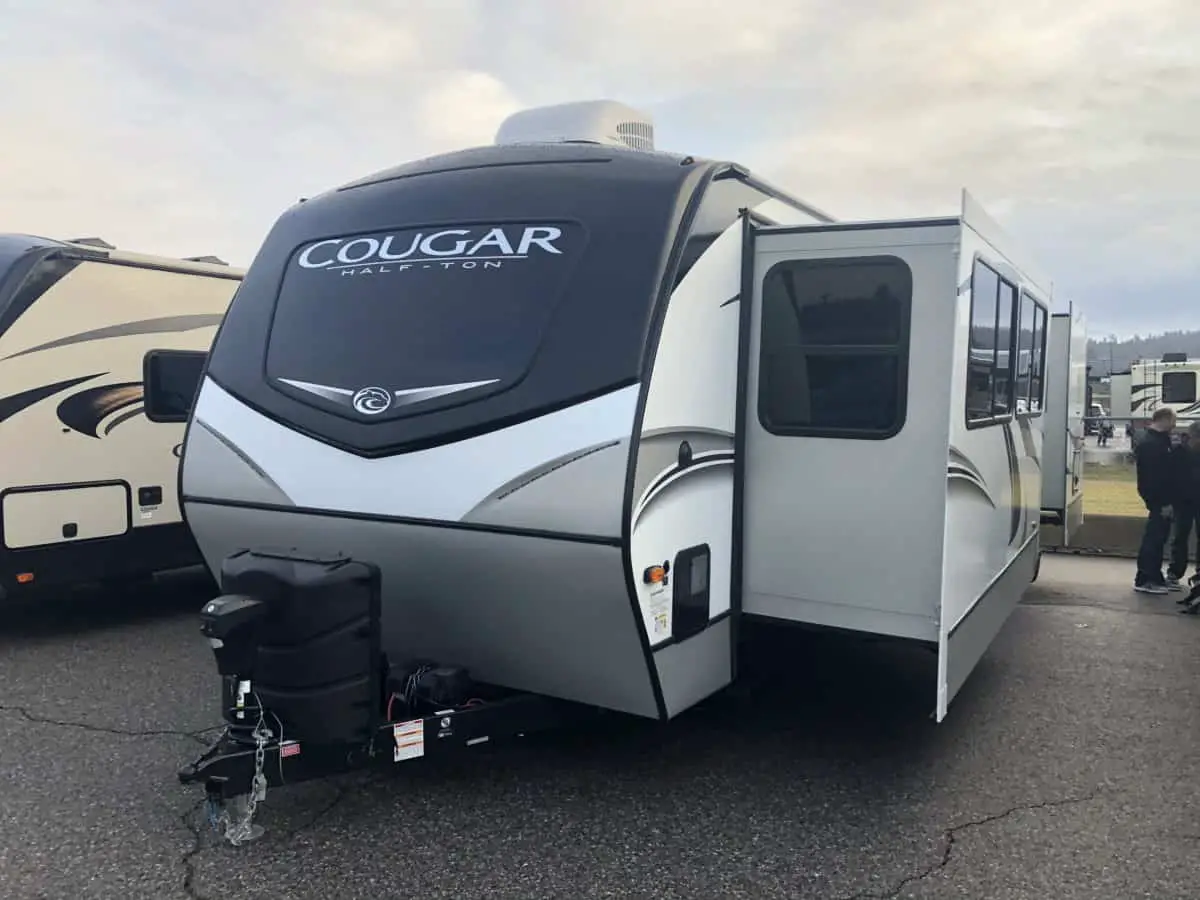

How Much Does it Cost to Own a Travel Trailer?
We lusted over the life of being a travel trailer owner prior to owning one, and still get giddy with the thought of taking it out. It is currently December and I just went to our storage space to check on the RV and instantly got the feeling back of how fun it was to go to Glacier National Park last summer or stay at our favorite small town in November.
As I left, I paid our monthly storage bill and went on my way and started adding up all of the costs in relation to such a good experience and decided to share them here.
How much does it cost to own a travel trailer? The monthly cost to own a travel trailer can range from about $20 per month for registration and insurance if you own it and can park it for free to upwards of $400+ if you are making payments and do not have somewhere to store it on your property.
Typically, a travel trailer will cost a user more than they initially thought when you factor in the additional tow vehicle expenses such as additional wear and tear, gasoline, and upgraded hitches or towing accessories.
If you buy a new camper, your payment would be factored into the costs of ownership as well as any accessories you buy or the dealer installs.
During the course of our ownership, we have purchased several accessories such as a generator, sewer pipe kit, upgraded shower head, bbq, additional kitchen accessories , and many more items just for our trailer.
Thinking of buying a used RV, travel trailer, or camper? This article will guide you how to determine private party RV value and what you should be paying.
It is easy to have your costs of ownership cost you several thousand over the first year you buy your trailer, but you should expect costs to decrease as you obtain the needed accessories.
Lastly, storage is a factor in the cost to own a travel trailer . If you store your trailer on your property it can be free, but storage can range from $20 per month to about $90 per month for outdoor storage and $300+ per month for indoor covered storage.
Despite the costs involved, we have thought of our trailer as an upgrade to our life. Having a trailer allows our family to spend time together in the outdoors away from cell service and civilization. Being able to take that fishing trip and stay at the fishing hot spot and not having to get up at 4AM to drive two hours is a wonderful feeling.
We have met so many interesting people along the way on our travels and would not change our experience or the world.
The Complete Cost Guide to RV Ownership
There can be several types of costs involved with RV ownership, these costs can be detailed as:
- Purchase Costs
- Storage Costs
- Insurance and Registration Costs
- Maintenance and Repairs
- Travel Expenses
- Tow Vehicle Expenses
Upgrades and Other Expenses
Travel trailer purchase costs.
Travel trailers can vary wildly on their costs and typically range from $13,000 up to $55,000+. If you pay cash for your trailer, that is great, and for this example, you can amortize the costs over the years you think you will own the RV or omit the cost completely.
If you finance your RV, this monthly cost would be included in your costs of ownership. For the 5 examples below, we will use a down payment of $5,000 an interest rate of 4% and a loan length of 7 years. We assume tax, title, and license is included in the total cost. Each of these items can vary greatly per situation.
- Total RV Cost: $13,000 = Monthly cost of: $109.35
- Total RV Cost: $25,000 = Monthly cost of: $273.38
- Total RV Cost: $32,000 = Monthly cost of: $369.06
- Total RV Cost: $40,000 = Monthly cost of: $478.41
- Total RV Cost: $55,000 = Monthly cost of: $683.44
The numbers above can shift wildly depending on the RV cost, the amount for down payment, interest rate, as well as loan term. These factors along with the RV price can all be shifted to get a camper within your budget. Learn more about how much the average monthly payment on an RV is.
If you are interested in learning more about financing a RV, Bankrate has a great article on how to get a RV loan.
Buying a used RV can save you loads of money. Here is our article detailing step by step how to value a private party RV.
RV Storage Costs
The cost to store your RV can vary depending on where you are storing it. If you have outdoor storage, you may want to factor in the cost of wheel covers and an RV cover. These two items can cost from $200-500+ depending on the size of your RV.
The monthly storage costs in our area range from $35 per month to $70 per month for up to a 25’ trailer. If you have a longer trailer, prices typically go up to $50-$90 per month. If you buy a brand new motor home or fifth wheel, you may want to look into indoor or covered storage. I found that indoor storage for a 40’ RV was around $250-$300 per month in our area.
Obviously these numbers can vary depending on the supply and demand of storage where you live, or if you or a friend may have a large shop or plot of land where you can park for free.
Camper Insurance and Registration Costs
Adding our travel trailer to our auto insurance policy did not add as much as I would have thought, the total annual premium increased about $187 including the addition to our umbrella policy. This also included roadside assistance and towing for 50+ miles.
Insurance can vary depending on how many items are on your policy, the value of your RV, as well as the coverage you select. If you have a 42’ diesel pusher, I would expect insurance to be a lot larger than what we pay for a 20’ travel trailer.
The costs to register our travel trailer for the first year were $107. This included a $20 one time fee for a new license plate that will not have to be paid the following years.
Travel Trailer Maintenance and Repair Costs
As we purchased our trailer new, we have not had to pay much for maintenance or repairs to date. There are many items on the trailer which need service annually such as wheel bearings, tire pressure, winterization, summarization, roof repair, window reseal, interior repairs from being towed, etc.
When you tow your trailer, it is basically having an earthquake inside every trip. You can imagine what that does to all the little items, seals, and electronics so you cannot expect them to last forever. Luckily, if you are handy, you can make many of these small repairs yourself.
As I like to call myself handy, I completed the first winterization myself. I had to buy a few seal sprays, lubricants, attachments, and RV antifreeze, but the total cost to winterize for the first year was under $50. In the following years, it will only cost about 3 gallons of RV antifreeze or about $9. My local dealer charges $179 for winterization and $99 for summarization. These costs would vary depending on if you have an outdoor shower, or items such as an on board generator.
I plan to save about $50 per month for travel trailer repairs, as I can do many maintenance items or repairs myself. I will let my bank of $50 per month grow as when I have to replace the tires they can cost $500-600 for a set of nice trailer tires.
Roof sealant and small repairs should not cost over $100 per year on a newer trailer. Once your roof starts to get older, you may want to have some money saved for a replacement as roof replacements can cost over $1,000.
RV Travel Expenses
When factoring your travel expenses, where you camp will dictate your costs. When we stay at a local campground , the cost is $15 per night with no hookups. Typically we only stay for 1-2 nights so not having hookups does not make a huge deal.
When we stay in national parks around our area, they cost $23 per night. These typically have no hookups as we stay in the middle of nowhere. At a local state park on a lake near us, we pay $30-35 per night with full hookups. I will tell you full hookups are a dream come true when you get to use them for the first time.
We have paid $107 for a week of camping on Flathead Lake in MT with full hookups, which was a very good deal. Last year, we looked at driving the trailer to the Oregon Coast and wanted to stay at a very nice campground on the beach. Our thoughts were changed when we found out the price was $75 per night. We were able to get a very nice hotel for about $130 per night and figured it was a wash as the gas prices to get over to Oregon would make up the difference.
All in all, a campground can range from free if you are boondocking, to an average of about $30 per night.
Travel Trailer Tow Vehicle Expenses
Don’t forget your tow vehicle costs when factoring your costs of ownership. Your gas bill alone will be the majority of these. We get about 10 mpg when towing down from about 16 with normal driving which is not too bad.
Pro Tip: If you are buying a new vehicle, spring the extra money for the larger gas tank. You will thank me when you fill up less often and do not have to navigate a trailer in tight gas stations.
Your tow vehicle will go through tires faster, wear suspension parts, need more frequent oil changes, as well as need more general care if you are towing frequently. These costs can vary depending on the age and condition of your towing rig.
If you need a weight-distribution hitch or sway control, make sure to include that cost in your costs of ownership. These can range from $250-600 on average all the way up to $1500 for the best of the best.
When you have a trailer sitting at your disposal, you cannot help but upgrade it or buy items for it. Just off the start, you will need some essentials such as:
- Sewer Hose Kit
- Water Hose, filter, and attachments
- Leveling Blocks
- Wheel Chocks
- Surge Protector
- Power Cable and Adapters
Along with the essentials, you will find yourself bitten with the big. Chances are, you will move on to lust over other items such as:
- Solar Setup
- Camping Mat
- Camping Outdoor Furniture
The list goes on and on. The sky is the limit when you think of outfitting your trailer, or just get the basics and enjoy your time in the outdoors. Over time, it is fun to buy small upgrades or items here and there to make your camping just that much better and give you that extra something to look forward to. If these costs scare you, learn how to reduce them or even have them paid for.
Take the time to go through each category above and use these examples to figure what your approximate monthly cost of ownership would be.
Related questions
How much does it cost to store a travel trailer?
Outdoor travel trailer storage can cost from $35-$90 depending on the length of your vehicle and location. Indoor can cost $200-$300 per month also depending on the length and location.
Do I need insurance for a travel trailer?
Yes, having insurance on your travel trailer will not only be a benefit to you, but will be a benefit to others shall something happen when you are on the road. Insurance can benefit you if your trailer is stolen or damaged. Insurance will help others shall your trailer do damage to other vehicles or property. For example, it was involved in an accident or came unhitched.
Do I have to register a travel trailer?
Yes, if you are towing your travel trailer on public roads, you will have to license and register it. If you are parking it at a property using it as a cabin of sort, and will not be moving it, you do not need to license or register the trailer. Typically the costs to license are very small and should be kept up. As always, check with your local DMV to find out the answer that will best suit your needs.
Be the first to be notified about FREE tips, hints, coupon codes, and email-exclusive information. All for FREE!
Related Posts:
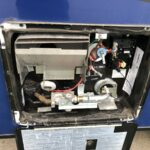
Similar Posts
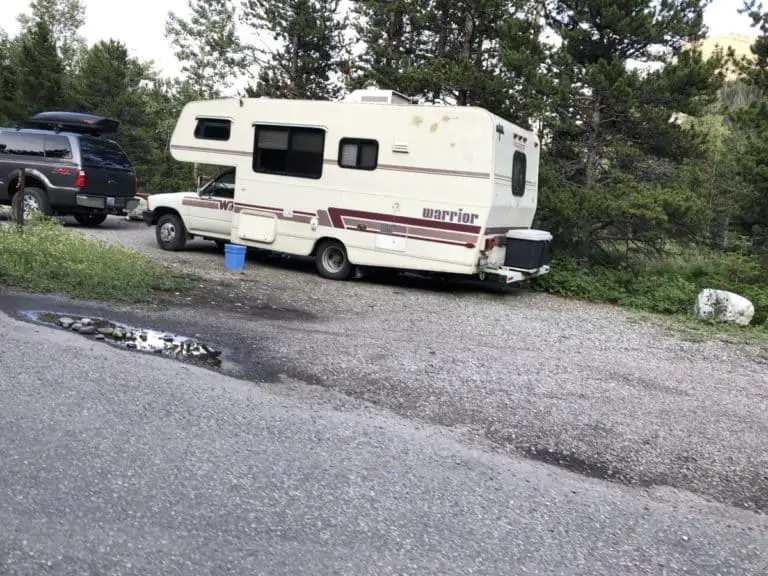
7 Ways to Get Rid of an Old RV or Motorhome
So you’ve decided the time has come to get rid of your old RV or Motorhome. Whether you’ve decided to upgrade to a new model or you simply no longer need your vehicle, you’ll want to consider your options for the best ways to dispose of it. No one wants an unused RV or motorhome…
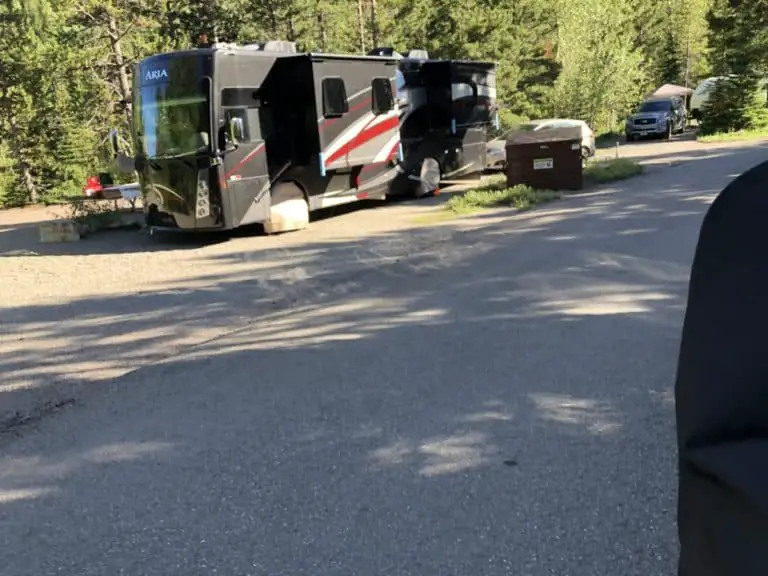
How much can an RV tow? With examples
Knowing your RV’s towing capacity is essential to getting the most out of your vehicle and your outdoor adventure. What and how you tow greatly depends on the type of RV that you own. How much can an RV tow? In general, a Class A RV can tow up to 15,000 pounds, a Class B…
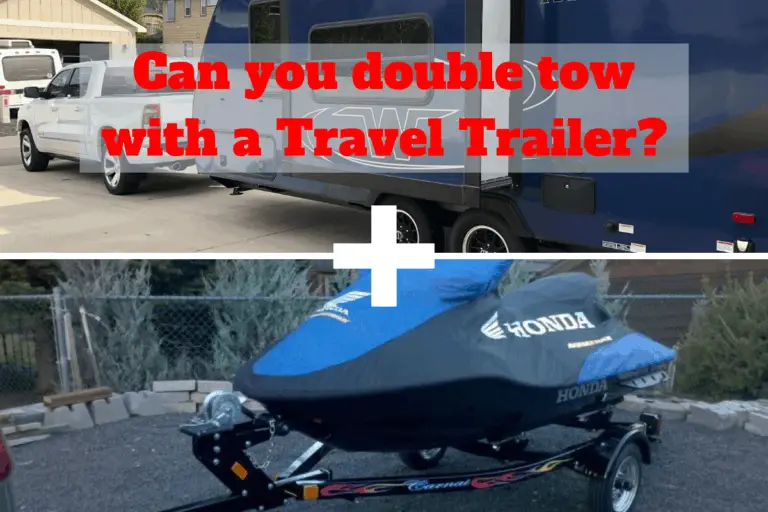
Can you double tow with a Travel Trailer?
Pulling a single travel trailer is typically the way that most owners will use their trailer when traveling. However, there are times when pulling just one accessory behind a vehicle is not going to do for the adventure or camping trip that one has in mind. Many travel trailer owners will want to be able…
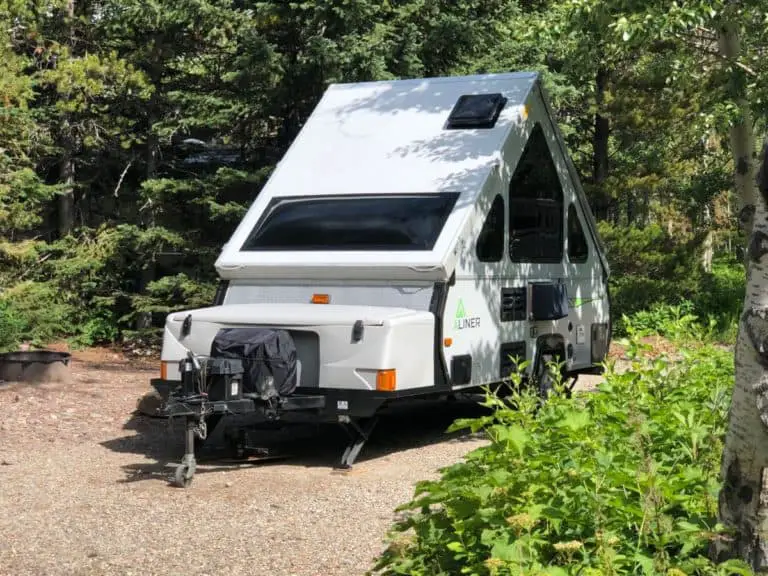
19 Reasons not to buy a Popup Tent Trailer
Tent or Pop Up trailers have their positives and fill a void in the market by providing people a lightweight trailer to tow and provide more amenities than tent camping, but they also come with many negatives. We have compiled all of the reasons not to buy a tent trailer below. Hot in the Summer…
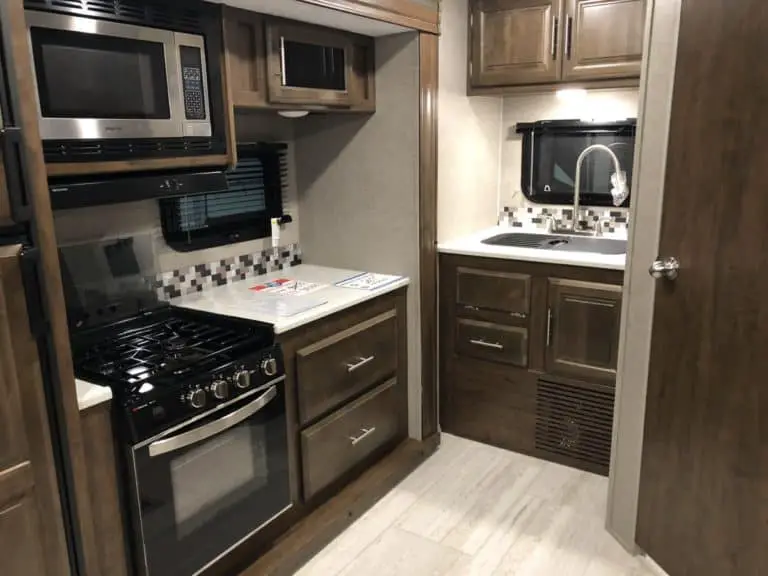
How to Use an RV Oven? Plus Tips for Cooking in an RV Oven
One of the many reasons that so many people are drawn to travel trailers and RV’s as a form of camping is the household amenities that you can have while still enjoying nature right outside your front door. One of the items that many trailers come with is a working oven and RV stove so…
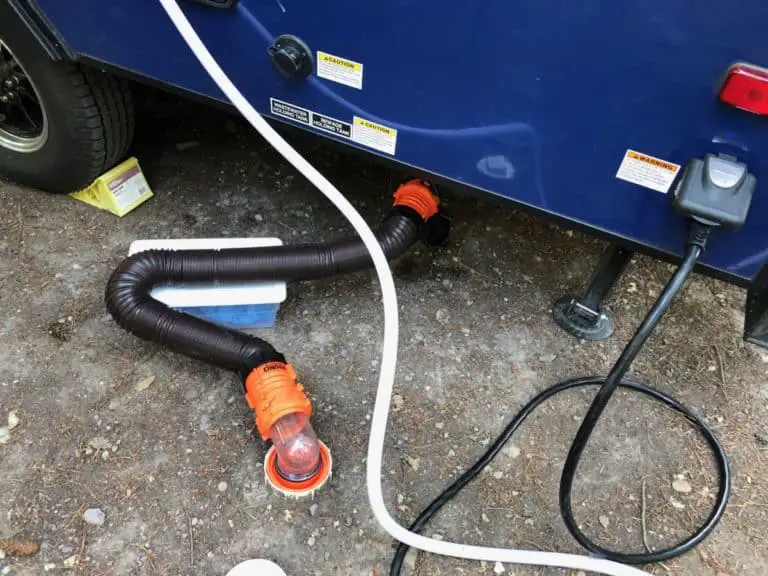
3 Easy Ways to Clean a Black Water Tank
Everything You Need to Know About Your Black Water Tank Travel trailer owners know that this form of camping can bring lots of wonderful experiences and adventures. However, there are parts to owning an RV that can be not so alluring. While it might not be the most glamorous part of owning a trailer, owners…
Join our Newsletter to stay up to date on the latest RV topics and receive our FREE RV Inspection Cheat Sheet Today. Use this tool to inspect new or used campers you are looking at purchasing.
No thanks, I’m not interested!

How Much Does a Travel Trailer Cost? (Buy, Rent & Own)
Read this page without ads! Go Ad-Free
Whether you’re looking to buy or rent a travel trailer, the cost will likely play an important role.
So, how much does a travel trailer cost to buy and rent ? And what’s the true cost of ownership if you decide to buy?
Let’s break down the average cost to buy a new and used travel trailer, how much a trailer rental typically costs, plus cover the main (and hidden) costs of RV ownership.
How Much Does a Travel Trailer Cost?
A travel trailer typically costs between $10,000 for a used trailer to around $75,000 for a brand new model. The price varies significantly depending on the brand and model of the trailer, its amenities, whether it’s new or used, the time of year you buy it, etc.
Of course, those are the average price ranges. You can currently find models as low as $4,999 to over $160,000! Here’s a snapshot of the current price ranges (lowest and highest) of travel trailers on CampingWorld.com.
The 2007 Coachmen Spirit of America can be found for as low as $4,999, while the 2021 Airstream Classic is priced at $164,999.
Plus, there’s the option to rent, which might save you a lot in up-front buying costs and the cost of ownership if you only plan on using the trailer once or twice a year.
To get you a more accurate cost for all the different types of RVs out there, we separate them out by new vs. used and then by type below.
And if you’re intent on buying a travel trailer, don’t skip the cost of ownership section below, as it will help paint a more accurate picture of how much that RV will cost for as long as you own it.
Let’s start with new travel trailers.
How Much Is a New Travel Trailer?
On average, a new travel trailer will cost between $20,000 and $75,000. As mentioned above, some outliers cost over $160,000 (the Airstream Classic, for example), but the majority are much cheaper.
So, how does a new travel trailer compare to the other types of RVs?
Related : How Much Does an RV Cost?
Average RV Cost by Type
Important : The figures in this table represent averages. You’ll find some models well outside these average prices. As mentioned above, the Airstream Classic runs around $165,000! But, for your typical RV, you can expect it to fall within the ranges above.
Now, let’s look at how much a used travel trailer costs.
How Much Does a Used Travel Trailer Cost?
On average, you can find used travel trailers between $10,000 and $50,000. Again, there are outliers, some used luxury travel trailers can cost over $100,000, but the majority are much cheaper.
The type of used RV and the year are the two biggest factors that drive cost. Let’s look at the average prices for the different types of RVs to see how they compare.
Average Used RV Cost by Type
Used prices for RVs are all over the board, as so many factors can influence the price.
Tip : If you’re interested in purchasing a used RV, first identify the type of RV that fits your needs and search for used models near you to get a good idea of how much you’ll likely spend. Once you’ve found a few models in your budget, check out our guide on what to look for when buying a used RV .
How Much Does a Travel Trailer Cost to Rent?
Renting a travel trailer is a viable option whether you want to test out the RV lifestyle before buying or want all the thrills of camping in a trailer without the maintenance and annual insurance costs.
So, how much does travel trailer rental cost on average?
Remember that these are average prices and will vary depending on the amenities, size, time of year, length of rental, location, etc.
Tip : Check out our guide titled How Much Does It Cost to Rent an RV for a complete breakdown of the costs plus tips to get the most out of your rental!
To get a true cost of the entire RV rental vacation, you’ll need to factor in:
- Rental insurance : This may be included in the rental cost if you use a reputable RV rental company like Outdoorsy . But, for extra damage or trip insurance, you’ll have to pay out of pocket.
- Prep fee : Many RV owners will charge a prep fee to “ready” the trailer for your trip.
- Delivery fee : In many cases, you can optionally have the trailer delivered to you for a fee.
- Price-per-mile : Some rental companies or RV owners charge per mile you travel on top of the daily rental fee.
- Fuel expense : You will need to pay for the gas in your tow vehicle used during the trip. Depending on the cost per gallon of gas and the miles traveled, this expense can add up!
- Campground fees : Campgrounds can range from $15 to over $100 per night, depending on their location and amenities. If you’re looking to save money, you can always dry camp, as well, which is typically free (you’ll just have zero amenities).
It’s a good idea to plan for these expenses ahead of time to have a better understanding of the total cost of the trip before securing your rental.
Cost of Travel Trailer Ownership
When you buy a travel trailer, unfortunately, the expenses don’t stop there. In fact, there’s something called the cost of RV ownership, which can add up to quite a bit.
So, what is the true cost of owning a travel trailer?
If you’ve owned an RV before, then you probably have a pretty good idea of all the extra expenses that come with ownership.
But, if you’re looking to buy your first recreational vehicle, here is a list of the potential costs of owning an RV that you’ll want to plan for.
Travel Trailer Maintenance & Repairs
Like any vehicle, an RV requires regular maintenance. But, an RV is also a house on wheels, so the amount of maintenance grows exponentially.
Some typical maintenance tasks can include:
- Tire replacement
- Battery testing and replacement
- Propane tank refill/replacement
- Filter cleaning/replacement
- Regular washing and waxing of the exterior
- Replace seals
- Sanitize the water tanks
- And so on
Plus, don’t forget about repairs. If something breaks, and things will break, you have to pay to either get it fixed or for the part and fix it yourself.
For example, water heaters will eventually go out and need to be replaced, window screens tear, tail lights burn out, etc.
So, is it expensive to maintain a travel trailer?
On average, RVers typically spend between $500 to $2000 per year on maintenance. But, if something major goes wrong, you can expect that number to jump. Warranties can help cover some costs, and getting a professional inspection performed on your RV prior to purchase can help protect you and your wallet.
RV Insurance
Similar to your home or auto, insurance to protect you and your RV is another recurring cost you’ll want to consider.
According to Progressive, the average annual RV insurance policy will cost $502 for a travel trailer and $848 for a motorhome in 2020. Liability-only policies started at $125 per year.
That said, the actual cost for an insurance policy will vary based on the type of RV, location, features, driving experience, and so on.
Fuel costs will vary significantly depending on your tow vehicle’s MPG, distance traveled, cost per gallon of gas, etc.
Tip : Use a fuel calculator to estimate fuel costs before the trip. And use apps like Gas Buddy to find the cheapest gas near you.
If you have a fairly economical tow vehicle and tow a small travel trailer, fuel costs will be considerably less.
Hidden Costs of Owning a Travel Trailer
Along with the above costs, there are what some would consider “hidden” costs to owning a camper trailer. Or costs that many tend to overlook (but can add up quickly).
- Park Fees : The cost to reserve a spot at an RV park can range from $15 to over $100 per night, depending on their location and amenities. You can help offset these costs by splitting your time at free boondocking locations.
- Storage Fees : You’ll need a place to store your RV when not used. Some have the luxury of being able to store their RV on their own property, but many do not. Expect to pay between $50 to $250 per month to store your RV.
- Registration Fees : Depending on where you live, you’ll likely have yearly registration fees. For example, in Iowa, a Class-A recreational vehicle that costs over $80,000 has a $400 per year registration fee.
- Memberships : While RV memberships like Thousand Trails and Passport America are designed to save you money, they still cost to be a part of.
- Supplies : Similar to a home, you’ll need to stock your RV with supplies, including kitchen utensils, food, laundry and cleaning supplies, etc.
- Upgrades : Upgrade costs will certainly vary, but if you want a better wifi signal or a satellite dish, for example, these will incur additional costs.
- Depreciation : While not a direct cost, your RV will lose value, especially if you buy new. A new travel trailer typically loses 40% of its value in the first five years! One way to avoid that initial major drop in value is to buy used. Your used RV will still depreciate over time, but it won’t be as drastic as the first few years.
Now that you understand the costs of buying and owning an RV, what’s next? Check out our guide on the pros and cons of owning an RV to find out if owning one is cost-effective and if it’s truly right for you!
Plus, check out our guide on what to look for when buying a used travel trailer , complete with a downloadable checklist!
Leave a Comment Cancel reply
We highly encourage discussion on our posts and in our RV Community Forums . The most helpful comments are those that you can learn from or that help others out. Please refrain from insults, complaints, or promotional material. See our community guidelines for more information.
Save my name and email for the next time I comment.
Notify me of follow-up comments via e-mail.

The Real Cost of RV Ownership. Here’s What We Spent.
- by Marc Bennett
- Updated: November 10, 2023
- 25 Comments
This post may contain affiliate links .
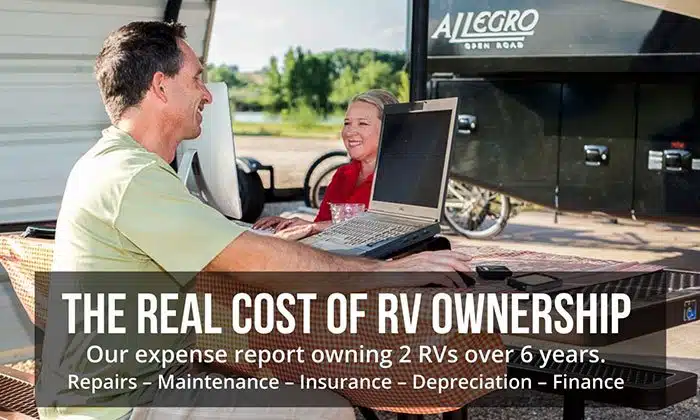
After owning two RVs and full-time RVing for six years, what have been our REAL RV costs? This is Part 3 of our ‘6 Years of RVing’ recap series, where we share what our RVs have cost us in RV repairs, maintenance, depreciation, etc, over the years.
We did the math on both of our motorhomes – a 2012 gas-powered motorhome and a 1999 diesel pusher motorhome – to see how it all added up. We think you’ll find the data very enlightening – and hopefully helpful in your RV decision-making.
It’s not always easy to find accurate data on the real cost of RV ownership.
A list of possible RV costs and expenses to be aware of is one thing. But actual, hard data is another. For example, our report is based on our six years of real-world RV ownership, documenting our expenses and generating a total and average monthly RV cost.
We also provide context, as RV-related expenses can (and will) vary, depending on your unique situation and choices. And not all of our decisions will be the same as yours.
Full-time RV life vs traditional life
Remember that as full-time RVers, many of our RV-related expenses replaced what we might have otherwise spent on our stick and brick home. However, if you plan to own an RV in addition to owning or renting a regular home, keep in mind that many of your costs will double up, naturally making RVing more expensive. But as full-timers, many of our prior home ownership-related expenses were replaced by our RV life expenses.
We embraced the RV life from day one in a Class A motorhome, knowing this is typically a more expensive option than buying a trailer. Have there been some costly surprises? Yes! However, we have no regrets, and we take responsibility for ALL of the choices we make in our RVing journey. So should you.
Full-time RV life vs. Part-time RV life costs
We also have an even more recent blog post comparing all of our full-time RVing costs against our Part-time RVing costs now that we have a home base. Check out that blog post here .
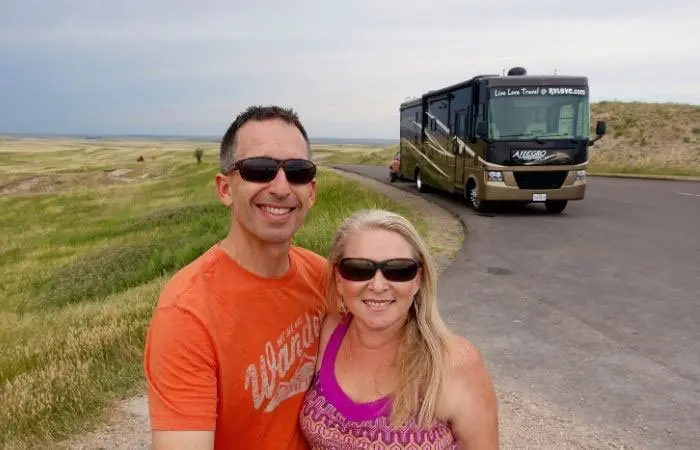
Disclaimer:
Before we begin, know that every RV – and every RVer is different. So our RV costs and expenses may be similar or very different to what yours is or might be. There is no right or wrong – just different scenarios and different related costs, which may or may not be typical. This is simply our personal experience. We share this information as a helpful guide. But it should not be considered a hard and fast rule of what to expect. You should always do your research. And do not overcommit yourself financially when buying an RV – generally a depreciating asset. Go in with your eyes wide open so you are prepared.
We hope this article provides you with an excellent perspective and understanding. Therefore, helping to guide your own RV purchase and ownership decisions.
Read it in detail to the end to get the complete picture because it is NEVER just about the numbers. It’s not black and white. There are many variables to consider, even in our situation shared here.
Lastly, this post covers the RV costs of our actual RVs and related expenses to keep them safe, operational, and well-maintained. We don’t skimp when it comes to safety.
What is NOT included in this report?
We do NOT include the cost of campgrounds, camping memberships, or fuel and gas here, as we consider those RV travel expenses. But, you can read our other posts in our 6 Year Recap series for that detail. In Part 1, we share our comprehensive review of our Thousand Trails camping membership – is it worth it? In Part 2 we share our total RV camping expenses – campgrounds and boondocking – over 6 years . Here in Part 3, we cover RV ownership expenses. And in Part 4, we cover mileage and fuel.
There’s a LOT of information and detail in this article, so we have broken it up into several parts. We recommend you read it all the way through to get the full picture.
Grab yourself a beverage and settle in! You are about to learn a TON!
Quick Links
- RV Costs of Ownership – Overview
- Purchase Price for each RV
- RV Factory Warranty / RV Extended Warranty
- Financing & Interest
- RV Costs for Insurance
- RV Repairs and Maintenance
- Year by Year RV Repair Expenses
- Total RV Repair and Maintenance Costs
- RV Depreciation
- Total RV Costs Of Ownership Over 6 Years
- Key Takeouts
Perspective and Summary
- Continue Your RV Education
- Other Costs of RV Life
Recommended Resources
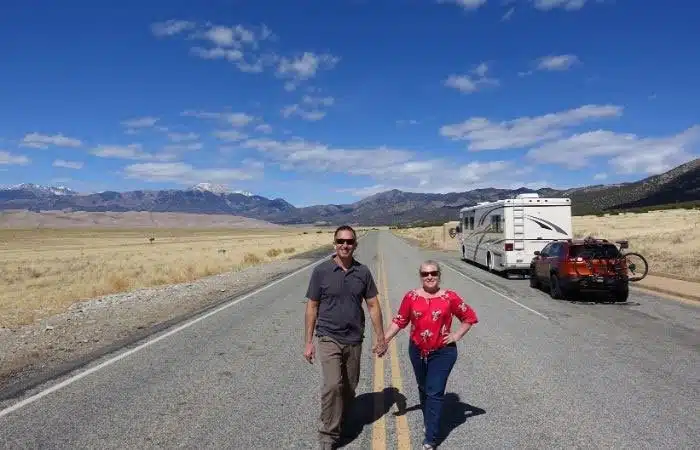
The Real RV Costs of Ownership
Firstly, it is important to remember that RV ownership costs can vary widely, depending on numerous factors. These include, but are not limited to:
- Type of RV (motorhome vs. towable; diesel vs. gas; brand; model etc.)
- Buying new vs used
- Purchase price (and tax)
- Financing (or not)
- Market conditions (supply vs demand)
- Condition of RV
- Standard and frequency of your RV maintenance and care
- RV Repairs – and whether DIY or take to a shop
- RV Warranties (manufacturer and/or RV extended warranty)
- Your RV use and mileage
Secondly, the variety of RV choices is enormous. Some RVs are more straightforward, while others are more complex and thus more expensive. Some people will certainly spend far less than we have, and others will unquestionably spend far more.
What type of RV(s) do we travel in?
To offer some perspective, over the past six years, with both of our RVs, we have chosen to travel in Class A motorhomes towing a car. This combination generally tends to be a higher average cost than towing a trailer with a truck. But, we purchased both RVs used, which usually helps reduce the overall cost and depreciation.
Also, remember that Class A diesel motorhomes are more expensive than Class A gas motorhomes – purchase price, repairs, and maintenance – as they are generally higher quality with more expensive parts and components.
Looking to compare some other types of RV travel?
This blog post and the others in our six-year recap series focus on our full-time RV travel costs in Class A motorhomes. But we have another detailed blog post that compares our full-time and part-time RV costs. Our part-time RVs are a smaller Class C motorhome and a Casita camper trailer towed behind the same Jeep we used to tow behind our Class A motorhomes. Check out the detailed comparison of our full-time and part-time RVs here .

Our first RV – a 2012 Tiffin Allegro Open Road Class A gas motorhome. We towed a MINI.
RV Purchase Price – What did we Pay for our RVs?
Here’s what we bought and what we paid for them:
RV #1 – 2012 Tiffin Gas Allegro Open Road Class A Gas Motorhome
Our first RV (known as Rocky) was a 36’ gas-powered motorhome, bunkhouse model, with four slides. We bought the Tiffin from a private seller in Ohio in May 2014. It was just two years old, with 23,000 miles. All up, we paid about $100,000 ($93,000 plus our Colorado state taxes). According to NADA Guides , the MSRP was $129,500 (ex-tax). We were the 3rd owners.
RV #2 – 1999 Country Coach Intrigue
Our second RV (AKA CC) was an older but high-quality 40’ diesel pusher motorhome with one slide. We purchased the Country Coach from an RV dealer in Tucson, AZ, in March 2018 at the bottom of the depreciation curve for just $25,000 plus Texas sales tax (we changed domicile from Colorado to Texas in 2015). So, around $26,500 total.
Although it was 19 years old with 170K miles (we were told but unable to verify as the odometer was broken). We were not too concerned as Country Coach has a reputation for making some of the finest motorhomes ever built, and the quality is still superior to many newer RVs today.
According to NADA Guides, t he Country Coach sold new for around $234K (about $360K equivalent today). We believe we were the sixth owners of this coach. We intended to do a complete RV renovation and truly make it our own. Being experienced RVers who saw how these things are built at the factories , we weren’t afraid to tackle an RV remodel and DIY repairs. I’ve done construction and mechanical work and figured it would be a good learning experience.
What about our TOAD vehicles?
During this time, we have also owned two vehicles for towing behind our motorhome/s. A 2006 Mini Cooper Convertible is what we started out with, towed on a tow dolly . We switched it in October 2017 for a 2015 Jeep Cherokee Trailhawk , which we flat tow 4-down . To clarify, we won’t include these costs in this article as we are focusing on the costs of RV ownership. Towing a vehicle is optional for motorhomes.
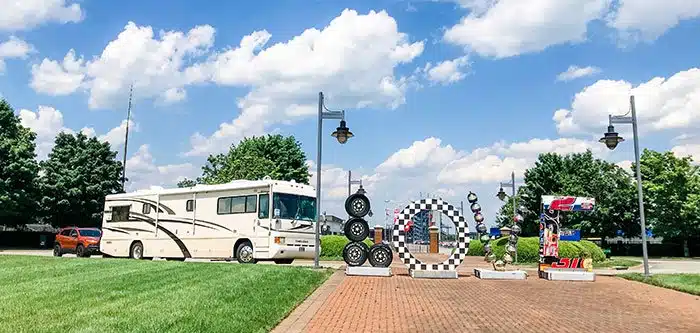
Our 2nd RV –1999 Country Coach Intrigue Class A diesel motorhome. We tow a Jeep.
Did we have any Factory or RV Extended Warranties?
Having your RV repair costs – or at least some of them – covered by a warranty is one way to help you contain RV repair expenses. Here’s what we have had over the years.
RV #1 – 2012 Tiffin Open Road
Although this 2-year-old coach did not have a factory warranty (most are only for a year), the structure/body was still covered under Tiffin’s 5-year structural warranty.
We were lucky that the seller included an exclusionary RV extended warranty in our purchase, with the remaining policy valid until March 2018. This was worth several thousand dollars. It cost just $75 to transfer the policy into our names.
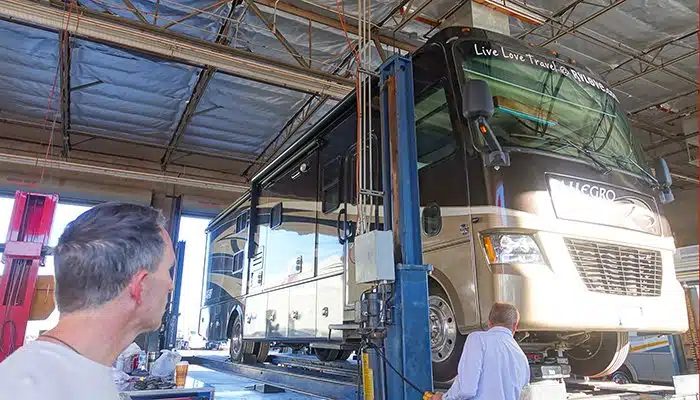
King Pin repair underway on our Tiffin, this RV cost was covered under our RV extended warranty
RV #2 – 1999 Country Coach
The Country Coach was sold ‘as is’ with NO warranties from the RV dealer because we haggled hard on price (originally $50K, sale sticker was $35K). We also had a professional RV inspection done (approx. $450). Consequently, we knew some of the issues before buying.
We looked into getting an RV extended warranty (a lso known as an RV extended service contract). Even though our CC was 19 years old at the time, it was actually not the coach age but the 100,000+ mileage that made this motorhome ineligible for warranty coverage. We decided to ‘self-insure’ and bought the coach anyway, figuring our financial exposure was fairly limited as we bought it so cheaply and could DIY many repairs.
In short, had the coach mileage been only, say, 90,000, we would have been able to buy a 3-year RV extended warranty – with a $200 deductible – for just $7,500. (And as you will see, it would have been worth it.)
Related Articles and Links
- Article: Are RV Extended Warranties Worth it? How They Work, Pros & Cons
- Article: When to Buy an RV Warranty? How to Beat Price Increases? RV Eligibility
- Get a Quote on an RV Extended Warranty
- Article: Getting a Professional RV Inspection
- Find an RV Inspector Near You
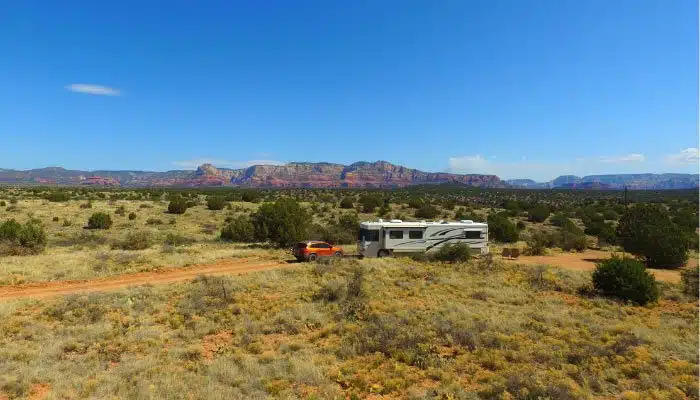
Boondocking in Sedona, Arizona
The Real RV Costs of Ownership – Financing and Interest
When we jumped into the RV lifestyle in 2014, even though we had sold our home, we chose not to pay cash for our RV. We wanted to invest our money elsewhere. Above all, our RV mortgage interest was a tax deduction anyway, as it was our ‘home on wheels.’
Finance and Interest on RV #1 – Tiffin
We financed our first RV – the Tiffin – at 4.39% over 20 years with a secured loan and payments of $569 a month. We paid that loan off when we sold the Tiffin a few years later (after 45 months of ownership). All up, we paid around $13,740 in interest during the time we owned the Tiffin. That averaged out at $305 per month.
Finance and Interest on RV #2 – Country Coach
We also financed our second RV – the Country Coach – at 5.44% over seven years with an unsecured loan and payments of $501 per month. During our 27 months of ownership, we have paid $3,784 in interest on the Country Coach. That averages out at $140 per month.
We both have excellent credit, so our interest rates were near the lowest available when taking out our loans.
Keep in mind financing costs will depend on several factors, i ncluding but not limited to:
- The type of lender
- Prevailing market interest rates
- The RV you buy (e.g., age, price)
- The loan term
- Your credit score
Looking back, our total interest expense over the six years was about $17,524, with average monthly interest costs of $243. Most of that was for the financing of our first, more expensive motorhome.

RV Costs For Insurance
Insurance is another RV cost that will vary widely, depending on the type of RV and vehicle you buy. Your insurance cost – regardless of the insurance company – will depend on the type and value of the RV, type of coverage, state and city you insure the vehicle in, your driving record, credit score, insurance claim record, and no doubt many other factors we aren’t even aware of. It’s best to have an insurance broker look into the options available to you and recommend at least a couple of options and quotes based on your situation.
We had a full-time RV insurance policy with no prior insurance claims, plus excellent credit scores and driving records. We were insured in Colorado for our first eight months, but this switched to Texas when we changed our domicile in early 2015.
Here is what we paid in insurance:
RV #1 – 2012 Tiffin Open Road. The annual insurance premium on our Tiffin was around $1,200 per year. All up, during our 45 months of ownership, we paid $4,700 in insurance for the Tiffin, an average of $104 per month.
RV #2 – 1999 Country Coach. The annual insurance premium on our Country Coach was around $1,075 per year. All up, during the 27 months to June 2020, we have paid $2,298 in insurance for the Country Coach, an average of $85 per month.
Over six years, we have paid a total of $6,998 in RV insurance, averaging $97 /month.

RV Costs of Repairs and Maintenance
All RVs – new or old – cost money to repair and maintain to keep them in good running order. We always knew the RV repair and maintenance would be more on our older coach – that’s part of the trade-off for buying it so inexpensively and not anticipating much (if any) depreciation.
So let’s take a look at what we spent on RV repair and maintenance before drilling down into the detail, so you can see just how and where these expenses add up.
RV #1 – 2012 Tiffin Open Road Class A Gas
Over the 45 months we owned our first and much newer motorhome – the Tiffin – the total RV costs for repair and maintenance expenses came to $17,981 from May 2014 to March 2018. But we didn’t have to pay for all of that ourselves. Our RV extended warranty covered $5,721 of the eligible RV repair costs.
However, some RV costs of repairs were NOT covered by our warranty, plus we also had to pay a $500 warranty deductible each time we took the RV in for a warranty repair (four times). And, of course, regular maintenance/wear and tear isn’t covered by a warranty either.
So, we ended up paying a total of $12,260 out of pocket – averaging $272 / month.
Two of the most expensive items – 6 new tires ($3,200) and Sumo Springs ($1,450) –added up to $4,650. And while neither of these was urgent, we opted to install them anyway, as safety is our high priority.
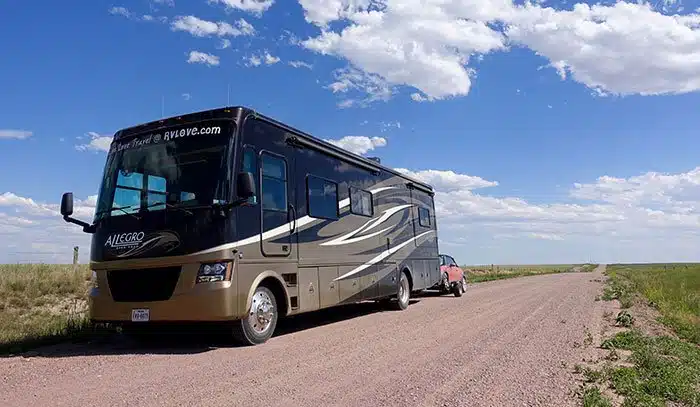
Summary of Tiffin RV Repair and Maintenance Costs
- Total RV Repairs & Maintenance: $17,981 over 45 months
- Less Amount Covered by RV Warranties: $5,721
- Total Out of Pocket Expenses: $12,260 over 45 months
- Monthly Average: $400 per month total (we paid, out of pocket, $272 / month)
It may also be worth noting that our RV extended warranty on the Tiffin was set to expire a couple of weeks after we sold the coach @ 59,000 miles.
We were definitely glad to have the warranty subsidize a significant amount of our RV costs for repairs. We know the previous owner also made a claim under warranty so that policy would have more than paid for itself. However, we found the $500 deductible to be relatively high and really added up ($2,000 over four repair claims). Next time we may opt for a lower deductible.
Related Content:
- 2 Years of RV Repair Expenses
- Our Tiffin RV Service and Repairs Experience in Red Bay, AL
- RV Extended Warranties – Worth it?
- Full-time vs Part-time Costs of RV Ownership
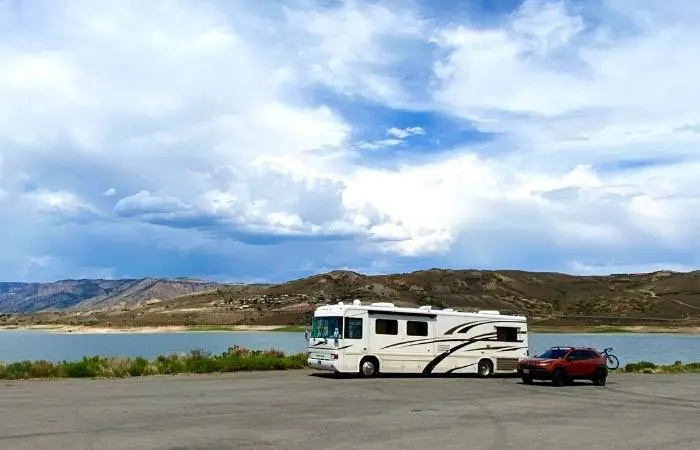
RV #2 – 1999 Country Coach Intrigue Class A Diesel Pusher
Being an older RV and based on the inspection, we knew the motorhome needed some repairs and maintenance right away – like new tires. We invested loads of time, energy, and money into getting this motorhome into MUCH better shape than when we bought it. Fortunately, I was able to do a lot of RV repairs, maintenance, and upgrades myself as DIY projects, which saved us many thousands of dollars in labor.
Remember, ALL RV repair and maintenance costs on our Country Coach were out of pocket.
We had no RV warranties (no RV factory or extended warranties). And we did NOT include optional RV upgrades like our RV makeover and off-grid system (we’ll share more on those below), as we consider most of those non-essential improvements (many aesthetic and comfort) – not actual necessary RV costs for repairs and maintenance.
From March 2018 – June 2020, we spent $23,268 in repairs and maintenance on our 1999 Country Coach motorhome. That’s $862 /month over 27 months so far. OUCH!
Spoiler Alert: note that almost a third of that is related to a single major repair in March 2020. Up until then, the numbers weren’t nearly as scary. More on that repair in a bit.
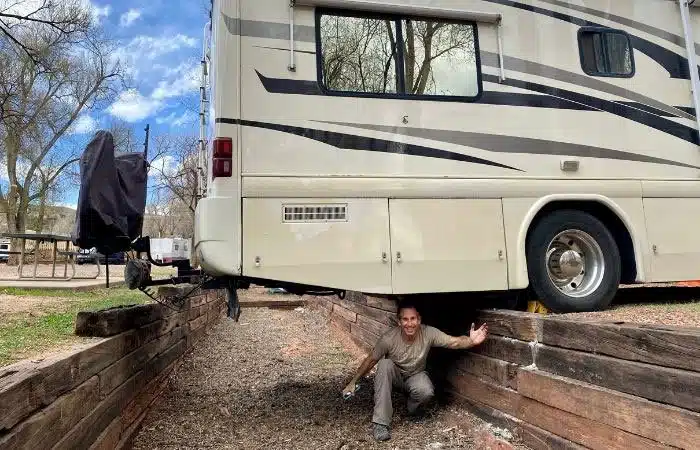
Marc repairing the air suspension linkage on our Country Coach (above and below)
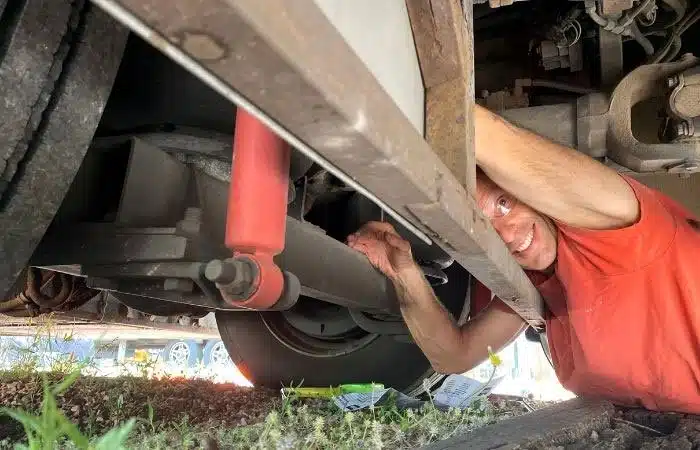
Summary of Country Coach RV Repair and Maintenance Costs
- Total RV costs for Repairs & Maintenance: $23,268
- Monthly Average: $862 / month over 27 months
Again, this amount of $23,268 is ONLY counting the required RV mechanical repairs and maintenance from March 2018 to June 2020. AND most of these were done DIY.
It is worth noting our average total monthly expense for RV repairs and maintenance on our second RV – the older 1999 Country Coach – was more than double that of our first, newer coach. And our average monthly out-of-pocket expenses were more than TRIPLE. But again, we paid a lot less for this coach – it was a quarter of the price of the Tiffin and a higher-end diesel motorhome!
Until 2020, the Country Coach repairs were actually not too bad. But we were hit with a big, unexpected $8,500 RV repair bill in March to replace the fuel pump, which spiked our RV repair costs significantly and may not have been necessary on a motorhome with lower miles. We later learned the actual mileage of the Country Coach was well over 200,000. Beware of any diesel RV that spends significant time in storage. The stagnant fuel can damage fuel system components.
What if we had qualified for an RV extended warranty?
In reviewing our first 2+ years of ownership of the Country Coach, we are confident a significant portion of the $23,268 in RV repairs would have qualified as RV warranty repairs exceeding the $7,500 we would have paid for a 3-year RV extended warranty. That is, had the coach qualified with under 100K miles. We would definitely place a higher priority on eligibility for an RV extended warranty for our next RV.
There is never any guarantee, when buying an RV, on what you will end up paying in repairs and maintenance.
There are way too many unknowns, and ultimately, it is all a bit of a gamble. That’s why we really wanted to limit our financial exposure upfront and reduce our risk by not spending as much on our second motorhome.
The Country Coach took much more time and effort to fix than I anticipated, but I put it all down to a great learning experience. Now I have much more confidence tackling DIY RV repair jobs and a much better understanding of the many things that can break! The education has been priceless.
If you’re interested in the details of our actual repairs and RV costs, year-by-year, on both of our RVs, take a look at the table below.
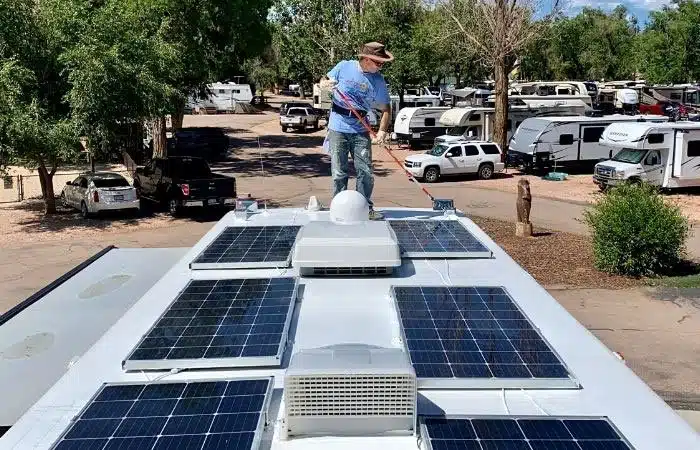
Marc cleans and preps, then reseals the roof on our Country Coach
RV Cost of Repairs – Year by Year Breakdown
Just click each tab to see the detail of RV cost of repairs, maintenance and expenses for each year.
Tiffin Repairs from June – December (we bought the RV in May 2014.)
Total Repair Costs: $3,081. We paid $1005. RV Warranty/ies covered $2,076.
- Propane leak test $40
- Replace broken main door handle $253
- Fix propane leak and replace hose, furnace $1,593 (extended warranty covered $1,076, we paid $517 deductible, misc, plus $50 for hotel = $567)
- Repair and repaint cracked fiberglass wall ($1,000, covered by Tiffin 5 year structural warranty)
- Oil change $125
- Plus a few small parts repaired DIY $20
Tiffin Repairs in 2015.
Total Repair & Maintenance Costs: $1784. We paid $1,085; RV extended warranty paid $699.
- Replace water heater and power window switch, inline valve and new wooden base for water heater etc $1,414 (extended warranty paid $699, we paid $715 for deductible and extras not covered)
- RV extended warranty deductible $500 + $215 = $715
- Annual service, chassis lube, generator service $270
- Miscellaneous broken parts etc $100
Tiffin Repairs in 2016.
Total Expenses: $8931.
$7,007 paid by us; $1924 paid by RV extended warranty.
- Replace tires with a full set of 6 Bridgestones @ $3,200
- Engine Service and oil cap $192
- Inspect faulty clearance lights $150 (not fixed, but Tiffin fixed with a fuse)
- Windshield Wiper Blades $39
- Install Sumo Springs technically upgrade, but necessary for safety $1,450
- Track bar repair , replace springs on leveling jacks $921 (extended warranty paid $421, we paid $500 deductible)
- Repair King pins, suspension and wheel alignment related to track bar issue $1,703 (part 2 of above repair – extended warranty covered $1,503, we paid $200 in freight charges, shop supplies)
- Replace chassis battery $142 (DIY)
- Replace 2 x house batteries and relay switch (tied to battery issue) $656
- Misc small items $50
- At Tiffin HQ: replace toilet, replace the water pump, new fuse for clearance lights, adjust basement latches, fix coach door shock absorber, small paint repair from 2014 fiberglass repair (covered under Tiffin 5 year structural warranty – estimated at $250). Total paid $428.
- More detail in this video at Tiffin Factory HQ
This did not include the cost of towing our coach to the repair shop when we had an electrical failure. Towing was covered by our roadside assistance.
Tiffin Repairs in 2017.
Total Expenses: $3,617. We paid $2,595. RV extended warranty paid $1,022.
- Replace broken door latch handle again $190 (DIY)
- Fix jacks controller, water valve, and driver door power window switch, realign entry door – via mobile RV tech $1834 (RV warranty paid $1,022, we paid $812 for warranty deductible and misc non covered items)
- New power steering pump $548, new engine belt $44 + labor $1,001
2018 Repairs – Tiffin and Country Coach (we switched RVs in March 2018).
Total Expenses: $10,110 paid by us.
The first item was for the Tiffin, the rest were for the Country Coach, much of which was done DIY. If those repairs would have been paid labor in a shop, the number would be far higher.
- Tiffin Annual service and prep before selling $568
- Country Coach – new set of 6 tires ($3,770 with FMCA tire discount)
- Re-wire towing electrical (DIY); fix turn signal and brake light wiring (DIY)
- Replace waste tank dump valves $20 (DIY)
- Welding work in battery bay $400
- Replace starter battery $623
- Repair electronic slide controls (DIY)
- Install new residential refrigerator $1,300, DIY
- Annual service $475 @ Speedco (usually $500-600 for diesel coaches)
- New air filter $160 (DIY)
- Replace engine belts @ Cummins Amarillo $182
- Another air filter (sucked up dirt while boondocking) $174 (DIY)
- Replace Fantastic fans/vents (DIY)
- New toilet (DIY)
- Repair wall and floor from slideout water damage $50 (DIY)
- Fix malfunctioning entry steps (DIY)
- Troubleshoot leaking window (DIY)
- Fix basement door locks, replace toilet seals, plus miscellaneous small repairs and maintenance $150 (DIY)
- Replace engine coolant hoses after they burst, causing engine to overheat* requiring coach to be towed $888
- New slide seals; service generator @ Texas Custom Coach $1,350
Our coach was towed 8 miles to the Cummins repair shop in Amarillo at no cost to us as it was covered by our roadside assistance policy. We spent 3 nights in a hotel during the repair – our roadside assistance covered most of our accommodation and meal expenses. We also saved 10% on parts and labor by joining Cummins Power Club.
Getting a Professional RV Inspection Before Buying
Watch our 8-Part Ultimate RV Makeover Series
11 More RV Repairs and Mods on our Motorhome
Country Coach Repairs in 2019.
Total Expenses: $2,665 paid by us.
Almost everything was DIY, so labor cost was minimal. We spent no time out of coach during these repairs.
- Repair fiberglass damage from hitting ice bank during blizzard $100 (DIY)
- Replace ignition solenoid $30 (DIY)
- Repair some water damage/mold in one basement bay (DIY)
- Replace electrical system transfer switch $185 (friend DIY)
- Replace engine starter $450 (DIY)
- Annual service $600
- Welding of subframe under generator $350
- Add support under entry steps $40 (DIY)
- Replace transmission touch panel $350 (DIY)
- Replace broken skylight $210 (DIY)
- Welding repair under water tanks $200 (DIY friend)
- Repair exhaust $50 (DIY)
- Plus a few other small repairs and maintenance around $100 (DIY)
- We also replaced all of our RV patio and window awning fabrics, which were borderline repair/upgrade, but we consider this an upgrade, not a repair, so we have not included in total cost above)
Related article:
Replacing our RV Awning and Window Topper Fabric on our Motorhome
Country Coach Repairs in 2020 (January to June, our 6 year mark).
Total Expenses: $11,061 paid by us. Most of these were done at repair shops.
- Cummins Repair Shop: $9,200 included replacing the fuel pump and repairing exhaust manifold (fuel pump part alone was over $5K, plus 19hrs labor = approx $8,500 for all that ); also repair engine block heater; annual service ($600). Includes Cummins Power Club 10% discount on parts and labor). We also spent 5 nights at an Airbnb for $500
- Repair windshield chip $17 (DIY) Repair air suspension linkage $20 (DIY)
- Clean, prep and reseal fiberglass roof $100 (DIY)
- Welding work in subframe around propane tank $300
- Replace alternator $924 ($244 for part, $680 in labor)

Our friend Brett helps Marc replace the transfer switch in the Country Coach
- Getting a Professional Inspection Plus our RV Fixit List
- 11 More RV Repairs, Mods and Upgrades to our Motorhome
- Our RV Power System Upgrade – Lithium Batteries, Inverter and Solar
Total RV Repair & Maintenance Costs over 6 Years
Here are the totals over six years, with expenses combined for both RVs – the Tiffin and the Country Coach:
- Total RV Costs for Repair and Maintenance: $41,250
- Minus Repairs covered under RV warranties (first coach): $5,721
- Out-of-Pocket RV Repairs and Maintenance Costs: $35,529
- Average Monthly Cost: $573 over 72 months ($400/mo RV #1; $862/mo RV #2)
Again, here are a few things to keep in mind
On our first coach – the 2012 Tiffin gas motorhome – $5,721 in RV repairs and labor were covered by our RV extended warranty during the time we owned it, and the Tiffin 5-year structural warranty covered the bodywork from the crack under the slide (twice).
On our second coach – the 1999 Country Coach diesel motorhome – a large percentage of the repairs were DIY. So technically, the labor was ‘free’ since so much of the work was done by me and/or with the help of a friend for the cost of parts, no labor costs.
If I wasn’t able to DIY as many repairs as I did on our second coach (which had no RV extended warranty), I would have needed to take the coach into a shop for those repairs and pay the going labor rate, which ranges from $80–$160 an hour. We have found most $120-$140 an hour. This would have saved me many hours. However, it would have substantially increased our out-of-pocket expenses and total RV costs. And I wouldn’t have learned as much – ha!
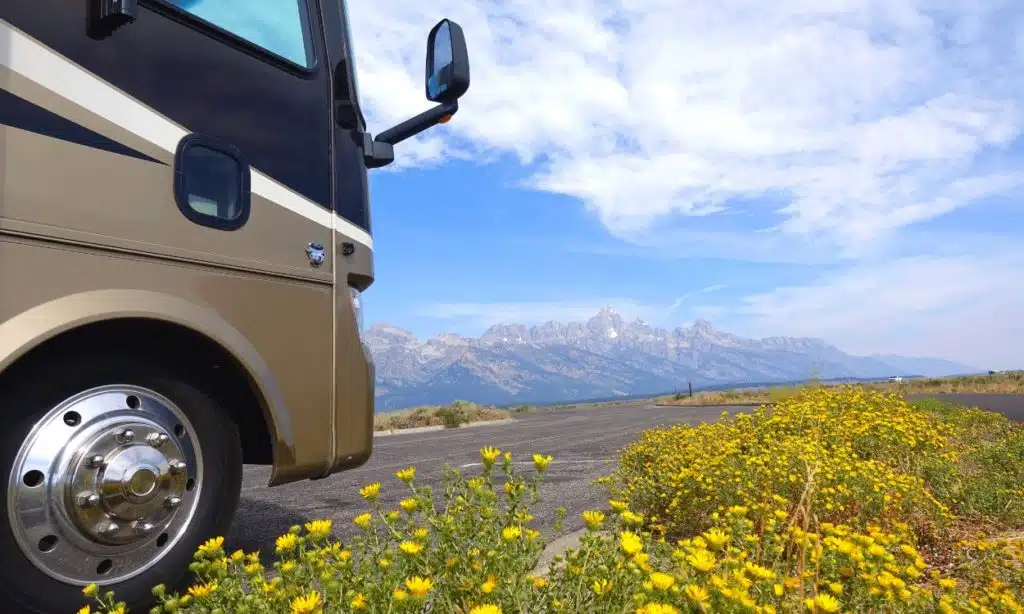
How much was RV Depreciation?
This is a fascinating comparison. Let’s look at both – very different – scenarios.
As you would expect, our first RV, being only two years old, experienced substantial depreciation. But not nearly as much as if we had bought the motorhome new. We were fortunate that we bought the Tiffin at a reasonable price in May 2014 and sold it well in March 2018 to a private party . But if we had traded the Tiffin in at an RV dealer, our net cost of RV depreciation would have been MUCH higher.
Our second RV, the Country Coach
Buying at the bottom of the depreciation curve meant the base value wouldn’t drop any further for a long time. But we did spend a lot on RV repairs, maintenance, upgrades, and the RV makeover. How much will we get back in increased value over what we paid?
Let’s take a look at the details.
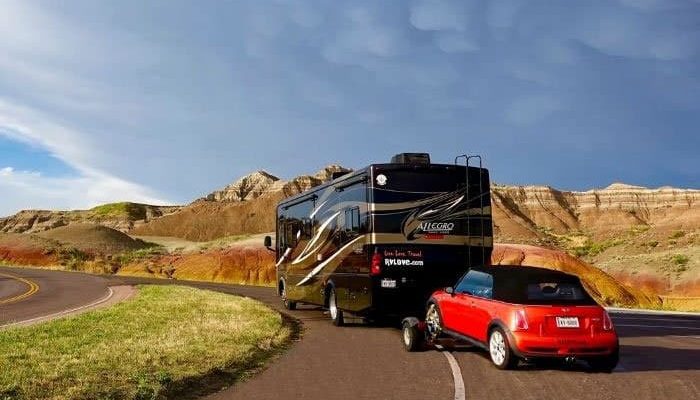
Depreciation on RV #1 – 2012 Tiffin Open Road gas motorhome
To recap, we bought the Tiffin for around $100,000 ($93K + Colorado state tax) in May 2014 and sold it privately in March 2018 for $75,000. When we considered trading the Tiffin in at a dealership, we were only offered $50,000. So, by selling it privately, we were able to make an extra $25,000 and also limit our RV’s cost of depreciation to $25,000.
That $25,000 depreciation loss averaged out at $556/month.
Had we traded the Tiffin in and rolled that extra depreciation into a new RV loan (as many do), we would have had a net depreciation of $50,000 – or $1,111 /month. OUCH!
You are probably keeled over on the floor right now!
Above all, everything with wheels depreciates, and our RV life isn’t just a vacation.
It’s the vehicle that allows us to live, work, and travel as we roam North America. Moreover, we don’t have another home/mortgage payment, so think of it as rent.
Depreciation is very real, and we strongly recommend you think about your future (likely) loss when thinking about buying an RV so you know what to expect.
Now, pick yourself back up, and let’s continue!
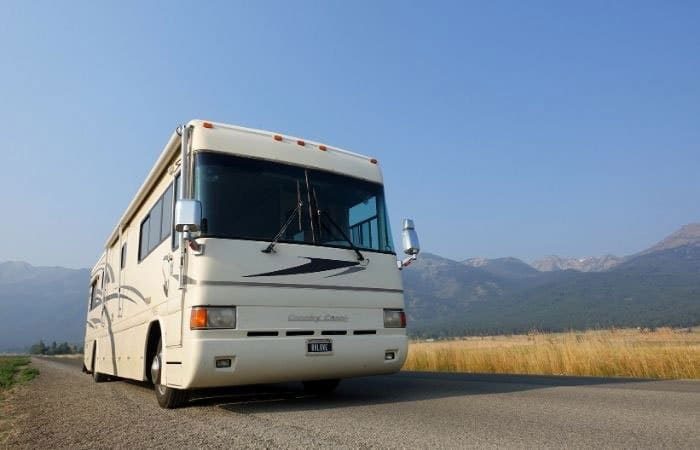
Depreciation on RV #2 – 1999 Country Coach diesel motorhome
To recap, in March 2018, we purchased our Country Coach diesel motorhome for $25K ($26,500 including taxes). Our decision to buy a much older RV (19 years old but high quality) for our second RV was multifaceted. Obviously, after the $556/month depreciation on our first RV, we wanted even more to minimize depreciation next time around.
We bought our Country Coach at the bottom of the depreciation curve – about a tenth of its original $230K price 20 years ago! (Yes, RVs depreciate hard!) We knew that the base price would not move much – if any – for the next few years at least.
Still, we negotiated 28% down from the asking price of $35K (originally 50K) to $25K, which was just above the dealer’s wholesale price.
No, we didn’t get any special favors or deals.
We were simply experienced, well-informed buyers who recognized an ideal purchasing scenario. Then we used all of that to our advantage to negotiate HARD. And we also took the risk of buying the RV ‘as is’ with no dealer warranty.
We knew the trade-off in buying this older RV would mean higher RV repair costs and maintenance. And it did! Discouraged by seeing how RVs are built during multiple RV factory tours and with so few that suited our more modern style and our need for two separate work spaces – we took on a DIY RV renovation.
What did we sell the Country Coach for?
In an ideal selling environment, we sold the Country Coach for nearly double what we paid for it.
Selling the Country Coach for $49K meant a $22,500 increase in value – appreciation instead of depreciation. Essentially ‘getting our money back’ on our purchase price, PLUS offsetting the depreciation we experienced with the first coach. This increase in value is due to other improvements made. More on that below.
BUT…. this is not the whole picture!
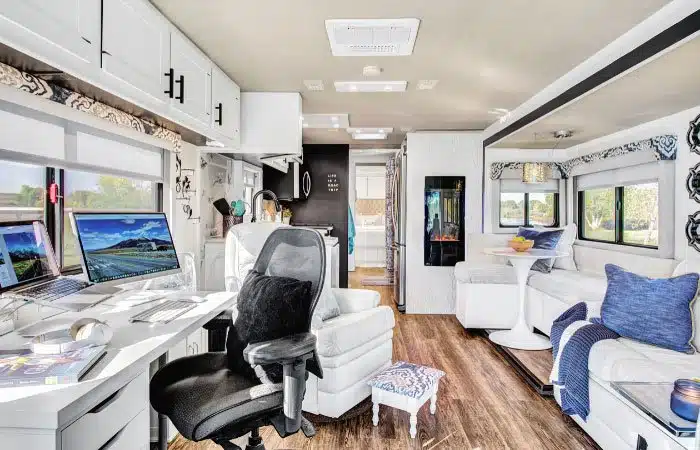
The interior of our 1999 Country Coach, after our Ultimate RV Makeover
Investing in improvements to the Country Coach
We must also factor in how much was invested into the Country Coach to increase its value since purchasing it. We spent about $12K on our interior remodel supplies and decor. And we upgraded our power system with lithium batteries, a hybrid inverter, and solar panels, so we could spend extended time off-grid and save on camping fees. This was a project in partnership with Battle Born Batteries and Zamp Solar. We also upgraded our RV awning and slide topper fabrics thanks to Tough Top Awnings. We estimate these upgrades to be worth about $16K all up (including labor).
So let’s put a total $28K value on RV upgrades and improvements, bringing the total investment value to $54,500.
Selling the Country Coach for $49K (in July 2020) meant $5,500 in depreciation over 28 months—an average of $196 per month.
This does not factor in the RV costs for repairs and maintenance of $23,268 or $862 a month (to keep it comparable with the Tiffin depreciation example).
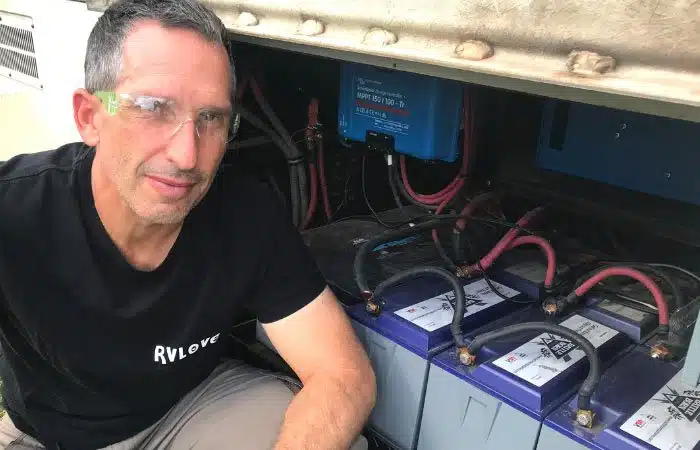
The heart of our off-grid system – lithium batteries, inverter and solar charge controller
Key considerations
We front-loaded our investment in the Country Coach with the RV reno, upgrades, and a few big ‘one-time’ repairs. So the longer we kept the Country Coach, the more the average monthly RV cost should reduce over time. Assuming we didn’t incur any other significant repair costs in the meantime.
Last but not least, remember most of the RV renovation, plus many of the RV repairs and upgrades, had ‘free’ labor from me, Julie, and a handful of friends. If we counted all the hours we invested into the coach – even at a super conservative $20/hr – that would add up to at least another $20K. It’s likely much more, but I don’t want to consider it. For this exercise, we’re NOT putting a dollar value on our labor/sweat equity!
Something to point out is that free is rarely truly free, including labor.
Our / your time has value. So, time spent on RV renovations, repairs, and upgrades could potentially be spent doing something else. Things like more travel, hiking, biking, exploring, working, and creating more content. It’s an opportunity cost and a personal choice.
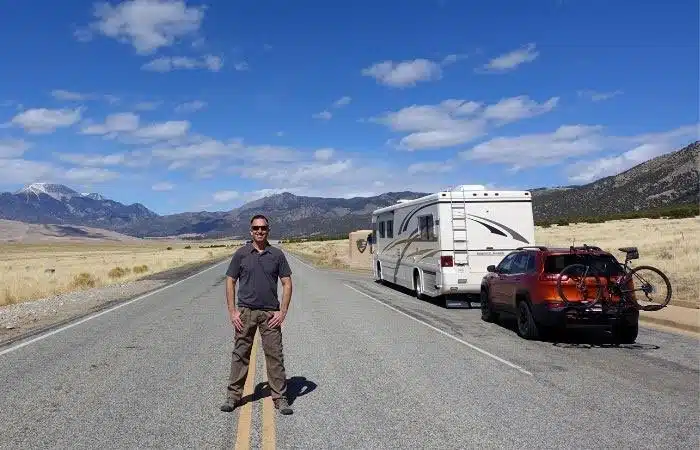
Marc with our CC and Jeep, parked just outside of Great Sand Dunes National Park, Colorado
Total Depreciation on 2 RVs Over 6 Years
So to recap, the depreciation on our first RV was $25,000 over 45 months of ownership, or an average of $556 a month. The depreciation on our second RV was much lower. By selling in very hot RVing market conditions, we sold it for $49K, with a net depreciation of about $5,500, or $196 /month, over 28 months.
All up, we estimate our total depreciation over 6 years on both RVs to be around $30,500 or $418 per month.
But this isn’t the full picture either! Now we need to add ALL of these RV-specific expenses to arrive at the grand total of RV costs related to our RV ownership.
Take a deep breath, here we go!
Total RV Costs of Ownership Over 6 Years
Before you jump straight to the figures, please remember that this is not “black and white.” So don’t just take these numbers purely at face value. There are SO many variables – like warranties and optional upgrades – and those highlighted earlier in this article. Here is what we spent out of pocket on both of our RVs.
RV Year and Type
Months Owned
Purchase Price (inc. tax)
2012 Tiffin Gas RV
1999 Country Coach Diesel
Finance Interest Paid
Repairs & Maintenance
RV Renovation
Depreciation
Avg. Monthly Cost
- The Tiffin repairs and maintenance were offset by our RV extended warranty – if we didn’t have one, we would have been an additional $5,721 out of pocket. Total RV repairs would have been $17,981, with a monthly average of $400. Remember, we inherited our RV extended warranty, so we must factor in that cost. Also budget for RV repairs and maintenance is not covered by the warranty.
- We included the total cost of our Country Coach RV renovation but did not include the value of improvements like the off-grid system and new awning fabric (partnerships) as they weren’t direct out-of-pocket expenses. We also consider these optional – not essential. But they helped increase the value of the coach.
- Don’t just look at the numbers as black and white – consider all of the variables we have shared to keep things in perspective. You can play around with different scenarios and data to see other possibilities. eg. What if we hadn’t done a remodel? Or how about you don’t want to DIY your repairs? What if a coach with lower mileage didn’t need a fuel pump repair costing $8,500? Imagine if you bought the RV new instead of used with a factory warranty but also got hit much harder with depreciation, especially if you traded it in—something to think about.
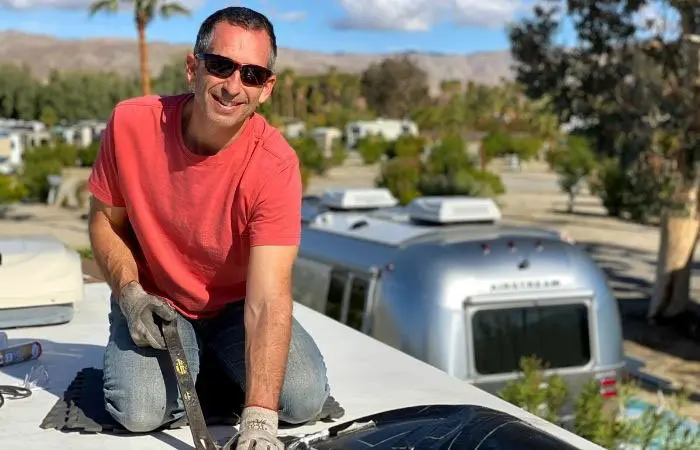
Marc replacing the skylight in our Country Coach at Catalina Spa & RV Resort , California
Key Takeouts On RV Costs
- We are glad we didn’t overcommit financially on either RV, but they still cost more than we initially anticipated when we bought them.
- The extended warranty on our Tiffin helped reduce our anxiety whenever something went wrong! Many times we wished we had one for our CC.
- Diesel motorhomes offer excellent ride and quality, but it was also more expensive to repair than our gas RV.
- We knew it would be a lot of time and work renovating and repairing our Country Coach, but it still exceeded our estimates.
- I gained so much experience doing all that DIY work renovating and repairing, which gave me a lot of confidence in my ability to tackle many issues myself.
- Having such vastly different experiences with both RVs has been incredibly valuable. It has further deepened our knowledge and understanding of each option.
- We have loved both of our RVs for different reasons. We don’t prefer one over the other. Each has pros and cons, offering the experience we wanted at the time.
- Despite our extensive research, we still underestimated and overlooked some of the expenses related to RV ownership – mainly in unexpected RV repairs.
- At the end of the day, we don’t focus on what the RV life has ‘cost us’ so much as what it has given us in terms of experiences, joy, and adventures.
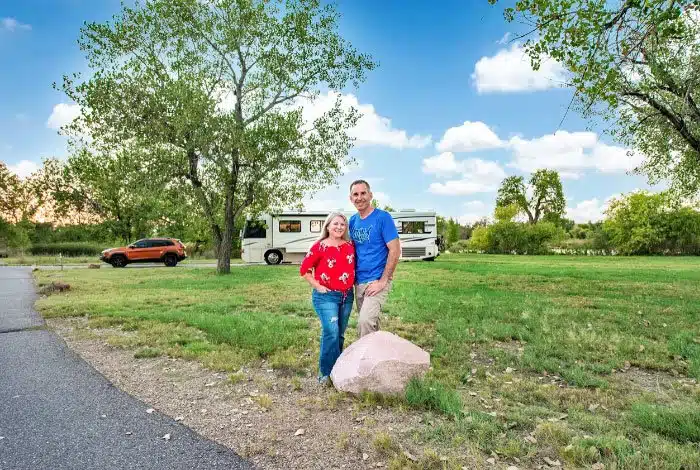
After reviewing all this, you may be thinking, “Wow! Owning an RV is expensive!” Yes, it certainly can be, but as we’ve said, it really does depend on how you do it, your style, budget, and preferences.
So let’s wrap up with why we made our choices to provide some perspective.
A few things to keep in mind
We specifically chose to live and travel in a Class A motorhome – not a truck and trailer –as we felt it was better suited to the type of experience we wanted to have. While we did consider towable options (both times we were RV shopping) we decided against it as we did not already have a suitable truck to tow with, and we didn’t want a truck to be our daily driver. We prefer smaller, sporty cars for exploring. Heavy-duty trucks are great for towing RVs, but they can be expensive to buy and maintain too.
For us, trading one life experience (ie. a suburban stick and brick home with a mortgage, two cars, and commutes to work) for another (ie. a full-time traveling lifestyle in an RV exploring the country) has ended up costing us about the same. Aside from the RV ownership costs, we also had to add our RV camping costs and fuel costs . Of course, the other big consideration is while an RV depreciates, your home (presuming you own, not rent) would typically (but not always) appreciate over the years.
But as full-timers, we’re not paying for a vacation RV on top of a stick and brick home. Keep that in mind if you’re planning to travel part-time or just for vacations. You may not use the RV as much, so your repairs, wear and tear, and maintenance may be lower, and you may also need to pay for storage. Check out our blog post comparing full-time and part-time RVing costs here.
D o we have any regrets?
In short, the answer is no. Each of these motorhomes has provided us with the ability to travel all around North America, create incredible adventures, experience personal growth, learn how to DIY repairs, build confidence, make great friends, spend more time together, visit family and friends around the world, work remotely, create content that helps and inspires others, transition to self-employment, write and publish two best selling books, Living The RV Life, and RV Hacks , built a wonderful community, and make a living doing what we love. We’ve been able to follow our dreams and do all this while we’re still young and healthy, creating memories and fulfilling experiences in ways we could never have imagined.
In conclusion, we are well-traveled, fulfilled, and grateful. How do you put a price on that?
Continue Your RV Education with…
- Our Book: Living the RV Life – Your Ultimate Guide to Life on the Road
- Our Online Courses: RV Success School
- Our Second Book: RV Hacks – 400+ Ways To Make Life On The Road Easier, Safer, and More Fun!
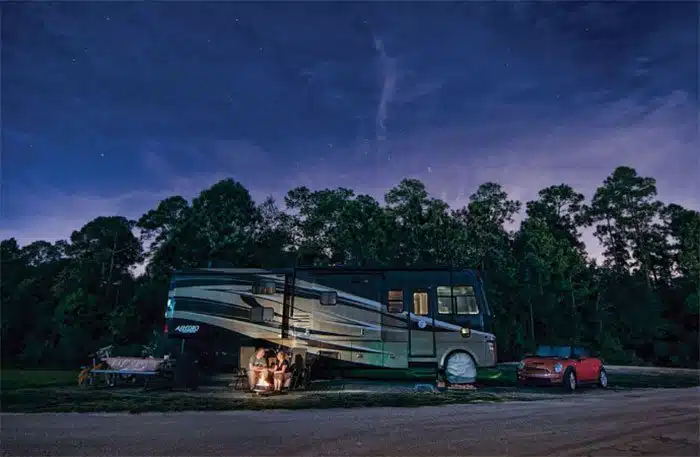
RV campsite at Thousand Trails Orlando, Florida. Credit: Jerome Braga of Our1Chance.com
What about the other costs of RV Life?
We have shared a lot of detail in our ‘Six Year Recap’ articles to give you a real-life, honest perspective of every aspect of what the RV life can cost. Remember, this article just covers our RV ownership, so if you haven’t already, jump over to:
- What has RV camping cost us over six years of full time RVing?
- Is Thousand Trails worth it? Our comprehensive review after six years of TT camping .
- Fuel costs and mileage after six years of full-time RVing
- Part-time vs Full-time Costs of RVing.
We hope you found this article helpful and educational! We’d love to hear your questions and comments about your RV ownership – expenses and experiences! So drop us a note in the comments below!
Sign up for our email updates, with more RV life news, tips and campground reviews.
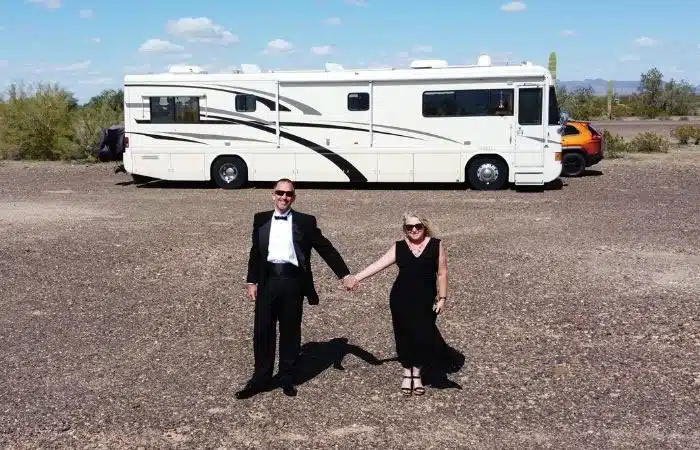
Breaking pandemic lockdown monotony – dressing up for Formal Fridays, in the desert
GOT COMMENTS OR QUESTIONS?
We would love to hear from you. Drop us a note in the comments section below.
Over the years, we’ve found many great resources that help save us money and/or enhance our RVs and RV life. Here are some of our faves that we recommend.
- Wholesale Warranties – for free quote and great price on RV extended warranty
- Premier RV Inspections – we used them before buying our RV
- Thousand Trails Camping Memberships – saves us money on camping
- RV Trip Wizard / RVLIFE app – excellent tool for safe RV trip planning
- Amazon – shop our fave RV gear that we use and recommend
- Mobile Must Have – for mobile internet connectivity and RV safety gear
- TSD RVer fuel program – save money on diesel fuel
- Mudflap fuel app – get $10 bonus fuel with this link and save up to 50c/gallon
- TechnoRV – RV and tech gear for your RV life
- Battle Born Batteries – the best lithium batteries to get out there, stay out there
- Tough Top Awnings – save 5% with discount code RVLove
- Mattress Insider custom mattresses – save 10% with code RVLOVE
- Find more on our Recommended Resources Page
If you have any questions at all about these resources and providers, please don’t hesitate to ask. We’re here to help.
More Great RV Budget and Planning Content
Want to discover more articles and videos, including other posts in our 6 year recap series? Hover over each image to see the title.

Values Of RVs. What’s My RV Worth?
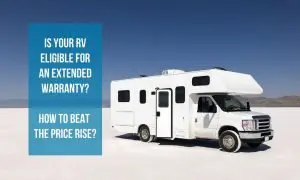
When to Buy an RV Warranty For Best Value
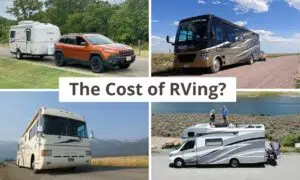
Cost of RVing – Full Time vs Part Time?
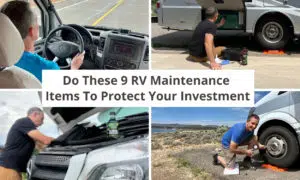
9 RV Maintenance Items To Protect Your Investment
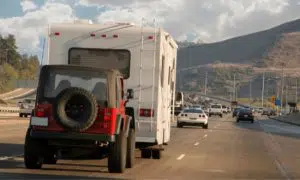
The State of RV Repairs: Problems and Solutions

How To Winterize An RV: What You Need
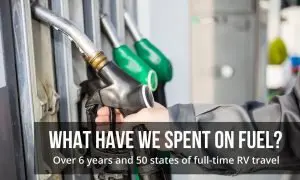
Fuel Costs Over 6 Years of Full Time RV Life
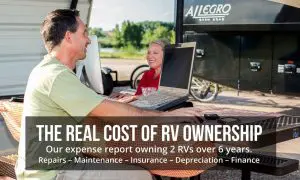
RV Camping Costs over 6 years of Full-Time RVing

Jeep Death Wobble Fix Update – How We Fixed It

11 More RV Repairs, Mods and Upgrades To Our Motorhome

RV Extended Warranties. Are They Worth it? 2024 Update

Diesel Fuel Discounts – Save Money with This Fuel Discount Card
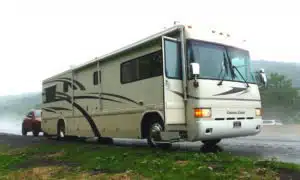
Something is Wrong! Our Death Wobble “Breakdown”
Un-planning our rv travels we did something different and liked it, 25 thoughts on “the real cost of rv ownership. here’s what we spent.”.
Hello Marc and Julie Thank you so much for all your articles and wisdom although it did not have the outcome I expected when I started reading them. My wife and I had started the process of buying a new class c Forester motor home and then, a little late, i really started doing my home work. After a lot of research we decided , for us, it was just not worth the cost to be part time RV’ers. Thank you,
Hello Marc and Julie Thank you so much for all your articles and wisdom although it did not have the outcome I expected when I started reading them. My wife and I had started the process of buying a new class c Forester motor home and then, a little late, i really started doing my home work. After a lot of research we decided , for us, it was just not worth the cost to be part time RV’ers. Even one day ago I had no idea how much the average cost to own and operate a motorhome. Thank you again.
Hi Charles, thank you so much for your response, and for taking the time to share your experience. We always strive to share useful information to help people in their research before deciding to buy an RV… and how to save money when out there traveling! You are wise yo do your research on all the costs of ownership before making a purchase, especially of a NEW RV. We always recommend folks start with a well cared for USED RV, as it will teach you the most, and you will lose less in depreciation, tax, etc. Given you are considering your own part time travels, perhaps it makes more sense to occasionally rent an RV from RVshare, and mix that up with AirBnb, hotel, cruise travels…. that can be a great way to travel part time, without being on the hook for ongoing repairs and maintenance / ownership costs of an RV. We consider our job to be NOT to convince people to RV (there is plenty of that out that there) but to show people the realities of RV ownership, living and travel, and help prepare them for that so we can navigate the expenses, safety, operation etc confidently. We just returned from 111 nights away over winter with our new-to-us (used) fifth wheel, and managed to do it for around $22 a day for camping and fuel for the two of us… so it was very affordable and a great way to escape the Colorado winter. We use our Thousand Trails membership extensively to help us save money on RV camping costs. We’ve coming up for our ten year anniversary of RVing next month… 6+ years full time and almost 4 years part time… and one reason we’ve been able to make it work is by being diligent and conscious of all the associated costs. You are wise to have done your homework before diving into the purchase of a brand new RV (most don’t!)… we think it is better to know now than later when it’s too late… that perhaps it is not for you. At least not at this time. If you ever change your mind and decide to consider the RV life, we hope you will continue to find our content helpful. Our goal is to help people buy an RV WELL and create a travel/lifestyle plan and budget that works for their needs and financial situation. Wishing you and your wife all the best in your future travels, whatever you decide to do! We’re glad to have been of service. – J&M
Hello Julie and Marc. Thank you so much for this article and the very useful information. Stephanie and I live outside the USA (in the Netherlands to be more specific) and own a German made Class C – motorhome. It took us to many countries all over Europe. We retired from work two years ago and love RV-ing. Until a few years ago, besides owning our motorhome, we also owned a vacation Home in Clermont, FL, next to the Thousand Trails RV-site that you both know so well. After Covid hit in 2020 we were not allowed to travel to the USA. That triggered us and we decided to sell our Florida-home, which we did in August that same year. Luckily we had our RV, so we could still make many adventurous trips. Now that we are retired we have increased our RV-road-trips and we love it even more. We’ve just returned from a beautiful trip in Southern Spain and Portugal. “Snowbirds” in Southern Europe 🙂 But (and here it comes)……. We miss the US. Before owning a 2nd Home in Florida we did several Road-trips in many US-states, visiting many National Parks and State Parks. Always staying at Hotels, which was convenient, however we want to do these trips again and this time in a RV. Although retired, we believe now is the time to act and to follow this dream. At first we had the idea of shipping our current motorhome to Canada or the US and driving around with a Dutch licensed car and US insurance. This is allowed and doable, but is only for maximum one year or you would run into import duties. Not the option we want, so we’ve decided to buy our own RV in America. Probably a Class C motorhome, but we are also interested in a fifth wheel. We are in the middle of our research and are so grateful for the information you are sharing. Looking forward to new information about your experiences with your current fifth wheel. Would be very helpfull if you could share some updated info about costs, maintenance etc. Many thanks and happy RV-ing.!
Hello Jans, Thank you for your wonderfully detailed response. Glad you loved the article, and so happy to hear about your many adventures and plans for even more. We will definitely update the article once we have the fifth-wheel a bit longer. I can definitely say that so far… our expenses in this fifth-wheel have been really good. Much lower than our previous motorized RVs (even after including the truck related expenses). We bought this in late September, and are loving our first 5 months of travel in it. It is so homey. Set up and pack up take a bit longer than with the Class C, but we are traveling at a slower pace, so that is totally fine. The much more comfortable living environment is great. It all depends on your pace of travel. We still work full time, but you are retired. If you plan to move frequently, you might still really love the Class C style of travel. But I (Marc) definitely prefer the truck and trailer so far. -M
To rich for me
Definitely good to do the math in advance. Many jump in to deep too quick and only realize after the fact that it is too expensive. Of course, there are ways to lower the costs, but there are many factors to consider.
My wife and I have 2 boys, age 9 and 10. Our 10 year old is severly disabled. Traditional hotel stays can be a challenge so we are considering an RV for vacations. My wife and I are both teachers, so we have summers off, but our budget can be tight. We arent scared of the monthly financing costs. What scares me is the maintenance. So my question is this… is there a way to finance future maintenance costs with the purchase? Or is that something you should have in a nest egg before purchasing?
Hi Matthew, I think RVing could be a great solution for you to enjoy vacations with your boys. There is a lot of flexibility, and hopefully you can find one that fits well for your disabled son. It is definitely helpful to have a nest egg. But what you mention about wanting to finance maintenance costs, can also be indirectly achieved by having an extended warranty for your RV. It can help contain costs for when things break. But actual maintenance would be separate. You can learn more about pros and cons of RV warranties in this dedicated post. https://rvlove.com/rvextendedwarranty Wishing you the very best – M
I don’t see anything about mileage driven in these vehicles? I am trying to determine cost of maintenance per mile…do you have that average number?
Hi Ryan, Near the top of the post, and also referenced elsewhere in the post we have a link to a dedicated post about fuel and mileage. It includes breakdowns of mileage for every year, including fuel used for generators and propane. Here is a link to that post. https://rvlove.com/planning/fuel-costs-over-6-years-of-full-time-rv-life/
You might also be interested in reading our other, even more recent post that compares our full-time RVing costs, versus our part-time RVing costs. It is a more high level post but still includes data on all cost categories. Here is a link to that one: https://rvlove.com/planning/cost-of-rving-full-time-vs-part-time/
Between those two posts, and potentially other deep dive posts, we should have all the data you are looking for. Great to see you are doing your research ahead of time. -Marc
Just the kind of article I was looking for! I am a retired from corporate America, my wife owns a successful online business and our almost 11y/o homeschooled grandson lives with us. We currently live on 5 acres in TN, but are looking into the idea of selling, buying class -A diesel pusher and living on the road. As a kid, we made numerous cross country trips, initially in a wind up roof camper then later with a 18’ pull behind… great memories! I want to create memories for my grandson! There is a tremendous amount to consider and your article is one of the best I’ve read. I will be reading your other recommended “things to read”. Any thoughts, additional reading and other good things to know will always be appreciated.
Hi Jim, so glad you found the article helpful. There’s a lot of detail in there, perhaps more than you will find in a lot of other places. Of course, know that costs will vary depending on so many factors, but at least it gives you an idea of what you might be able to expect. How wonderful you had so many great experiences crossing the country when you were growing up, and want to give the same to your grandkids. Before diving into the full time RV lifestyle, you are wise to be doing a lot of research. It’s a big decision – and diesel pushers are not cheap to buy or maintain – but it’s a wonderful way to travel and explore the country! Our first book “Living the RV Life – Your Ultimate Guide to Life on the Road” will be a great resource to walk you through the steps, and have you ask yourself important questions, as you navigate the journey to RV Life – or even decide if it’s right for you? You can find it in print, digital and audio – here’s a link with the options. http://www.rvlove.com/livingthervlife – We think think you will find it very useful and a great roadmap for your journey. Best regards, Julie and Marc
Can I get a copy of the spreadsheet you used to come up with all the numbers please and thank you. Tom
we don’t have one
Hello I am looking at 40ft diesel pusher and car hauler to travel and sell my amazing whiskey bourbon sauce and will be titling in a business entity and will be able to write off all my expense check out my web site http://www.oheddieswhiskeybourbonsauce.com . I am trying to convince my wife, best friend and soul to take this adventure with me and see where this sauce will take me and financially secure several $ while experiencing North America and spending quality time together. Will be this doing during winter months then Renting it out on RV Share during spring and summer. Your thoughts about this renting.I am hopeful that will make enough money to secure our business adventure and hopefully get my product in grocery stores while a co packing company does all the work for internet sales.If you have ever eating at TGIF and had the Jack Daniels meals this is what my duplicate sauce I master crafted and am very confident that this will change not only my life but also the BBQ,smoking industry.
First of all, get professional advice from an accountant about how much / what you can write off. Second, you can list it with an RV rental fleet company, but keep in mind these are complex machines – especially diesel pushers – and things regularly need fixing on RVs. Consider if you are comfortable having a renter use your rig. If you get a newer, more expensive RV it will attract a different kind of renter than an entry level gas coach. Renting is popular right now, but do not underestimate the ongoing repair and maintenance costs of a diesel pusher. Do your research before making a big purchasing decision! You might also want to consider a toy hauler for traveling in while hauling your inventory.
RV’s come in different shape and sizes with different roof substrates but with some simple RV roof maintenance tips, it becomes easy to keep your RV looking great and working well for many years. For a long-term roof solution just apply Liquid RV Roof which provides outstanding characteristics not found in other coatings.
Thanks for the tip
Wow. Very detailed article. Great info. While we personally own a 2018 Keystone Outback toy hauler and a 2015 Chevy Silverado dually diesel truck, we can relate to some of the costs and scenarios you’ve presented. Most recently, it was our three-day boondocking experience in a Walmart parking lot while we had a $2,300 repair done to our truck. ???? Thank you for putting this all down on paper. It encourages us to be even more diligent in recording our expenses of the same. Fortunately, John is excellent, mechanically, as well as being an RV Inspector, so many of the repairs on our former RV/truck and our new combo have been more affordable. Eager to read your other articles in this series!
Hi Pat, thanks for sharing. You are so fortunate that John is handy mechanically – that will save you a LOT! Glad you enjoyed the article! Cheers – J
HELLO MARC AND JULIE!! We are not getting much in the way of travelogues from RVLove of late, but I hope that is coming in time! Well, different strokes for different folks! I don’t own a thing which i did not pay cash. That includes a sticks and bricks house. The people selling extended warranties are in it for profit. They know what the cost of maintenance should be and they charge us more than that so that they are profitable. Lenders charge you interest plus whatever charges they can hide in there so they are profitable. I just pay cash and let them go to others to be profitable. I bought a new RV that was a year old paying cash. I did not tell them that this was a cash deal until we were signing papers and they tried to start selling me financing. I said that I would have a cashier’s check for the entire amount for them the next day. It is a 2000 bought new in May of 2001. I got a great deal because they wanted to get it off their books and get the new models in to sell.
Hi Carl, good to hear from you. Yes, we have had a lot of things going on behind the scenes and taking care of some personal business. More content on the way. Good to hear you found a good deal and paid cash. Yes warranty and finance companies – like all businesses – are there to make money. But they also provide a service, at a price, for those who choose or need it. As you saw from our post, we definitely got the benefit from our RV extended warranty and savings. The majority of people probably won’t ‘get their money’s worth’ out of a warranty as they don’t use their RV a lot. But for full timers like us who use the RV extensively, and travel more miles, well, there are just more things than can go wrong – and do. We have several friends who have extended warranties and are already well ‘ahead’ on their purchase price. It’s different strokes for different folks as you said. All depends on the RV, your situation, budget, how you use it. More complex motorhomes have a lot of things that can go wrong with them, which we have learned through experience. Good move to buy your RV at a time when the dealer is wanting to move inventory and create space on their lot. Same as when we bought the Country Coach – they wanted to move it so we were able to negotiate a good deal. Take care of yourself! Cheers – J
Hi you two pandemic travellers, Thank you for a most informative and interesting article! It was an eye-opener and especially nice to hear your honest perspective/comment on the build quality or lack thereof within the industry. In my mind given the increased demand by boomers wishing to experience RV travel/ownership along with a highly competitive market, I anticipated and questioned whether greater improvements and quality had occurred in the industry and you’ve provided the answer…. not a lot lol. It will be interesting to see what happens post COVID-19 or when a vaccine becomes available as I actually think there will be continued interest in land-based travel vs cruising and flying for some time. In turn the demand for rigs and camp-sites should remain strong along with the costs associated. Thank you again, great article….travel safely! Ron & Cathy, Cda.
HI Ron and Cathy – glad you enjoyed the article. Yes we agree that RV travel is likely to remain in high demand for quite some time. Sadly, with RVs being so popular and flying off the lots (as they have been for many years) there does not seem to be a huge incentive for RV manufacturers to improve their quality, as this inevitably increases labor and cost. And the lower they can keep RV costs the more they will sell. It’s a shame the industry isn’t regulated to a higher degree such as automobiles. It’s also no coincidence that we purchased a high quality 1999 Country Coach – over one of the newer models. We believe that decision speaks volumes. That RV is not perfect either, but we never doubted the build quality or thoughtfulness in design. Wishing you all the best!
Leave a Comment Cancel reply
Pin it on pinterest.

What is the Total Cost of Owning an RV?
Written by Jordan Stokes
Table of Contents
Introduction
Thinking about owning a rig of your own? RV ownership includes costs beyond the purchase of your travel trailer or home on wheels. Lucky for you, we’ve rounded up the top 7 expenses of owning an RV so you can choose a motorhome or camper that fits your budget! From vehicles to insurance and even storage options, we have all of your RV expenses covered. RV’s are great for camping, long-distance trips, and more. Whether you’re diving head first into full-time RV living or just looking for a seasonal camper for vacationing, it’s important to know what you’re going to be paying.
Top 7 Expenses of RV Ownership
There are 7 expenses you need to consider once you decide you’re ready to hit the open road. Like any big purchase, RV ownership is an investment, and there are added costs, especially when it comes to owning one of these 2,000-10,000+ lb rigs. Here are the 7 expenses you need to plan for if you want to own an RV:
- The cost to buy an RV
- Maintenance
- RV Parks and Campsites

Looking to rent an RV? Get $40 off of your first rental with Outdoorsy .
1. how much does an rv cost.

- Class As are preferred by full-time RVers, and at up to 45 feet long, they are the largest and most expensive RV you will find. Class A homes are on average around $200,000.
- Class Bs are more like vans and are essentially just basic travel campers. Class B homes average around $120,000.
- Class Cs are mid-sized RVs that range from 20 to about 35 feet and are typically built on top of a van or large truck. Class C homes average around $100,000.
The thing is, the sky’s the limit when it comes to spending on an RV. So the question is: how much are you willing to spend? On average, new RVs go for about $55K MSRP, while used RVs go for about $35K MSRP. Of course, the price varies dramatically based on the type and brand of RV you purchase. Read our New vs. Used RV buying guide to ensure you make a smart, informed buying decision.
2. How much does RV Insurance Cost?
The cost of RV insurance is typically more reasonable than auto insurance because most people tend to drive RVs less than they do their cars. Regardless, you should always do research before you purchase insurance if you plan on buying an RV of your own to make sure you’re covered where you need it. RV insurance averages $500-$1,000 annually for a motorhome and about $250 if you’re going the trailer route.
Pro Tip: Your age and driving record are factors that also play a role in determining your insurance cost. Remember to always shop around for insurance rates and premium costs to find the right price for you!
Looking for an insurance quote? Get a quote with Progressive , a leader in powersports and RV insurance. *This is a sponsored placement by Progressive Insurance.
3. RV Gas Cost

- Class As average about 8-10 mpg and hold 100-150 gallons.
- Class B Camper Vans are similar to standard family vans, and typically get 10-25 mpg depending on make and model, engine size, vehicle weight, city/highway miles and speed driven. Class Bs hold around 25 gallons.
- Class C motorhomes average 10 mpg and hold 25-55 gallons.
What type of gas does an RV use? There are gas and diesel motorhomes, so the choice is yours! Diesel motorhomes are preferred by long distance travelers because it is much more fuel efficient and has a greater energy value than regular gasoline does. No matter what you choose, tools like Automotive.com can help you find the cheapest gas prices near you.
4. RV Maintenance Cost

- Tires – Start at about $300 each
- Toilet – About $150
- Floor Repair – Depending on materials, can cost anywhere from $2 – $15 a square foot.
- Roof Repair – $250+
- Windshield Replacement – $1,000 – $5,000
- Water Damage – This varies depending on what is damaged, but can start at around $800 and go from there.
You should set aside about $100 a month for maintenance costs.
5. RV Parks and Campsites Cost

Pro Tips: Regardless of what you pay, any decent RV park will have hookups, bathrooms, and maybe a playground or a few things for the kids to do. Some nicer resorts may even have a pool and a few other fun games or activities! At pricier parks, you might be able to find spas, golf courses, and more. Check out the Top 10 Best RV Parks in America for ideas.
6. RV Utilities Cost

Pro Tip: The good thing is, you can actually pay nothing for services if you are willing to move often from place to place because when you stay in RV parks and campgrounds, your fee covers all of your hookups and amenities there.
7. RV Storage Cost
RV storage is definitely something you don’t want to skimp out on, especially if you experience a snowy winter. The good news is, you can rent an indoor storage unit to ensure your RV will stay protected during months of freezing temperatures, snow, and high winds. Storage units (both indoor and outdoor) can be anywhere from $30-$100+ a month. Read our winter storage checklist to ensure you’re prepared when the temperature drops. If you’re looking for something cheaper, you can also apply a breathable cover or tarp to prevent moisture from getting in, as well as UV radiation from damaging paint etc. on your new RV. Waterproof covers can cost anywhere from $100-$300+.

GoRollick Buying Experience
When you’re ready to find your perfect RV, be sure to check us out at gorollick.com . You can:
- See nationwide inventory, specs, and incentive information
- Get an upfront, transparent price on your desired vehicle
- Receive special offers on both the vehicle, as well as additional accessories
- Shop at one of our Certified Dealers who are committed to providing an exceptional buying experience
You may also like

How To Save (And Make) Money With Your Own RV

Top 10 Ways to Get Outdoors in 2023
Leave a comment cancel reply.
Your comment
Get access to exclusive deals, updates on manufacturer rebates, and product reviews and test drives
Is Owning an RV Worth It?
We break down the financial costs and benefits of owning an RV so you can decide if it’s the right purchase for you.
By Michelle Neale & Roadtrippers
Is owning an RV worth it? Maybe this is a question you’ve thought about for a while, having enjoyed camping and feeling ready to take the next step. Or perhaps you’ve never seriously considered RV ownership before, but given the current pandemic, travel restrictions and general upheaval of routine have suddenly made it appealing.
Of course, the answer will be different for everyone, but it’s important to consider a few different factors when determining if RV ownership is right for you. Here are the top things to take into account when contemplating RV ownership.
The Financial Costs of Owning an RV

The Cost of the Actual RV
You can spend anywhere from $1,000 on a used pop-up camper to $300,000 (or more) on a brand new motorhome. While it may be tempting to splurge on all the bells and whistles, it’s important to consider your family’s specific needs—and what you can realistically afford. Taking on an RV that busts the family budget will not lead to an enjoyable experience, nor will taking out a loan for a brand new RV that you find isn’t right for your family.
My family’s first RV was a 10-year-old Class A in great condition that we paid for in cash. After a couple of years, we decided to trade it in for a new Class A. Although no longer traveling full-time, we were committed to the RV lifestyle, knew what worked for us, and were comfortable taking on the additional expense for an upgraded rig that we love.
Additional Costs
Don’t forget to factor in the cost of insurance, vehicle registration, regular maintenance, plus storage if you’re not able to park the RV at your residence. Other costs that vary but should be budgeted for are campground fees, fuel, unexpected repairs, and gear, which includes anything from kitchen supplies to a high-quality sewer hose (not something you want to skimp on!).
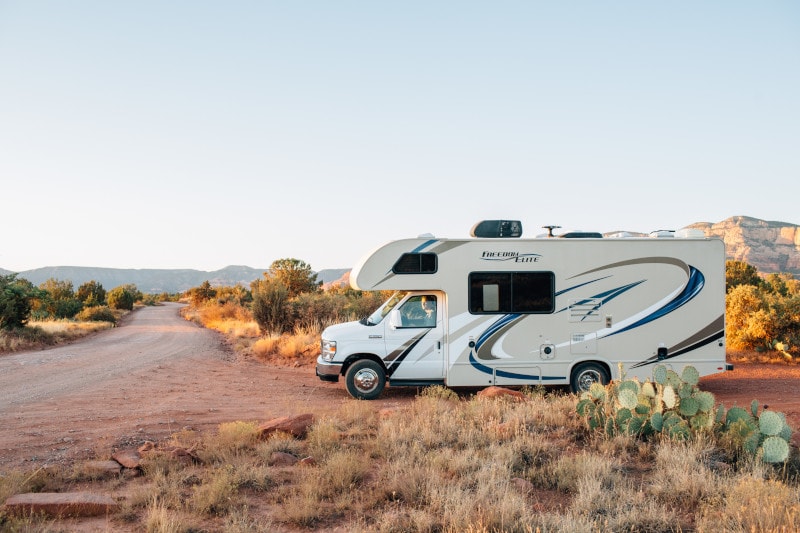
Cost Savings
Having your own RV can mean significant savings compared to the costs of a typical vacation with flights, rental cars, accommodations, and meals out. Especially with kids and/or picky eaters, having your own kitchen and meal planning is not only cost-effective, but also offers peace of mind.
There’s a huge variety of campgrounds out there, from rustic state parks to luxury RV resorts. Even among the different types of campgrounds, rates vary regionally and seasonally. Some places charge additional fees for children and pets. When you take the time to research and plan in advance, camping is not only budget-friendly, it can provide the opportunity to stay in a prime destination for significantly less than the cost of a hotel room or vacation rental.
Some RVers cut even more costs by boondocking , or camping at a free or inexpensive site with no hookups. While “camping” in a Walmart parking lot isn’t exactly what RV dreams are made of, it’s a great alternative for a free overnight en route. (Always remember to call ahead and get permission from the store manager, and keep those slides in and tank valves shut.)
Other Financial Considerations
The vehicles you already own can have a big impact on the budget and type of RV you should look to buy.
Towable RVs come in a wide variety of sizes and price points. If you already own a truck that is capable of towing, a trailer can be an affordable entry into RV ownership. Another advantage of towable RVs is that you only have one vehicle engine to maintain, compared to a Class A or C with a tow car.
A note of caution: Don’t rely on word of mouth and make assumptions about your vehicle’s capability to tow or be flat towed. Be sure to check the manufacturer’s information about your specific vehicle—including the year, as this can vary.
Another financial consideration is how handy you are. With the time and ability to refurbish an older RV, you could stick to a tight budget and even have an RV that retains resale value. Otherwise, make sure you budget out for repair and maintenance costs.
Is an RV a Financial Investment?
The short answer is no. With the exception of some in-demand vintage models, the value of an RV depreciates over time. An RV is an investment in a lifestyle, but you can mitigate the expense by renting it out when not in use through a third-party rental site like Outdoorsy or RVshare .
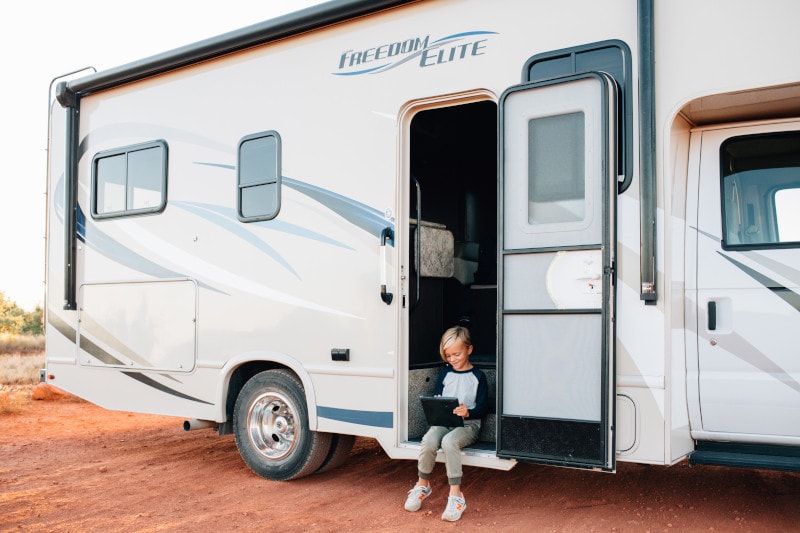
The Personal Investments of Owning an RV
Why do you want to buy an RV? Do you want to unplug, escape from everyday demands, use it as a hotel on wheels, or spend more time together as a family? The stronger your “why” for owning an RV, the more likely you are to find value in the purchase. Owning an RV is more time consuming than just booking a hotel or Airbnb. If you’re not honest about why you want one, or don’t have the buy-in from other family members, it can become a burden instead of a joy.
Some ways we’ve found the personal investment worthwhile:
1. Family Bonding
Our family has bonded strongly through the shared experience and adventure of RVing. Especially now that we’re no longer full-time RVing and the kids are getting older, taking an RV trip for even just a few days brings us all closer again.
2. The RV Community
We quickly found that campers and RVers are some of the friendliest people around. For the kids, campgrounds are an ideal environment to gain independence by joining in games with new friends. Virtually, online RV groups provide a wealth of information and support.

3. Pet-Friendly Travel
RVing is a convenient way to travel with pets. Our dogs love the excitement of new surroundings and going on hikes. And if we go out to explore without them, we can leave them in the comfort and security of the RV, just like at home.
4. Getting Closer to Nature
I’m not gonna lie: We spend plenty of time inside the RV enjoying the creature comforts of air-conditioning (or our toasty electric fireplace), DVD players, and plugged-in devices. Even so, being outdoors is an integral part of RVing, whether it’s hiking a national park, throwing stones in a nearby creek, or simply sitting around the campfire.
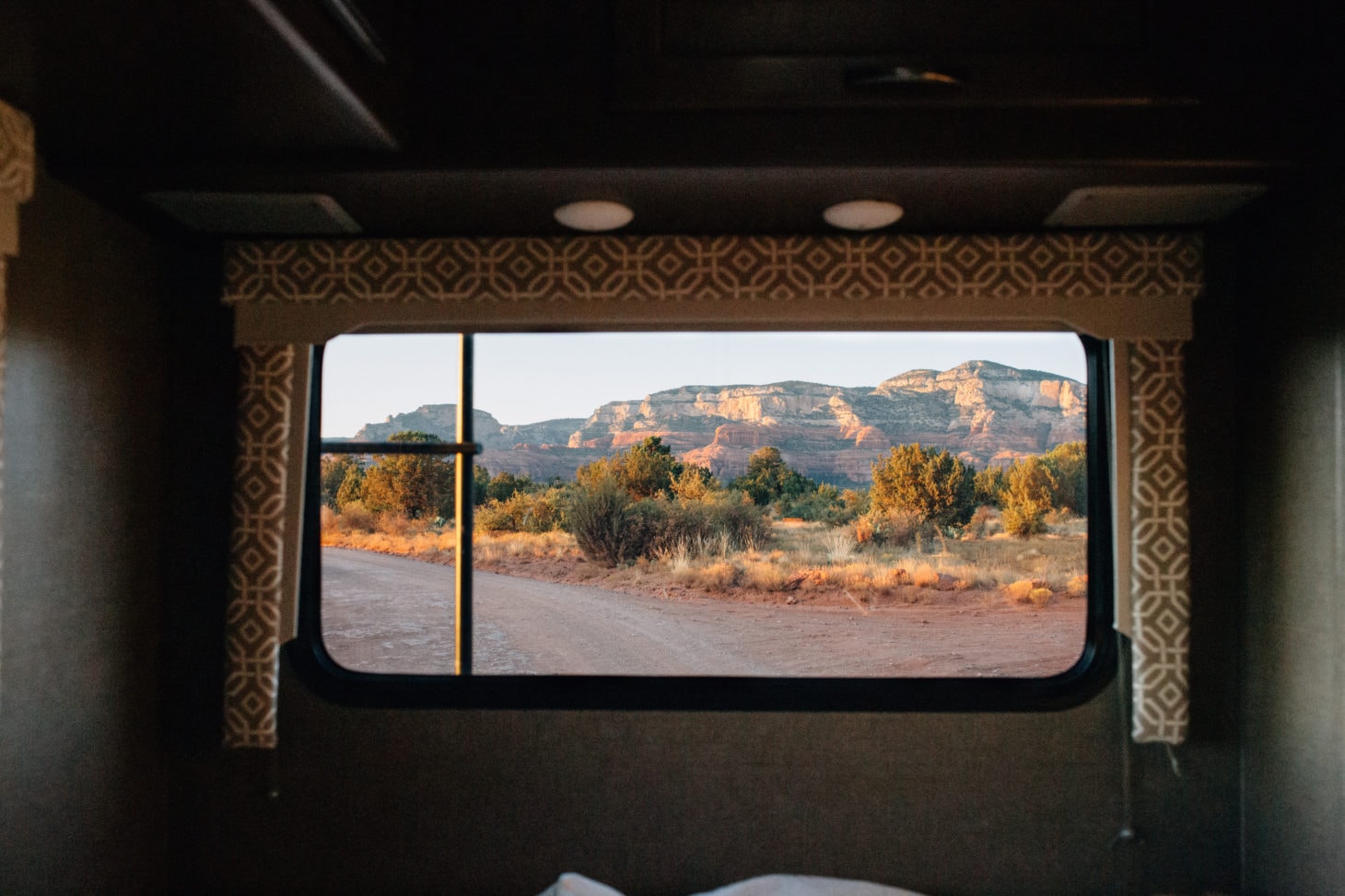
5. Versatility
From amenity-filled resorts to boondocking on BLM land, you can change it up as your budget and preferences allow. If you find yourself parked next to annoying neighbors, you can move. If you unexpectedly fall in love with a place, you’re free to extend your stay. Instead of having a vacation home in one location, an RV allows you to explore a variety of places from the comfort of your home on wheels.
Benefits to Owning an RV During COVID-19
Now more than ever, owning an RV can allow for safe and responsible travel. Even if you’ve never considered RV ownership in the past, this might be the time to do some more research into your first RV purchase.
1. Self-Contained Environment
RVing is uniquely suited for travel during a pandemic. You have control over your environment with a self-contained bathroom, kitchen, and living area. If you meal-plan and pack diligently, you won’t have to set foot inside a store. And camping in a natural setting is not only a welcome respite, but it lends itself to social distancing.
2. Again, Versatility
An RV gives you the flexibility to stay put or move depending on changing restrictions and personal comfort. It also allows you to get a much-needed change of scenery while not straying too far from home by simply camping at a nearby park.
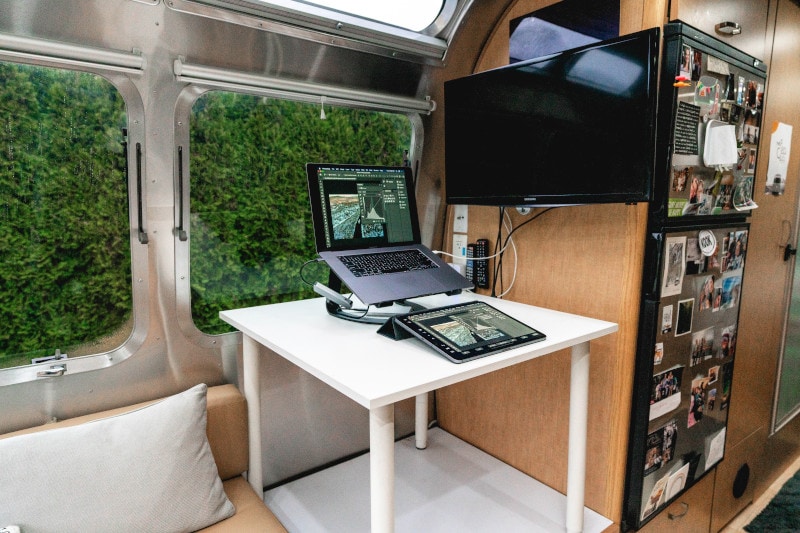
3. Remote Work
Working remotely opens up the opportunity to RV more. Pre-pandemic, I specifically looked for a fully-remote position because I knew we wanted to keep traveling over the summer and during school breaks. It takes extra planning—making sure you have a good cell signal, coordinating travel time around scheduled calls, and finding a quiet place to work (like the RV bedroom, at a picnic table, or campground lodge)—but if you have some flexibility with your work hours, it’s a great way to spend more time RVing.
4. Extra Space at Home
Finally, there is an additional value that comes into play if you’re able to park the RV at your residence: It can be used as a home office, classroom, guest room, or whatever your family needs. Backyard sheds are also popular, but you can’t take those with you on your next road trip.
Evaluating If RV Ownership Is Right for You
RVers value the extra space, proximity to nature, flexibility, and convenience of owning an RV, especially when there are travel restrictions in place. And while some might view the costs and maintenance as a negative, it’s up to you to decide if the pros outweigh the cons for your personal situation. The answer will be different for everyone—but most folks find that owning an RV is worth it, if you have the time and money to use it.
Meet the Authors

Michelle Neale
Since 2016, Michelle has been RVing around North America with her husband, two kids, and two dogs. She's written for national publications including ROVA Magazine and Redbook.com. She has a passion for photography, hiking, the National Parks System, and raising her kids with a love and appreciation of the outdoors.

Roadtrippers
Roadtrippers helps you find the most epic destinations and detours—from roadside attractions to natural wonders and beyond.
Get the most inspiring stories from the road sent directly to your inbox.

- Trip guides
- Trip Planner
- Sign up Log in Sign out
- Log in Sign out
- ROADTRIPPERS MEMBERSHIP
- RV RESOURCES
Plan your journey, find amazing places, and take fascinating detours with our app.
We couldn't find an existing Roadtrippers account using that service. Please try signing in with another option or create a new account with Roadpass.
We need your email address to send you trip itineraries and other updates.

18 Big Pros and Cons of Owning a Travel Trailer
Camping opportunities are available all across the United States. Once you cross the Mississippi River, the western states sometimes offer hundreds of miles of wilderness to explore. When supplies are limited and a tent won’t protect you from the wildlife that’s out there, a travel trailer becomes an investment that makes sense.
Most travel trailers qualify as an RV. These recreational vehicles are in a broad category of towable vehicles that include fifth-wheel designs and tent trailers. It isn’t going to be a motorhome, but there are some that come pretty close to that concept. You can then stock the trailer with as many supplies as you need to have a wonderful holiday adventure.
If you love to travel, manage a regional sports schedule for your family, or you just want to have a grand adventure, then several pros and cons of owning a travel trailer are worth reviewing. You will need to ensure that the eventual product you select falls within the towing guidelines for your vehicle.
List of the Pros of Owning a Travel Trailer
1. A travel trailer is more affordable than a motorhome. If you love to travel, the expenses can pile up quickly when you are on the road. When you own a travel trailer, then you can avoid the initial expense of purchasing a motorhome. RVs are notoriously expensive, and the larger ones will sell for more than $100,000 when they are new. If you want to purchase a travel trailer in a similar condition, then you can expect to pay between 15% to 30% of that initial MSRP. This advantage means that you can enjoy the RV lifestyle without draining your savings account.
2. Travel trailers come in many different shapes and sizes. You can find a wide range of travel trailer designs available today so that something can work with your current vehicle. You will find basic options, like pop-up campers, that work for cars and SUVs that can only tow up to 1,000 pounds. Large fifth-wheel options are the most expensive selection in this category, but it is a choice that also comes with the most amenities.
Entry-level products might not provide the right kind of insulation you need for some adventures, but you can save money on your overall expenses. There is always a way to find an equitable compromise if you pursue this product.
3. You have more flexibility with your travel arrangements. Since you need a vehicle to tow a travel trailer, this option gives you more flexibility with your travel arrangements. Driving an RV allows you to bring a vehicle if you tow it, but the trailer puts your car or SUV as the primary component of your rig. It’s a lot easier to drive into a campsite to unhook a fifth wheel than it is to detach a towing rig for a car so that you can explore the area.
If you were to own a bigger RV, then it might not be feasible to tow that vehicle to the various places you want to travel. A trailer makes parking easier, allowing your investment to serve a dual purpose. It can also help some families avoid the expense of a rental car.
4. Insurance costs are minimal for travel trailers. When you own a bigger, more expensive vehicle, then the cost to ensure it will increase. Travel trailers are relatively affordable, with policies ranging from $150-$500 per year. That figure is significantly less than what it would take to protect a Class A RV. If you drive your motorhome or trailer full-time, then finding the best rate is an essential component of limiting your annual expenses.
It is not unusual for an entry-level RV to cost $1,500 or more to insure. Since a small travel trailer might cost only 10% of that figure, it is a wise investment for those who want to get on the road without spending a lot of money.
5. Maintaining a travel trailer is much easier than it is for an RV. You don’t need to worry about an engine when you are pulling a travel trailer. You are left with the parts that require maintenance because of the usual wear-and-tear process. An RV has an engine attached that can require a significant amount of care. The larger the value of your vehicle, the higher the level of maintenance that will be necessary to keep it operational. All you need to do with this advantage is to ensure your generator or battery is functional to make full use of the investment.
The average owner of a travel trailer can also do most of the maintenance work at home by themselves. If you were to take an RV to a professional mechanic, the need to keep the vehicle tuned up might cost you $100 per hour in labor.
6. Travel trailers have wide availability across the United States. Because of the affordability and ease-of-use that travel trailers provide, they are one of the most popular vehicles sold in the United States each year. If you have a car or SUV that can pull this product, then you can go almost anywhere. That’s why it is an affordable way to enjoy the RV lifestyle. Manufacturers create a diverse array of styles and designs so that you can purchase an item that meets your exact needs.
If you are in the market for a travel trailer today, then you will want to ensure that the layout of the vehicle fits your requirements. Review the included amenities so that you know your car or SUV can support the arrangement. If something doesn’t fit your fancy today, you’ll find several new models being launched each year.
7. There is a healthy used market available for travel trailers. If you are looking for a travel trailer and want to save the most money possible, then consider purchasing a used item. Most private sellers are offering this asset for $3,000 to $5,000, although some fifth wheels can be much more expensive. There can be high levels of depreciation with this item, so you can take it vantage of this fact as a new owner by purchasing a used product.
A used travel trailer can be the perfect first RV. If you’re not sure that you like this option, then you haven’t invested a significant amount of money in this experiment.
8. It is an economical option for most families. You can stock a travel trailer with food, water, and all of the supplies that you need for a trip. That means you can save money each day because you’re not purchasing food at restaurants. Campgrounds will charge a fee for access, but it is significantly less than what you would pay for a hotel. Most of the places where you would take a travel trailer have similar amenities to hotels, including swimming pools and on inside restaurants if you still want those things for your trip.
Even when you compare fuel costs, the travel trailer comes out ahead. An RV can guzzle a lot of fuel when you’re at highway speeds. Your car or SUV won’t have the same miles per gallon when towing the extra weight, but the expense will still be much lower than if you were in a Class A or Class C motorhome.
9. You can take your pets with you in many travel trailers. Although this advantage doesn’t apply to the travel trailers that fold down for driving, you can transport your pets in a fifth wheel without much difficulty. That means you can avoid the headache of trying to find a sitter for your furry friends when it is time to take a vacation. Even if you want to do some sightseeing, the security of the trailer allows you to have unsupervised moments as conditions warrant.
This advantage doesn’t only apply to dogs. You can bring your kitty and many other pets on vacation with you when you have a travel trailer.
10. Owning a travel trailer is a lot of fun. Most first-time owners of a travel trailer get nervous about this investment because they’re not sure how other people will react to their presence. There are some RVs and drivers out there that take up the road, leave their waste behind, and make life difficult for everyone around them. Don’t be those people, and you will find that the community is positive and supportive of your goals.
You get the experience of the RV lifestyle without a significant investment. Some people really enjoy it, so that becomes their priority for each vacation – or even retirement.
List of the Cons of Owning a Travel Trailer
1. Cost can still be a significant factor for travel trailer ownership. Even though you can find affordable travel trailers on the market today, a desire to have a premium experience will result in a significant expense. Fifth-wheel trailers that are top-of-the-line products easily sell for more than $50,000. You can often secure financing to make a manageable monthly payment, but there are families who cannot afford this expense. If you only have a few thousand dollars in the bank, then the condition and quality of used trailers may not be up to your desired experience.
2. Some vehicles have towing difficulties with travel trailers. Before you purchase a travel trailer, you must know the exact towing capacity of your car or SUV. Many four-cylinder vehicles will only allow you to tow 1,000 pounds or less behind the vehicle. Even some large vehicles, such as the Dodge Journey, have this minimum level listed in their base model owner’s manual. If you exceed the maximum weight limit, then there is a higher risk of causing damage to your car and the trailer.
You can also find that some trailers do not work well with certain hitches. If your car or SUV requires a specific setup for towing, then you will want to know if the trailer you prefer will work with the mandated options.
3. You need to check your hitch every time you stop. A hitch can be an easy way to tow a travel trailer to virtually any destination. It is also something that you need to check every time you stop. If you hit a bump in the road or find that your vehicle’s engine is straining to climb a hill, then you might need to reset how you are towing the trailer. If you are not familiar with how to do this work, it can be costly to find someone capable of performing the inspection on your behalf.
4. People cannot travel inside of a travel trailer. Most states will not allow you to carry passengers when towing a travel trailer. That means there are clear restrictions to the number of people who can come along in a single-vehicle for the trip you are planning. Cars and SUVs have limited seating, RVs can encounter this issue when there aren’t enough seatbelts installed for the interior seating, but there are fewer restrictions in place for passenger travel.
The biggest travel trailers on the market today often need a significant truck with a lot of power to create the needed towing structures. That means you’re often limited to five passengers for your trip. If you have a family of six, then you are going to be out of luck in most states.
5. Travel trailers have fewer amenities than larger RVs. If you want to compare the amenities that are available in a motorhome to what you can find in a travel trailer, then the latter will always come up a little short. This option is not always the correct choice if your preference is to enjoy luxury while driving down the road. You can still have a refrigerator, living area, sleeping space, and a bathroom when you choose a travel trailer, but not all of them come with these features.
The most affordable travel trailers in today’s marketplace typically give you sleeping space for 2-4 people and limited food preparation options. More amenities will always equate to a heavier towing requirement.
6. There can be travel restrictions in place for some trailers. A travel trailer can restrict where you are able to explore because you are bringing something along that’s only attached to your vehicle via the hitch. That means your options are somewhat restricted for a trip or a vacation when you compare this option with an RV. You will also need to think about the roads and their conditions ahead of time to ensure that you can arrive at your destination safely.
A travel trailer gives you more convenience than what you would receive when sleeping in the back of a truck or SUV. It is less convenient than what you would experience in an RV. You have to be willing to embrace that compromise and the challenges that this disadvantage can bring to have a successful experience.
7. A travel trailer may not provide you with enough space. Travel trailers provide less space than what you will find in entry-level RVs. One of the ways to maximize the space for a sleeping area is to create flexibility within the interior of the unit, sort of like how a small apartment utilizes Murphy furniture. You will take the pressure off of your vehicle by going with something lightweight and small, but it might not be large enough to accommodate everyone. If you really need a lot of space for your family, then a motorhome is going to be the better choice to pursue.
8. Travel trailers tend to be less comfortable than other RVs. A travel trailer is like staying in a Holiday Inn Express. An RV is like staying at a 5-star resort. You will find people who are happy with either choice, so it is up to you to determine what your comfort levels are for traveling. Some of the products in this category can be over 30 feet in length to give you plenty of elbow room, but then you come back to the fact that you cannot be in one while someone is driving it down the road.
There are layouts that include a full kitchen or a king bed, but then that means you can accommodate fewer people since the spaces are being dedicated to 1-2 travelers. That is why it is imperative to find a layout that matches your expectations.
Travel trailers are a fun way to embrace a nomadic lifestyle. If you have always thought about experiencing the RV lifestyle, then this is an affordable way to see if you enjoy this kind of journey. You won’t receive as much insulation or comfort as you would with a motorhome, but the monetary savings is significant if you have a vehicle that is capable of towing your preferred set up.
Most first-time owners of a travel trailer find that their biggest disadvantage is learning how to drive and park after connecting the unit to their hitch. It takes a specific skill to push a trailer in reverse, so plan to practice that need after purchase.
The pros and cons of owning a travel trailer generally fall on the side of it being a positive experience. There can be length limitations and spatial concerns for some families, but it can also be a lot of fun to see the world using this method.

RV Ownership Cost Calculator
Share this post, table of contents - click to expand.
If you’re thinking about getting an RV, it’s absolutely critical that you first do some research into the costs – up-front and long-term – before you make any decisions. RVing is expensive, there’s no doubt about it and having an RV ownership cost calculator will help you look closely at what you’ll need and choose options that are in line with your finances, you can make sure you’ll have the budget for it.
You can plan your budget in three easy steps (using our cost calculator method):
- Write down all of your current expenses.
- Subtract the ones that won’t apply while you’re on the road, such as utilities, car expenses for vehicles you won’t be using, house maintenance costs, etc.)
- Add the new expenses you’ll have while you’re in your RV. What are these expenses, you ask?
Well, let’s delve into them …

The RV Ownership Cost Calculator
Obviously, your first step in the RV ownership cost calculator is buying the RV. The costs vary wildly – you could spend about $50,000 on a base model Class C motor home or anywhere around $200,000 on a Class A motor home with amenities galore. You’ll get much better deals on used RVs, but the peace of mind in knowing your RV shouldn’t need repairs for the first few years is worth its weight in gold.
Need a little more explanation on RV classes? Motor homes are designated as Class A, Class B, or Class C. Class A is the largest; they can be as long as 45 feet. They’re also the most expensive, averaging around $200,000, not to mention they come with the highest fuel costs. Full-time RVers will generally purchase a Class A.
Class B’’s, which average around $120,000, are the smallest. These are essentially camper vans, and they feature the best gas mileage.
Class C’s are mid-sized RVs typically built on top of a van or large truck. They run from about 20 to 33 feet, and they average around $100,000. The miles per gallon a Class C gets is typically in between those of Class A and Class B.
In all reality, the largest cost of RV ownership is the annual depreciation of the vehicle over time.
In a five-year period, a brand new rig will typically lose 30% to 50% of its value, and by the end of a decade it will be down to 25% to 40% of its original MSRP. If you take the difference between what you paid for the RV and the amount you sell it for at the end, and then divide that by the number of months you used it, you’ll see your monthly loss. But that’s pretty depressing, so maybe don’t do that part?

Accessories
Furnishings and accessories also need to be factored into the original RV cost. Things like rugs, kitchen necessities, patio mats , grills , and camping chairs like these will need to be purchased. When budgeting, it’s a good idea to assume the first three months will have a monthly cost of about 50% more than subsequent months.
RV insurance costs can also widely vary. The price will depend upon how often you use your RV, where you live, the type of RV, the coverage you need, your age and driving record, and more. The annual cost can range from a few hundred dollars to several thousand. Always shop around because the difference in premiums can be truly incredible. Reviews.com offers this handy tool that will allow you to request quotes from several companies at once.
This is a big one! The MPG rating is the biggest factor: the MPG for RVs can range anywhere from about eight for a larger Class A to 25 for a smaller Class B. But it’s also a matter of your RV’s make and model, engine size, whether you’re driving city or highway miles, and the speeds at which you drive. An easy way to guesstimate the cost of your trip is to take the mileage of the total distance of your trip and divide it by your miles per gallon to get the number of gallons of gas you will need. Then multiply that figure by the current price of gas. (You can find the average price of gasoline nationally by checking websites like Gasbuddy.com or asking AAA.)
Maintenance
In your first year, maintenance isn’t much of a factor. You may need oil changes and tire rotations, but any unexpected repairs should be covered under your warranty. (Always read your warranty though!). After the first year, you should always set aside funds for routine work and unexpected problems. Costs can easily range from a minimal amount to several hundred dollars per year; experts recommend you budget between $50 and $100 a month. Repair and component replacement costs shouldn’t be too outrageous in the first several years, but they can raise substantially when the vehicle is in its fifth to seventh year of service. Think tires, batteries, burst water lines, busted toilets, window and roof leaks, etc. An extended warranty can help keep unexpected repair costs within an affordable range; just be sure to read the fine print.
If you’re in a cold-weather state, you’ll also have to pay to winterize your vehicle. The service varies from dealer to dealer but can be performed for as little as $100.
RV parks and campsites
Yep, you gotta have somewhere to stay. Costs are all over the map when it comes to RV parks and campgrounds. It will depend on where you go, what size lot you need, what hook-ups you require, etc. You could boondock and potentially pay nothing or go to a beachfront location that will run you more than $100 a night. To budget this cost, simply get the rate of the park or campground you’ll be going to and multiply that rate by the number of nights you’ll stay at each place.
You’re going to need to store your RV when it’s not in use, especially if you live somewhere cold and snowy. There are many options available. You can go the cheaper route and use an RV cover or tarp (covers range from $100-$300). You can also rent an indoor storage unit— many of which provide indoor, temperature-controlled environments — for about $30 to $100 a month.
As the years progress, you’re probably going to want to make improvements to your RV, just as you would your home. This could include things like mattresses, flooring, solar panels, backup cameras, lighting, shower/faucet heads, a WiFi extender, better stabilizers, improved shelving, an upgraded sewer system, and more. If you know there are things you want to enhance, start setting aside some cash for upgrades in your budget.
You’ll need propane in your RV to keep it warm, cool the refrigerator, cook with, and for your water heater. Costs will depend on the local market price, what the weather’s like, and how often you use your appliances. If you have an electric hookup, you will generally pay less because your fridge won’t need to be propane-powered.
Other expenses
We got the big ones out of the way, but there are plenty more things you’ll need to budget for. This includes food (groceries and dining out), cable/ satellite hookups, WiFi, laundry, cleaning and household items, tools, any camping/RV club memberships you may have, entertainment, mail and postage, and more. Make yourself a checklist of these items and anything else you think you’ll need and try to estimate what each will cost. This will help you plan in advance and will also make you feel great if you stay under budget!
Conclusion:
RV living isn’t exactly cheap, but having an RV ownership cost calculator will help. You have to remember that many of your costs are offset by the amounts of money you won’t have to be spending at your “sticks and bricks” home. And yes, there’s a large depreciation involved in RV ownership, but consider that the cost of being free to explore and enjoy a new lifestyle. You can’t put a price on that!
Subscribe To Our Newsletter
Get updates and learn from the best, more to explore.

RV Surge Protector – Safeguarding Your RV’s Electrical System
Unlike ordinary surge protectors designed for home use, these specialized RV versions have additional features such as weather resistance, built-in protections against open ground conditions,

RV Fire Extinguishers – 1 Of The Most Important Items
RV Fire Extinguishers: Protecting Your Home on Wheels When it comes to the safety and security of your recreational vehicle (RV), having a reliable fire
Starting your own blog? Do You Need Help With Creating Your Website?
Take our free course to see the ins and outs of creating your site.

- svg]:stroke-primary"> 826K
- svg]:stroke-primary"> 622K
- svg]:stroke-primary"> 246K
- svg]:stroke-primary"> 45K
Here Are The Factors That Determine RV Cost in 2024
By Catherine Hiles
Posted on Jun 6, 2023 7:56 PM EDT
17 minute read
Photo: istockphoto.com
We may earn revenue from the products available on this page and participate in affiliate programs. Learn More ›
- The typical cost range to purchase a recreational vehicle is between $10,000 and $400,000.
- The main factors affecting RV cost include the class, size, floor plan, and manufacturer of the RV; the availability of the model being purchased; sales tax; and RV insurance cost.
- There are five main types of RV: Class A, Class B, Class C, fifth wheel, and travel trailer.
- RV ownership has numerous benefits, such as the ability for owners to travel more freely and work remotely, a more comfortable and convenient camping experience, and the potential for additional income by renting out the RV.
So just how much does an RV cost? According to RVing Know How, the average cost to buy an RV is between $10,000 and $400,000. The exact cost will depend on the size, type, and class of RV; the floor plan; the RV manufacturer; and the availability of the model in question. Buyers could also pay less for a preowned model than for a new model, but it will limit their options when it comes to add-ons. This guide will explore the main factors that contribute to RV prices, the different types of RVs, the benefits of RV ownership, and tips on how to save money on an RV purchase.
Key Cost Factors
How much is an RV? When it comes to calculating the average RV cost, potential owners will find that there are several factors that can affect the price. These factors include the type and specifications of the RV, the manufacturer, the availability of the RV model, and the cost of sales tax and RV insurance premiums.
There are three different classes when it comes to driveable recreational vehicles: Class A, Class B, and Class C. Class A RVs are the big bus-like models that are reminiscent of rock band tour buses. Class B and Class C motorhomes are smaller but can still offer basic amenities to keep campers comfortable while on vacation. In general, Class A motorhome prices are the highest, with Class C coming in second and Class B being the most affordable options. These types of RVs will be covered in more detail in a section below.
RV Size and Floor Plan
The size of the RV will also have an impact on its total cost. Perhaps unsurprisingly, a small RV will typically cost less than a larger one. However, the floor plan can also affect the total RV cost. For example, a small RV with an added bathroom and additional sleeping space will cost more than a basic RV of the same size. Customers will want to look at different floor plan options to decide which one will best suit their needs while staying within their budget.
Manufacturer
The cost of an RV can depend heavily on its brand. Some manufacturers make lower-cost models, while others produce luxury motorhomes that can reach six figures. Manufacturers such as Keystone and Starcraft build RVs that are known for being affordable yet practical and offer a lot of bang for the buck. Lower-cost models tend to be towable, though, which means the owner will need a vehicle with enough towing capacity to pull the RV to its destination.
On the other end of the spectrum are luxury RV manufacturers such as Prevost and Newmar , which offer high-end class A motorhomes that range in price from several hundred thousand dollars to more than $1 million. There’s also a middle ground; mainstream manufacturers like Airstream and Jayco offer a wide variety of RVs that suit many different budgets.
Availability
The availability of the RV model the buyer is interested in can also affect the price. If there’s an abundance of a certain model on the market, sellers may be more willing to make a deal and lower their prices. However, if the model is in high demand and low supply, buyers can expect to pay a premium in order to get their hands on one.
Tax and Registration
The cost of the RV will typically not include sales tax and vehicle registration. The exact costs will vary by location, as the sales tax rate and vehicle registration costs differ between states. Buyers can check with their local Department of Motor Vehicles to get a better idea of what they can expect to pay in sales tax and vehicle registration costs.
RV Insurance
As with any type of vehicle, it’s important for RV owners to make sure their motorhomes have adequate RV insurance coverage . Liability insurance is required by law, though the minimum requirements vary from state to state. In addition to purchasing liability insurance, RV owners will want to strongly consider collision and comprehensive insurance to further protect them while they’re on vacation (and if the owner financed their RV purchase, their lender will likely require them to carry these types of coverage). Collision coverage helps the owner pay for repairs to their RV if it’s in a collision with another vehicle or an object. Comprehensive insurance can cover theft, vandalism, fire, and damage caused by weather events—for example, comprehensive RV insurance can cover water damage if caused by a covered peril. Other types of RV insurance that are available include the following.
- Vacation liability insurance: Protects the policyholder against lawsuits or medical bills resulting from an injury in or near the RV while it’s parked at a designated campsite.
- Uninsured or underinsured motorist coverage: Helps pay to repair the RV if it’s damaged in an accident and the other driver does not have sufficient liability insurance to cover the costs.
- Medical payments (MedPay) coverage: Can help to pay the medical expenses of the policyholder and their passengers if they sustain an injury while in a motor vehicle accident.
- Personal injury protection (PIP): Covers medical expenses, plus lost wages if the injured person is temporarily unable to work because of their injury.
- Roadside assistance: Helps protect the RV owner if they break down while on the road and can pay for towing, tire repair, refueling, on-site repairs, and more.
- Safety glass replacement: Helps pay to repair or replace a broken or cracked windshield.
When considering an RV purchase, buyers will want to get several quotes from the best RV insurance companies to gauge what they’ll spend for coverage. On average, RV insurance costs $848 annually, though the exact cost will depend on the type and amount of coverage chosen.
Additional Costs and Considerations
In addition to the main cost factors, there are several other costs and considerations for RV buyers to keep in mind when coming up with a budget for their motorhome purchase. These include the cost of a new model versus a used one, extra features added to the vehicle, operating expenses, maintenance, off-season storage, and the choice between buying and renting an RV.
New vs. Used
While some people like to buy new vehicles and know that they are the only ones who have driven them, others prefer buying used RVs to save some money. The same applies to buying an RV—buyers who want a brand-new RV will get a vehicle with no past history to worry about, and they can often customize it from factory specifications to make it better fit their needs. However, this comes at a cost, as new RVs typically cost more than preowned RVs of a similar quality and size. Buying used can save money, but buyers will want to make sure they have a full vehicle history and proof of past services from the previous owner. This can help them avoid inadvertently purchasing a lemon that will break down on their first camping trip.
Additional Features
New RVs are priced with basic features specific to each model and floor plan, but for an extra cost, buyers can add optional features such as one of the best RV mattresses , Wi-Fi connection, leather upholstery, and awnings. To keep costs down, buyers will want to list out their must-have features and look for an RV model that checks most of their boxes on a base model. RV purchasers may also want to consider the cost of RV supplies and RV accessories such as water heaters, surge protectors, and more.
Operating Expenses
The purchase price of an RV is a large expense, but these vehicles cost money to operate as well, and buyers will want to work these expenses into their budget to ensure they can cover everything. One of the main expenses is fuel, which can quickly add up—especially for larger drivable motorhomes, which may only get 7 to 14 miles per gallon (mpg). Towable RVs such as fifth-wheel and travel trailers don’t require gasoline, but the tow vehicle’s efficiency rating will decrease when the vehicle is towing the RV—and many full-size pickup trucks also have mpg ratings on the lower end. In addition to paying for fuel, RV owners will need to pay for campground fees, propane for heating, and food and drinks. Even with these expenses, RV owners may find that their vacations cost less than they would if the RVers stayed in a hotel every night and ate their meals out.
Maintenance
Like any other vehicle, an RV requires maintenance to keep it in good working order. This includes oil changes, tire rotations, fluid checks and top-ups, brake checks, HVAC system tune-ups, and engine inspections. If the owner takes their RV to a dealership or service center for these items, the maintenance will cost more—but in return, the owner will get the peace of mind that an expert has made sure their RV is in proper working order and will be safe to drive.
When not in use, an RV may need to be stored, which can incur an additional charge. While some owners may have room on their property to store their RV, others will need to pay to have it kept at an RV storage facility. The exact costs will depend on the facility, but in general RV owners can expect to pay $50 to $70 per month for basic storage and $100 to $300 per month for covered storage or storage with electricity. Before purchasing an RV, buyers will want to call around to local storage facilities to get an idea of what they will pay to store their motorhome when it’s not in use.
Purchase vs. Rental
Since an RV is a relatively large expense, potential buyers will want to make sure they would get enough use out of a motorhome to justify purchasing one. If they’re not sure, they may want to consider renting an RV for a few trips first to see whether they enjoy it. Renting an RV may cost more per vacation, but it will save money on storage and maintenance costs. By renting an RV and testing it out, potential owners can determine whether purchasing one makes sense for them.
Types of RVs
There are five main types of RV: three that are motorized and two that require a tow vehicle to transport them. Class A, B, and C motorhomes come in various sizes and with a range of available amenities; they can cost as little as $50,000 and as much as $300,000 (or even more for luxury models). Fifth-wheel and travel trailers are more affordable, but owners will need to have a vehicle capable of towing them. More information on the types of RVs and their average cost ranges is provided below.
Class A is the largest type of RV and is the type most similar to a bus. RV owners may need a special driver’s license endorsement to drive a Class A RV because of its size—they can range in length from 21 feet to 45 feet, which can make them quite cumbersome to drive. However, in exchange, this type of RV has ample storage and living space and may be ideal for a large family or a full-time RVer, with larger bathrooms (some with luxury amenities such as a jetted tub), full-size kitchens, and larger sleeping areas for maximum comfort. These benefits come at a cost, with Class A motorhomes typically costing $100,000 to $300,000—or even higher for luxury models.
Class B RVs are the smallest and most lightweight drivable RVs. They’re typically good for one or two travelers at the most and may have space for a full- or queen-size bed, a pullout couch, and basic kitchen amenities. Some may have amenities such as a toilet or a shower, while others may not have the space. However, Class B RVs can be a more affordable choice at $80,000 to $180,000.
Class C RVs are suited for small families or couples who don’t need a lot of space. They typically have one or two beds, a basic living and dining area, and kitchen and bathroom amenities. Some Class C motorhomes may have awnings and slide-outs to help increase the vehicle’s living space when it’s parked. The typical cost range for a Class C motorhome is from $50,000 to $150,000.
Fifth-Wheel
Although not a drivable type of recreational vehicle, a fifth-wheel trailer is still a popular choice with many campers. Some can be as big as—or larger than—a Class B or C motorhome, and many can fit as many as 6 people comfortably inside. Fifth-wheel trailers require a tow vehicle that has plenty of torque to pull them to their destination. If the owner plans on driving along twisty and hilly roads, they’ll need a large truck, such as a three-quarter-ton or one-ton pickup, to pull a fifth-wheel. If the RV owner doesn’t have such a truck, they’ll need to factor this into their budget. A fifth-wheel trailer typically costs between $35,000 and $150,000.
Travel Trailer
A travel trailer is a low-cost option that’s popular with many first-time RV owners who are just starting to dip their toes into the world of RV camping. Like a fifth-wheel, a travel trailer requires a tow vehicle, though many can be towed by an SUV or a light-duty pickup truck. Travel trailers have hard sides that pop up when the trailer reaches its destination, and they often have one or two beds and a small kitchen area. Depending on the size, they may also be equipped with a basic bathroom. Hard-sided travel trailers have a price range of $10,000 to $100,000.
Benefits of Buying an RV
There are many benefits to RV ownership. From the ability to travel more frequently and more easily to potential income opportunities from renting it out, potential owners can enjoy the following advantages of being an RV owner.
Easier and More Frequent Traveling
In many cases, the main reason for someone to purchase an RV is to travel more. Owning an RV means a family can get out of the house more, even if it’s to a local campsite. There are more opportunities to travel around the country to different national parks and other destinations, which can help broaden the owner’s horizons and that of their family.
Comfort and Convenience
Having an RV means the owner can literally drive their home with them wherever they go. Camping in an RV is certainly more comfortable than camping in a tent—and in many cases it’s also more comfortable than staying in a motel or hotel. It’s convenient, too; owners can bring their own food and other necessities and have access to their belongings whenever they need them.
Ability to Work Remotely
Remote work became much more widespread after 2020, and many people like to take their work on the road with them. Owning an RV with Wi-Fi connection means the ability for the owner and their family members to work from anywhere. All they need is a laptop and a table, and they can enjoy time away from home without needing to take time off work.
Income Opportunities
An RV can also bring in extra income for the owner if they choose to rent it out. They can either do this privately or through sites like Outdoorsy and RVshare , which are similar in nature to vacation rental websites like Airbnb and Vrbo . The RV owner can list their motorhome on the site, and interested parties can book stays for a pre-agreed price. This allows RV owners to make money from their vehicle when it’s not in use, which can help them pay for operating costs or add a little extra to their savings each month.
Financing Options and Money-Saving Tips
An RV is a considerable expense, and many people need to find financing in order to purchase their dream home on wheels. Here are some options to consider.
- RV-specific loans. Many traditional lenders, such as banks or online lenders, offer loans specifically designed for RV purchases.
- Personal loans. One of the best personal loans can help you pay for an RV. Shop around for the best rates to help keep your interest payments low.
- Home equity loans. If you own your home and have enough equity, consider applying for one of the best home equity loans (like one from U.S. Bank or Flagstar Bank ) to help you purchase an RV.
- Home equity lines of credit (HELOC). Another option that uses home equity is a home equity line of credit, or HELOC. The best HELOC lenders let you borrow only what you need rather than borrowing a lump sum of cash from your home’s equity.
- Cash-out refinancing. Refinancing your current mortgage can free up some of the cash you have in your home if you opt for cash-out refinancing. This replaces your current mortgage with a new one at a higher amount, and you receive the difference in cash to pay for your RV.
- Dealership RV financing. The RV dealer you purchase the vehicle from may offer financing. Check with the dealership’s finance department to understand your options.
Even if you have a way to pay for an RV, you’re probably still wondering “Will RV prices go down in the future?” RVs have become more popular on the road in recent years, and this has contributed to higher prices. When buying an RV, you could easily spend six figures—especially if you want the latest model with numerous customizations. But there are plenty of ways you can save money and still get an RV that will suit your needs. While you can keep costs low by choosing the cheapest RV, the following tips can help you save money on camper prices without sacrificing your needs.
- Start saving early. To avoid a high monthly payment, it’s a good idea to start saving for a down payment at least several months before you purchase your RV.
- Buy used. Brand-new RVs have their perks, but if you’re working with a limited budget, it’s a good idea to look for a used RV—ideally one that’s a few years old and has only one former owner who kept detailed service logs.
- Go online. RV dealerships have hundreds of choices, but you may be able to find a cheaper version of your dream RV online from a private seller.
- Stick to the basics. An RV can be as basic or as luxurious as you’re willing to pay for. But choosing a base model without a lot of bells and whistles is likely to keep overall costs down, especially if you purchase some budget camper decor for a personalized touch.
- Shop around for financing. Get quotes from several different lenders to see which one will give you the best RV loan interest rate and terms.
Questions to Ask When Buying an RV
An RV is a major purchase, and most buyers will want to put a lot of consideration into which model they want to buy before taking the leap. One way to learn more about an RV is for the potential buyer to ask the seller some questions to help them learn more about the vehicle and whether it will be right for their needs. Buyers can ask the following questions, whether buying a new RV or a preowned one.
If buying new:
- What type of RV would you recommend for my needs, and why?
- Is there a particular brand that will work best for my budget and my specific requirements?
- What type of standard equipment does the RV come with?
- What are my options for add-ons or customizations?
- Is the sticker price the lowest you can offer?
- Does this RV have any promotional discounts or other perks?
- Is there a difference between this model and the previous year’s model? If so, what?
- Where can I service my RV when on the road?
- Does this brand and model have any common maintenance issues?
- Can I trade in my current camper, and if so, what is my RV worth?
- How do you determine RV value for a trade-in?
- What kind of warranty comes with the vehicle?
If buying used:
- How many previous owners does the RV have?
- Did the previous owner make any aftermarket changes to the RV, such as a layout change or the addition of extra features?
- How often did the previous owner use the RV?
- What kind of trips has this RV been on?
- Does the RV come with any service history?
- Can you provide the owner’s manual?
- Are there any liens or outstanding debts on the vehicle?
- Has the RV been used by families with children or pets?
- Why is the current owner selling?
- Have there ever been any leaks in the roof that the owner is aware of?
- When was the last time the tires were replaced?
- How old are the batteries?
- Is there a valid warranty on the RV?
- Has the RV been kept outside or in storage when not in use?
When considering an RV purchase, potential motorhome owners will likely have a lot of questions. After all, this is a large purchase that requires a lot of thought and planning before a decision is made, and there are things no one tells you about owning an RV that owners will discover post-purchase. The answers to the following frequently asked questions can help prospective RV owners better understand motorhomes so they can feel confident in their purchase decision.
This will depend on the number of people who will be sleeping in the RV and the owner’s travel plans. A couple or small family will likely be able to stick to a small travel trailer or Class B motorhome, while a large family may need a bigger Class A motorhome. Buyers will also want to consider where they plan on traveling—some national park campgrounds have limits on RV sizes, so potential owners will want to make sure the model they’re considering will be able to camp at their chosen locations.
In general, a travel trailer or fifth-wheel is the best option for a RV living full-time. A towable RV means the owner has a vehicle for daily use, so they aren’t driving a motorhome to the grocery store to stock up on food items. However, some full-timers prefer the comfort a drivable motorhome offers, as they can access amenities like the bathroom and kitchen on travel days. In this case, the owner will likely want to tow a car that they can use for everyday trips.
According to Consumer Reports , Class B vans are the safest type of motorhome. They are built with safety features like stability control and front airbags for better handling, and some models offer advanced features such as blind-spot warning and lane-keeping assist to help the driver and passengers stay safe while on the road. They also tend to have full seat belts.
Travel trailers are typically the most popular choice among campers. This could be because of their relatively affordable price tags and the fact that the driver can use the tow vehicle as an everyday driver rather than driving a full motorhome around town.
According to the RV Industry Association (RVIA) , the maximum allowable width for an RV is 102 inches.
Although the exact answer will depend on the type and brand of RV chosen, drivers can expect their motorhome to last between 10 and 20 years.
Article Sources
RVing Know How, Getaway Couple, Oaktree Motorhomes
Anker’s New Home Battery Tower Is a Sleek, Modular Step Toward Complete Energy Independence Anker’s New Home Battery Tower Is a Sleek, Modular Step Toward Complete Energy Independence
By: Chase Brush
The 20 Best Lawn Care Products for a Lush and Healthy Lawn The 20 Best Lawn Care Products for a Lush and Healthy Lawn
By: Deirdre Mundorf
How Much Does a Travel Trailer Cost in 2024?
By Bish's RV
Jake Bartunek
Bish’s RV
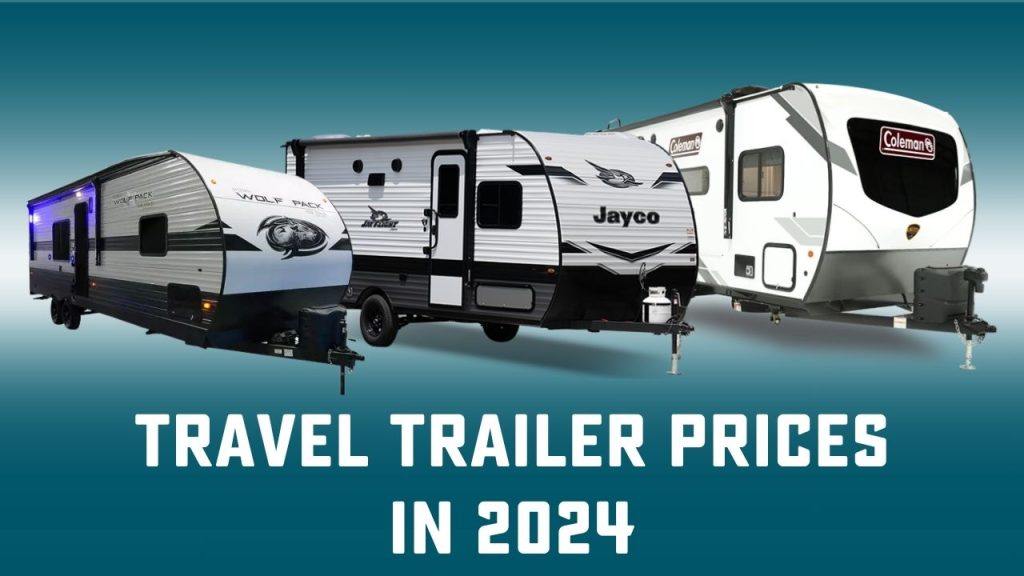
( Updated January 2024)
Trying to figure out what a travel trailer will really cost you can be overwhelming. With so many different brands and types and even different cost tiers within each category, trying to navigate travel trailer prices becomes a confusing slog.
Well, I’m here to help! I have years of experience helping RVers find the camper that fits their needs – and even wants – at a price within their budget.
I’ll help you understand what different types of travel trailers cost and what causes the price of a travel trailer to increase or decrease. With this information you can know what prices to expect so you can get out having adventures in a travel trailer that fits your budget.
TABLE OF CONTENTS
- Travel Trailer Price Ranges
- Average Travel Trailer Monthly Payment
- Travel Trailer Prices Dropping in 2024
Price Difference of Used and New Travel Trailers
- What Makes a Travel Trailer Cost More – or Less?
- What Does it Cost to Finance a Travel Trailer?
- Perks of Buying From Bish’s RV
How Much Does a Travel Trailer Cost?
@bishsrv The three tiers of travel trailers! Entry, Mid-tier, and Luxury! An article with a more detailed break down will be posted shortly! I may have missed a few points. This is just a quick explanation! #bishsrv #rv #nebraska #traveltrailer ♬ original sound – Bish’s RV
If you were shopping for a Ford F-150, you’d expect to see varying models.
An entry level Ford F-150 would be a fully functioning truck, but wouldn’t include power seats, tinted windows, four-wheel drive, or a backup camera. You’d see a sprinkling of these options in the mid-level model and all of them in the luxury model.
The same is true of travel trailers. The price tiers for campers will depend on the options in the camper.
In the world of campers and RVs, there is not a single, cut and dry, standard set of options between each level of travel trailer, though some features may set one tier apart from another.
Features like manual leveling packages vs electric or automatic, aluminum vs fiberglass siding, interior finishes and cabinet construction, A/C capability, and control board systems affect price range.
Budget Travel Trailer Price Range
A new, entry-level travel trailer usually costs between $12,000 and $40,000 .
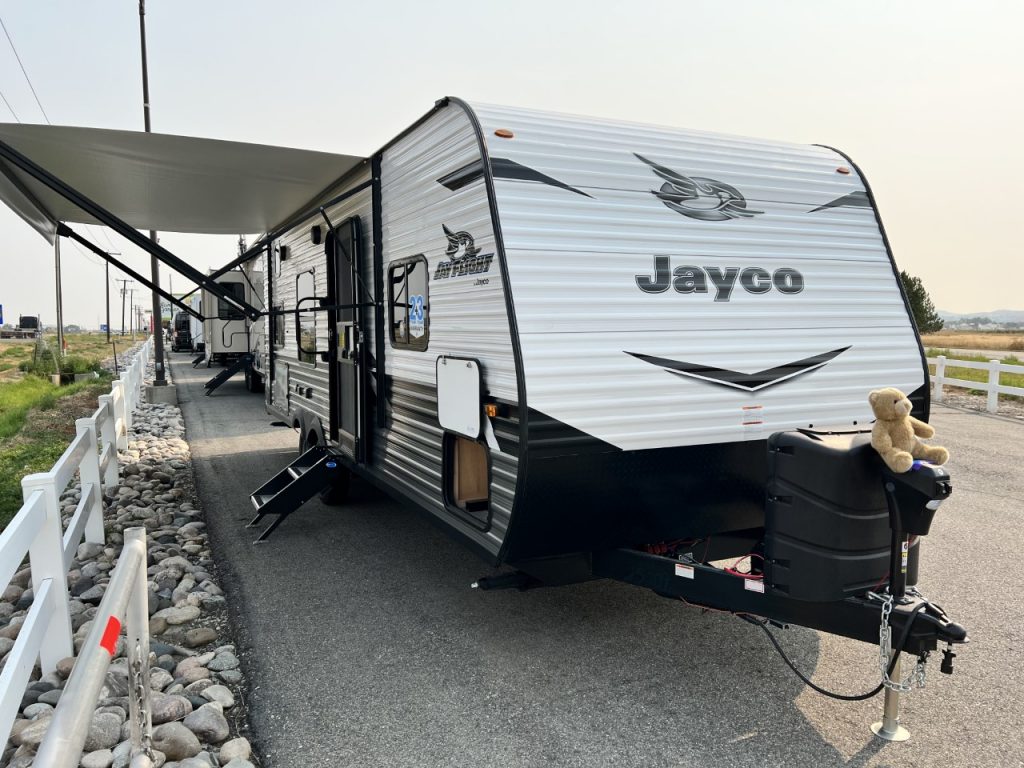
These are common features in an entry-level camper:
- Stick and tin construction (wood framed wall, aluminum siding, and batten insulation) Learn the differences between stick and tin and fiberglass RVs .
- Manual stabilizers and tongue jacks.
- Base-level interior finishes and veneer paneled cabinetry.
- Limited technology in the TVs, radio, speakers, and lighting (inside and out).
- Solar prepped, but not installed.
- Steel wheels and non-name brand tires.
How Much Does a Mid-Level Travel Trailer Cost?
New mid-level campers usually cost between $25,000 and $60,000 .
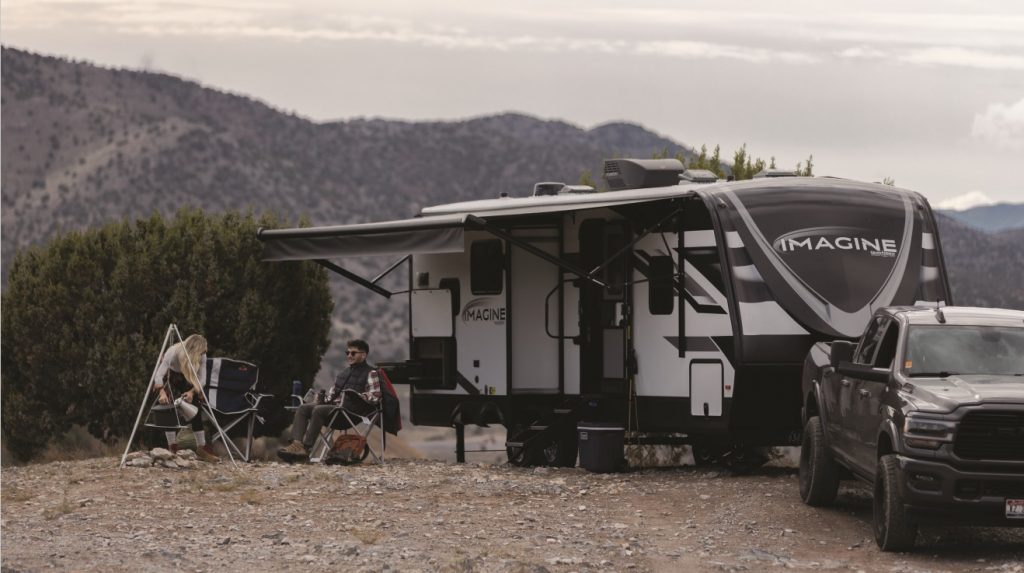
In a mid-level travel trailer you may find:
- Aluminum f rame and fiberglass exteriors
- Electric jacks
- Higher quality interior finishes and cabinetry
- Upgraded technology – TVs, radio, speakers, lighting
- Solar installed
- Exterior design with custom wheels
- Extended season packages
How Much Does a Luxury Travel Trailer Cost?
The price of a luxury travel trailer usually ranges from $50,000 to $80,000 .
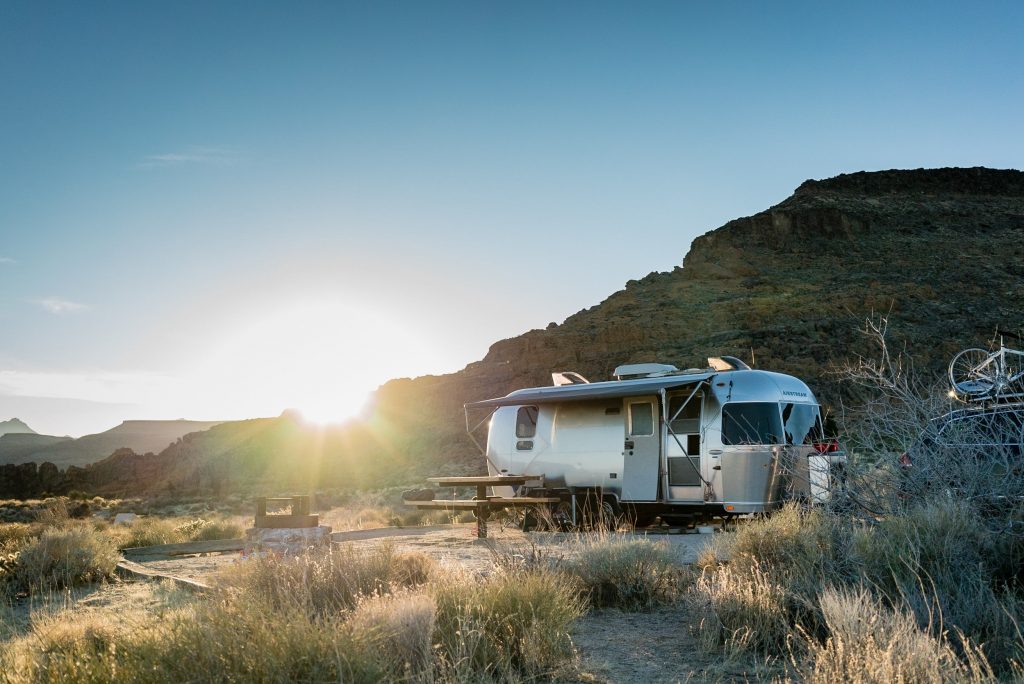
You can typically expect these features in a luxury travel trailer:
- Aluminum framing and fiberglass exteriors
- Electric stabilizer jacks and/or automatic leveling jacks
- Luxury interior finishes and cabinetry
- Top of the line technology – TVs, stereo, sound system, lighting, Bluetooth, smart phone capabilities
- Solar installed and/or possible generator or prep for a generator
- Extended season packages or four season packages
Are Travel Trailer Prices Dropping in 2024?
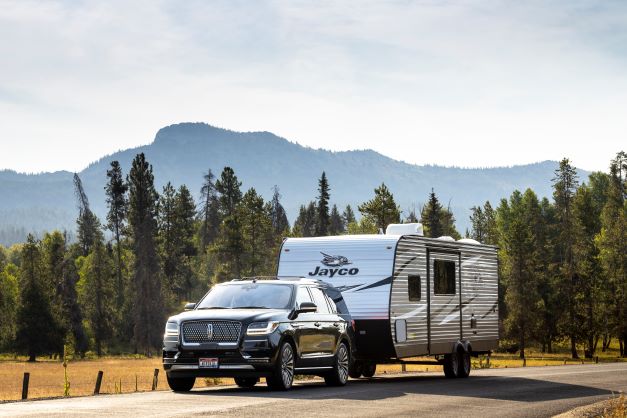
The overall price trend for travel trailers is down in 2024. Many even cost close to what they did in 2021! This is especially true for entry-level campers . But it’s not true for every type of travel trailer.
The prices for some floor plans are dropping faster than others. Single axle conventional and laminate campers and bunkhouse floor plans are priced much lower than toy hauler travel trailers and double over double bunkhouses , for example.
Some manufacturers have shuffled the amount they profit between different floor plans to make it possible for more RVers to shift from buying used to buying a new, entry-level camper.
Keep in mind: Other manufacturers have removed features to lower the price of their RVs. Check out models from previous years to make sure you’re getting the features you need in your new travel trailer.
Find out more about what you can expect in a ’23 vs ’24 travel trailer .

Bish’s released Go Play , a line of high-quality travel trailers with your budget in mind in 2023. If you’re looking for a less expensive option that doesn’t cut corners, check out Go Play RVs.

What is an Average Travel Trailer Monthly Payment
Price ranges for campers vary widely, so monthly payments will too. Average travel trailer payments range from $140 to $700 a month .
Your payment may be higher or lower depending on the price of your camper and the interest rate on your loan.
Use our payment calculator to get a better idea how much your travel trailer will cost each month depending on price, rate, and term. Or apply for financing to get more specific information.

Buying a used travel trailer is similar to buying a used vehicle of any type. Buying a used RV instead of new may make it less expensive to buy a nicer camper.
Depending on the brand, an RV will lose 5-10% of its value, just by leaving the lot, and then more depending on the RVs age and its wear and tear from that point on.
You can take advantage of this to find a used luxury travel trailer at the price of a new mid-level trailer.
Of course, when you buy a used RV you also run the risk of inheriting any complications left by the previous owners.
This could leave you with additional costs in repairs and updates. If you’re careful about the camper you buy, most of these bugs may already be worked out.
Learn more about what to look out for when buying a used RV from Josh the RV Nerd:
What Drives the Cost of a Travel Trailer Up or Down?
Options & features.
As you’ve seen above, options have a huge effect on the price of a trailer. One trailer may have 7 of the 20 available options. Another may have 12. An RV with just 5 extra options may be much more expensive, depending on what those options are.
On a Jayco Jay Flight, for example, it can cost more than $500 just to add a gas/electric fridge. Other options may add more or less, but keep in mind that different features all come at a cost.
Time of Year
When you buy a travel trailer can make a difference in it’s cost.
Travel trailers are often less expensive in the fall or winter to make room for next year’s inventory, but you may have fewer options to choose from. Find out all the pros and cons of buying at different times of the year to decide which is best for you.
You may also get a better price at an RV show, though sometimes you can get a better deal by buying right before a show. Check out our pre-show RV buying tips for more information.
You can also visit us at a Bish’s RV show !
RVs are More Expensive at Some Dealerships
Where you buy from can impact the cost of your travel trailer. Different dealerships will have different prices for the same RVs because they have different business strategies.
Some dealers cost more and some cost less, but each type of dealer has benefits and drawbacks. Knowing the pros and cons of each type will help you decide which is the best type for you.
Here are some of the different dealer types to keep in mind:
Margin RV Dealers :
Margin dealers have less inventory, but a more personalized service. You will likely be paying a premium price at these dealerships.
Volume RV Dealers :
These dealers have an approach more like Walmart or Target. They sell more RVs, which makes it so they can get them for bulk prices from the manufacturer. The dealer can then lower their prices and pass savings on to customers.
Because Volume dealers sell a lot of RVs, they also need to service a lot of RVs. Service backups could cause frustrating waits if you buy from a volume dealer.
Some volume dealers are improving and working toward better solutions for RV repair and service for their customers. Learn about your store’s service options before you buy to know what to expect.
If you buy from Bish’s RV you’ll get a free yearlong membership to BishFix . BishFix is changing RV repairs for the better by lowering wait times and helping you wherever you are.
Wholesale RV Dealers :
These dealers buy and sell at wholesale prices. Generally, these are internet dealers who are built to sell at low prices but have limited or no ability to service RVs after the sale.
Boutique RV Dealers :
Boutique dealers only sell a few brands or even just a single brand. They typically sell niche RVs like Airstream or overland RVs .
RVs are generally more expensive at a boutique dealer since they don’t buy as much inventory and there is less demand.
But, boutique dealers are more likely to be able to provide custom units and personalized service. It just comes at a price, so decide which experience you need when you buy your RV.
Why are Some Brands More or Less Expensive?
Manufacturers use different materials and put their RVs through different quality tests. Adding inspections and using high-quality materials cost manufacturers more and can make a travel trailer more expensive.
Read more on why some RV manufacturers cost more .
Paying more might get you a better quality RV, but not always. These factors can make a less expensive RV a higher-quality RV:
Top Selling Travel Trailers
Best selling travel trailers may cost less AND still have top notch quality.
Manufacturers may be able to get volume bulk discounts on the building materials for the RV because they sell so many. These discounts can drive the overall cost down.
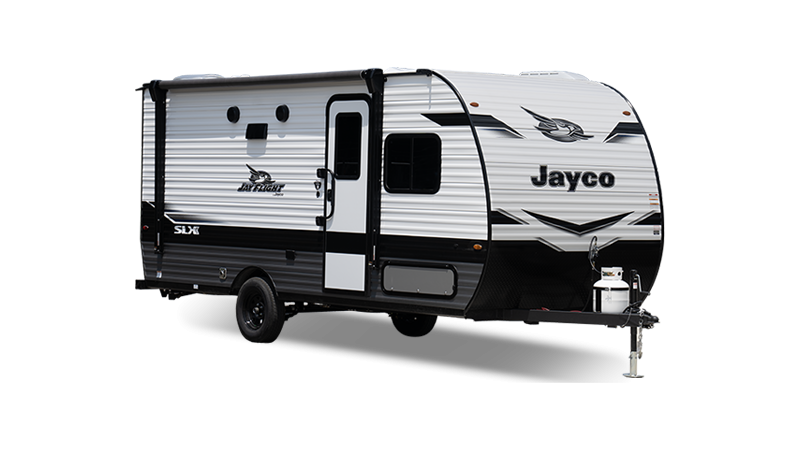
The Jayco Jay Flight campers are a good example of this. Jayco is able to manufacture so many Jay Flight RVs each year that they can buy the materials in bulk and build a high quality trailer at entry-level prices.
Without these volume discounts, manufacturers who don’t sell as many campers may actually build a lower quality trailer at a similar or higher price than the Jay Flight.
Check out a full review of the Jay Flight Travel Trailer or learn about Jayco RV Quality .
These are the 5 best-selling camper brands for the last year (as of January, 2024). Check them out if you’d like to consider a top-selling travel trailer when you buy.
- Forest River Cherokee
- Jayco Jay Flight
- Grand Design Imagine
- Forest River Salem
See the top 10 travel trailer brands
MAP Pricing
You should also be aware that some travel trailer manufacturers limit advertised prices. This pricing is referred to as MAP pricing. This means that dealerships cannot advertise below a certain price, as requested by the manufacturer.
If you contact the dealer they can usually give you a lower price than advertised.
Learn more about manufacturer pricing and how to get the best price when you shop online for an RV .
What Will I Pay to Finance a Travel Trailer?
Travel trailer loan interest rates are, on average 7.74% – 8.99% as of January, 2024. They may range from 7% – 13%, depending on overall interest rates and your individual factors.
RV loans are recreational loans. RV loans are not quite like auto or home loans. Banks are a bit more selective when it comes to lending money for a “toy.”
Your rate depends on many factors. If you buy a new vs used camper, class of RV (travel trailer, fifth wheel, or motorhome, etc), your credit score and history, your downpayment, loan length, debt-to-income ratio and even location can play into rates.
If you’re financing a new travel trailer, rather than a used one, you are almost guaranteed a better finance rate. An RV will depreciate just like a car does, so banks are more willing to give you a better rate on something that will depreciate slower than an older, used unit.

Find out more about your financing options by applying for financing:

Buying a Travel Trailer from Bish’s RV
When you buy an RV it’s important to find out what the dealer offers.

At Bish’s we believe buying an RV should be the start of your adventure – not a stressful slog. You’ll find no hidden/surprise fees, free service benefits, and a one-of-a-kind 72-hour return guarantee to make sure you can feel confident you bought the right RV .
Read all about the difference of buying from Bish’s to decide for yourself if we’re a good fit for your next RV purchase.
Bish’s Service Benefits
You’ll get these benefits when you buy an RV from Bish’s RV:
@jakebart593 MORE INFO!!! Bish’s Diamond Club Membership! Complimentary to any RV purchase. #bishsrv #bishsrvlincoln #camp #camper #campinglife #rv #rvlife #rvliving #lincolnne #lincolnnebraska #omahane #omahanebraska #letsgo ♬ Sensual Seduction – Snoop Dogg
- BishFix Access – Any RV you buy from Bish’s includes a 1 year membership to BishFix. After the first year you can extend the membership for a monthly or yearly payment.
- Free Winterizations – Bish’s has annual events where you can pull your camper through to get your free winterization. This keeps your pipes, tanks, and other components safe through the freezing temperatures of winter.
- Free Annual Inspection – With labor rates rising constantly, this is a big plus. When you are done camping for the season bring in your RV and Bish’s will do a full check on it to make sure all is well with your camper. If not, our service department will explain any concerns with you, and you can decide what to do from there.
- Parts and Accessories Discounts – For as long as you own your camper, you can take advantage of 10% off any part or accessories you need for your camper in the future.
- Labor Discounts – With this membership you receive a $30 per-hour labor rate discount off on all service repairs at participating Bish’s RV locations.
- Pre-Delivery Inspection & Walkthrough – One of Bish’s trained service technicians will do a full inspection of your camper to ensure all the major components are in working order when you buy from Bish’s RV. An RV technician will also give you a full walk-through of the RV before you leave to make sure you have a good understanding of how the RV works before taking it out to campgrounds.
Not sure Bish’s RV is right for you? We know that one dealer can’t be right for every RV buyer. We’ve put together a convenient guide to help you discover the different types of RV dealers, so you can decide which is best for you. You can also find the RV dealers RVers in your state choose the most.
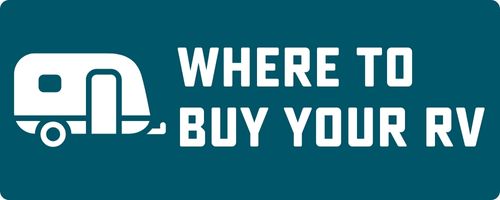
Find Your RV
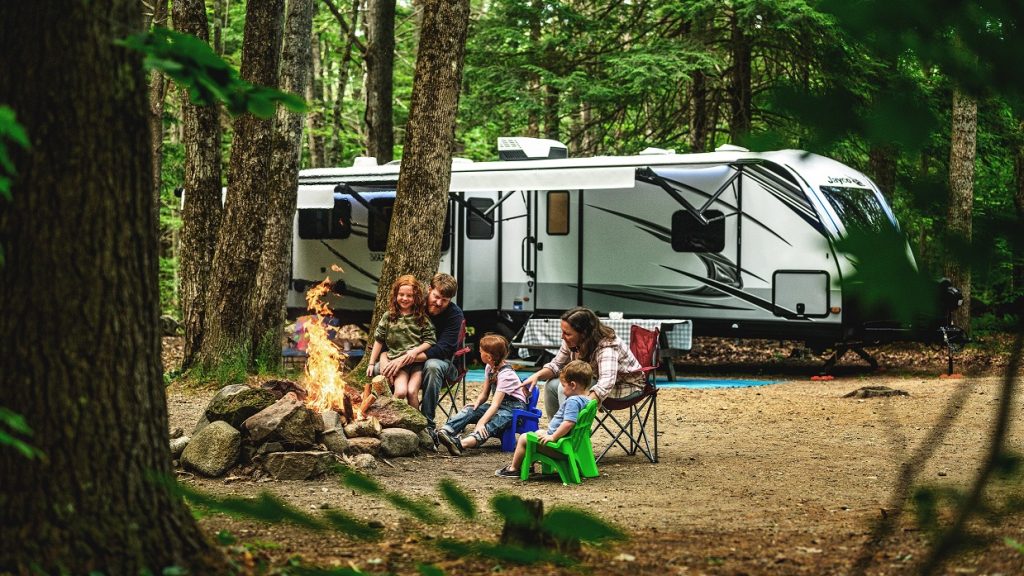
To recap, there is a lot that can change the price of a travel trailer. From tiers, brand, location, manufacturer, and even the dealer itself!
Bish’s RV wants to help you understand these differences to improve your buying experience. If you would like more information or have more questions, please let us know how we can help.
Click below to reach out to an RV Outfitter at one of Bish’s nationwide locations.

If you’re interested in looking for a travel trailer of your own, check out the travel trailers for sale at Bish’s RV.

Want to learn more? Check out these articles:
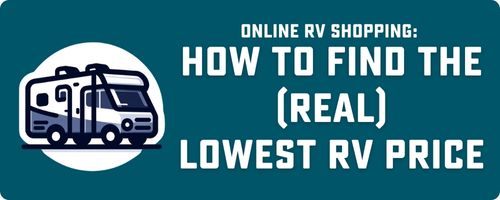
Sign up for Bish’s weekly newsletter to get RV buying tips & more right to your inbox:

JAKE BARTUNEK
Go Play RV Brand Manager
When I joined the RV industry years ago, I was blown away by the amount of information there was to know about RVs and how hard it is to find that information! My goal is to help inform you to the best of my abilities!

- Books & Merch
- Gear We Use
- National & State Parks
- Best RV Campgrounds in New Hampshire
- Best RV Campgrounds in NC Mountains
- Best Florida Beach RV Campgrounds
- South Dakota
- The Great Lakes
- Campers Swear By This Portable Device That Keeps Dogs Safe -The Best Portable Dog Fence for Camping (2024)
- Mosquitos and bugs
- Camping Clothes
- Camping Gifts
- Camping Internet
- 5 Best RV Backup Cameras for RV & Trailer
- 7 Best Screen Tents for Camping (2024)
- Best RV Campgrounds in California
- 5 Best Key West RV Parks
- 9 Best RV Campgrounds in New Jersey
- Camping Reservations
- Campground Comparisons
- Cheap or FREE RV Camping Sites
- Best RV Campground Memberships & Clubs
- Boondocking 101
- Boondocking Adventures
- RV Internet
- What Do Flamingos and Upside Down Pineapples Mean?
- Where to Find FREE or Cheap RV Sites Camping
- RV Winter Camping
- RV Show List for 2024
- 17 Best Camper Vans 2024 (New Class B RVs Available!)
Buying an RV: Seven Hidden Costs to Consider
There are many “hidden costs” in buying an rv, similar to when you buy a house and then need to also buy that couch, dining room table, lawnmower, or other appliances on top of everything else..
- 1.1 Check out seven of these costs to consider below.
- 2 Buying an RV: Taxes
- 3 Buying an RV: Insurance
- 4 Buying an RV: Maintenance
- 5 Buying an RV: Fuel
- 6 Buying an RV: Towing
- 7 Buying an RV: Campground fees
- 8 Buying an RV: Other amenities
- 9 Our RV Buying Secrets
When you are buying an RV, on top of the large ticket price, there are several “hidden costs” that can add up to significant expenses and are important to factor into your decision.
First, let's start with a little fun – the sometimes crazy reasons people sometimes have for buying an RV from a series of interviews we did with some folks we met at one of our gatherings:
Check out seven of these costs to consider below.
Buying an rv: taxes.
Depending on the state that you live in, you'll need to pay sales tax on your RV. When buying an RV costing tens of thousands or hundreds of thousands of dollars, you can't forget that depending on your state, it can be another 4, 5, 8 grand or more that you need to pay on top of the sale price.
We delve deeper into taxes in “ RV Buying Secret s”…just don't forget that they're a large expense on top of the price you pay for your RV.
Buying an RV: Insurance
The larger and more expensive the RV you own, the more you’ll have to pay for insurance. Remember that on top of a monthly RV payment (if you aren’t buying outright), you’ll also need to pay for insurance.
Buying an RV: Maintenance
Just like with insurance, the larger the RV you own, the more maintenance it will require (with more stuff, there is a higher likelihood that something breaks). If you have a gas-powered engine and are handy, you may be able to save some money around general maintenance.
However, with a diesel-powered engine, you’re likely stuck bringing it to a specialized shop.
Buying an RV: Fuel
Fuel is expensive. When looking to buy an RV, find out the average miles per gallon that vehicle has. Depending on if you’re going full-time or part-time, you can get a rough estimate of how much money you’ll spend on fuel in a month. Be sure to check out our post “ Gas vs Diesel: Seven Important Truths About RV Fuels .”
Buying an RV: Towing
If you’re planning on towing a 5th wheel or a “toad” behind your RV, do you have all the necessary equipment for towing? If you don’t, research the extra costs these items will add to your total expense. Learn more about this topic at “ Important RV Question: Towing a car with an RV .”

Buying an RV: Campground fees
Unless you’re planning on boondocking (and if you are, we definitely recommend to check out our other digital guide, The Beginner’s Guide to Boondocking ), you’ll need to budget for RV parks and campgrounds. Depending on the location and how long you’re staying for, the fees can vary from $10-$100+ per day. Again, this cost will depend on if you’re a full-timer or only RVing part-time.
Buying an RV: Other amenities
Just like when you buy a house and start needing to buy a couch, larger TV, dining room table, etc., when you buy an RV there are purchases that start to add up. The most expensive among these are things like a Wi-Fi hotspot, a dash camera and other gizmos and gadgets. Just know that when you buy an RV, you’ll also end up spending money on little things that you might not have thought of.
These all play into your decision and what works best for you. The key is to imagine how you intend to use your unit, where you want to travel, how many luxuries you want, how many people will be using the RV, and if you’re full-time, part-time or a weekend warrior.
There is an RVing ideal you’ve probably created and aspire to be but until you’ve tried it and experienced it, it might not be everything you’ve thought it to be. The #1 way to save money when buying an RV is making sure to purchase the one you’ll use and enjoy the most. And do that THE FIRST TIME.
That’ll save you from having to “right-size” later on. You’ll get more use out of a unit you love that fits your needs.
With more use, the cost of ownership drops considerably.
If you own an RV for one year: Use a $60,000 unit 10 days per year and you’re paying $6,000/day. Use that same unit 125 days per year and you’re paying $480/day. Use it 300 days per year and you’re paying $200/day.
If you own that same RV for 5 years: Use a $60,000 unit 10 days per year and you’re paying $1,200/day. Use that same unit 625 days for 5 years (125 per year) and you’re paying $96/day. Use it 300 days per year and you’re paying very little/day. But your maintenance cost and repair costs will be much higher in those later years. Whatever the math, I'm sure you get the idea here.
All of these factors play huge parts in the total cost and enjoyment of your unit. It’s best to know exactly what you want (from experience) before committing to such a large purchase.
Also, if you are thinking about getting a used RV, we recommend that you have it inspected. Check out the services if the National RV Inspectors Association at https://nrvia.org/ .
Our RV Buying Secrets
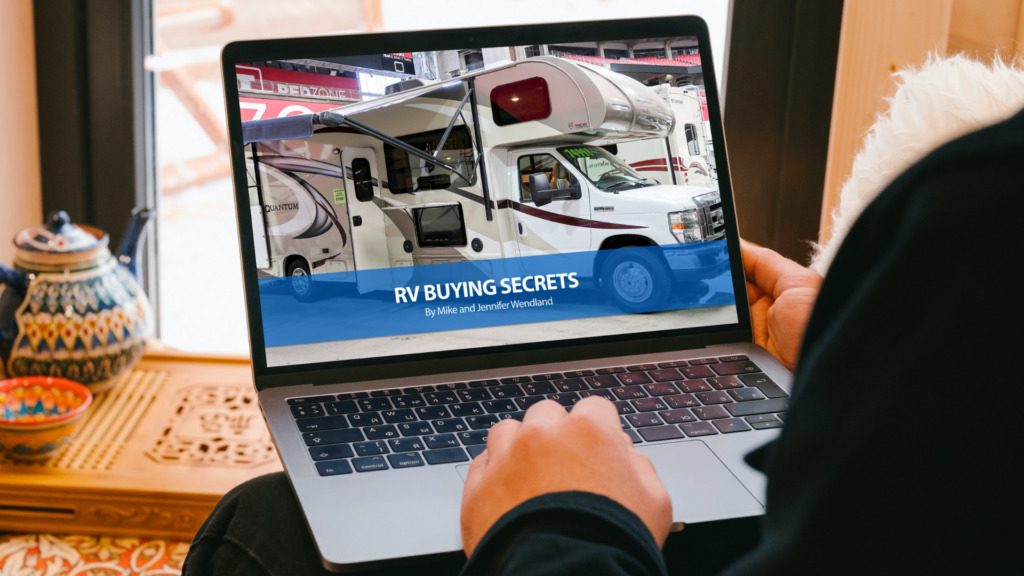
Next to your home, an RV is most likely the 2nd most expensive thing you'll ever purchase.
We get questions every day of other RVers wondering. “How do you buy a new or used RV?”
So we created a 75+-page downloadable digital guide to help you understand the nuances that come with purchasing an RV, where you can save thousands of dollars in the buying process, what the right questions are to ask dealers, what things to look out for, how to select the right unit, amenities, warranties, and so much more!
This ebook is designed to help make your purchase process as smooth as possible. And to teach you step-by-step exactly what to do so you can start your RV Lifestyle today!
Published on 2024-01-22
Mike Wendland is a multiple Emmy-award-winning Journalist, Podcaster, YouTuber, and Blogger, who has traveled with his wife, Jennifer, all over North America in an RV, sharing adventures and reviewing RV, Camping, Outdoor, Travel and Tech Gear for the past 12 years. They are leading industry experts in RV living and have written 18 travel books.
7 Responses to “Buying an RV: Seven Hidden Costs to Consider”
January 23, 2024at9:41 am , Larry Bachman said:
Most, if not all, of these expenses are known. What floored me, the First Time I purchased an RV, was the “unexpected” Fees and Charges at the time of purchase.
June 26, 2023at7:10 pm , Larry Elder said:
People often don’t realize that internet is one of the most expensive parts of an RV. You have folks running around with giant dish satellites on their roofs to Starlink costing an arm, a leg, and your firstborn child. I just got off of a call with customer service at Easy Choice Wireless and honestly, they’re going to end up being my internet provider once I start boondocking again.. I hate sounding like an ad but it’s the truth. My wife is real happy and we’ll be able to be anywhere and still facetime our lovely folks back home 🙂
April 23, 2023at7:24 am , Denise Thomas said:
We have a washer that is draining to the black water tank causing it to fill up faster, shouldn’t it be draining to the gray water tank?
April 24, 2023at9:29 am , Team RV Lifestyle said:
Hi Denise – that would be a good question for Mike and Jen’s RV Lifestyle Facebook group: https://www.facebook.com/groups/roadtreking – 175,000-plus people there helping each other with questions just like this. Happy Trails! Team RV Lifestyle
December 29, 2020at4:11 am , rachel frampton said:
My sister would like to buy an Rv trailer that she may use for her camping activities, which is why she’s also thinking of obtaining insurance. I’m glad you shared this; at least now we’re aware that she would have to pay for the sales tax. Thank you for also clarifying here that the larger it is, the more maintenance it will need.
October 12, 2020at6:41 pm , Patricia said:
I really enjoy your page and have learned so much. However, I think your ‘cost per day’ calculation above is misleading–it implies that you will only own the RV for one year. If it costs $60k and you own it for 10 years, that’s $6k per year. If you then use it for 10 days per year, that’s $600./day, not $6,000./day.
January 23, 2024at1:46 pm , Steven Miah said:
Then you sell it for say $20,000 so making ownership even cheaper
Leave a Reply Cancel reply
Your email address will not be published. Required fields are marked *
Related Posts

Affording Fulltime RV Life on Social Security in 2023

What Does an Inverter Do in an RV?

10 Funny RV T Shirts for Men & Women
- Hybrids & EVs
- Motorsports
- Marine & RVs
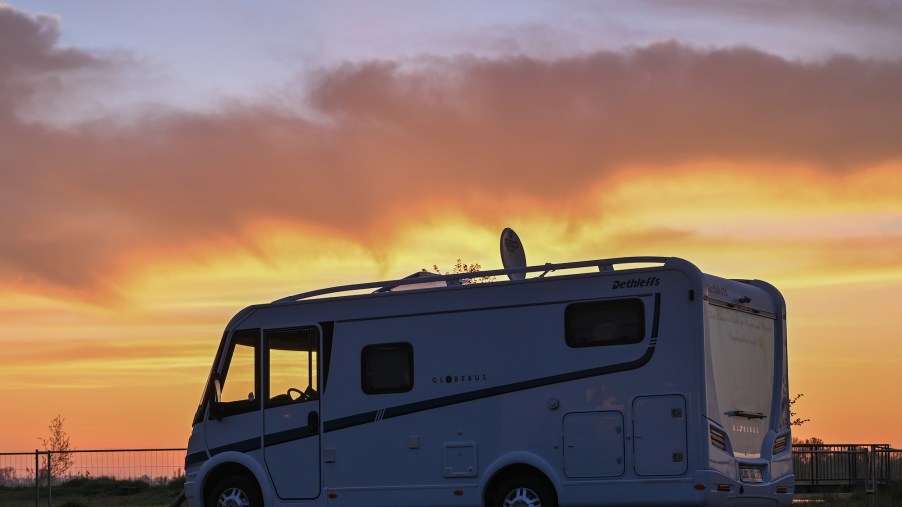
RV Ownership Costs You Should Know Before You Buy
RVs and the camper lifestyle are enjoying great popularity. One could make the argument that the pandemic spurred the revival of RVs and campers. In fact, many industry experts saw a revitalized interest in the industry before COVID-19 struck. But before you run out to purchase an RV, you should know all the costs you’re facing in owning one.
Purchasing and storing your RV
If you’re lucky, you can purchase an RV without financing. But most buyers have to finance, and you should consider the terms carefully.
RVGuide.com explains that if you put a $20,000 down payment on a travel trailer that costs $50,000, you’d be financing $30,000. With a five-year term and a 5 percent interest rate, your payments would be $566 per month. You’d pay that amount whether you’re on the road with the trailer in the summer or it’s parked for the winter.
If you got a travel trailer versus an actual RV, you’d have your tow vehicle to consider too. Your vehicle has to be able to tow the trailer and anything in it. If it can’t, you’ll have to get a smaller trailer or buy a bigger truck.
With such an investment, you’ll want to keep your RV stored out of the elements, particularly if you live in a colder climate . If you don’t have space to do that where you live, you’ll need to pay someone to store it for you. The cost for unheated storage could be as much as $75 or more per month. If you want or need heated storage, plan to pay up to $150 or more every month.
RV taxes, registration, and insurance
You must ensure your RV is insured like any other motor vehicle, KOA reports. There could be exceptions if you have a towable RV, but not for a drivable one. Either way, insurance is a good idea.
The cost depends on a few things, like the insurance company, where you live, and your driving record. Doing your homework pays off in this area, so ask questions, get estimates, and take your time finding the best deal. Expect to pay around $300 per year for a trailer and $600 for a motorized RV.
Also, expect to pay registration fees and taxes on your camper. The price varies depending upon where you live, so knowing those fees beforehand is a great idea. Many state DMVs offer that information on their websites.
Operating and maintenance costs
Fuel will be a considerable cost for your RV. Whether you buy a motorhome or a trailer, you’ll still have to pay for gas. If you love the mountains or have a large camper, you’ll get even less fuel for your buck.
It’s also a good idea to keep an eye on the news. The recent pipeline cyberattack quickly prompted gas shortages. So stay in the know to prevent getting stranded.
You’ll also need supplies for your camper, including dishes, cutlery, and disposable goods such as paper towels and toilet paper . The first time you stock your RV might seem discouragingly pricey. But after the initial cost, it won’t seem so bad.
Finally, don’t forget about maintenance. RVs and trailers require upkeep, including replacing worn parts like tires and brakes. You might encounter pest problems , too. And in traveling to the great wide open, the rough and tumble of various terrains can take a toll on your vehicle.
Book Your Perfect RV Campsite With These Apps and Websites
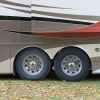
How Many Axles Does an RV Have?
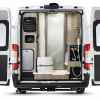
Small Camper Update: Winnebago Solis Pocket Gets Game-Changing New Features

Why Labeling RVs as ‘Good’ and ‘Bad’ Isn’t the Best Idea
Tina Pavlik
Tina Pavlik began as a contributing writer for Endgame360 in 2018. She has over 20 years of publishing experience and has written content for MotorBiscuit, Showbiz Cheat Sheet, and Sportscasting. She earned her bachelor’s degree in Computer Science at Virginia Tech.
Tina grew up surrounded by cars. Her father was an auto mechanic, her uncle owned a body shop, and all three of them dragged race for years. She covers everything from electric vehicles to van life. She has also worked as an extra in several movies and shows like Halloween (2018), The Eyes of Tammy Faye (2021), Homeland (Showtime), Banshee (Cinemax), and Vice Principals (HBO). Further, Tina works part-time as an extras casting assistant for Tona Dahlquist Casting.
- January 2024
- December 2023
- September 2023
- August 2023
- February 2023
- December 2022
- November 2022
- September 2022
- August 2022
- Accessories
- Beginner’s Guide
- Buyers Guide
- Buyers Resource
- Comparisons
- RV Cleaning
- RV Maintenance
- Travel Guides
- Uncategorized
- Entries feed
- Comments feed
- WordPress.org

RV Toilet Filling With Water? Top 3 Reasons & Fixes

Largest US RV Manufacturers & Brands They Own

Which RV Manufacturers Use Lippert Frames?
Average cost of new travel trailers: detailed analysis.

Why Do RV Dealers Have So Much Inventory On Their Lot?
When considering a new travel trailer, various factors such as brand, size, amenities, and type must be considered.
These aspects play a significant role in determining the price range, and understanding the differences can help you find the perfect travel trailer within your budget.
Additionally, seasonal and geographical price variations, financing options, and the overall cost of ownership over time can also impact the price point of your future home on wheels.
Key Takeaways
- The average cost of new travel trailers depends on factors like brand, size, and amenities.
- Seasonal and geographical price variations, as well as financing and insurance, play a role in the overall cost.
- Understanding differences in trailer types and negotiation tactics can help you get the best price for your new travel trailer.
Understanding Travel Trailer Costs
Base Price Factors
When researching the average cost of new travel trailers, I found that prices can range from as low as $10,000 to as high as $75,000, depending on various factors.
One of the most significant factors influencing the cost of a travel trailer is size. Smaller, lightweight trailers can cost less than $20,000, while larger, more luxurious models can reach upwards of $40,000 or more.
The construction quality also plays a role, as more expensive trailers typically have higher-quality materials and superior craftsmanship.
Another aspect that impacts the base price is the type of construction used. There are two common construction methods: stick and tin and fiberglass.
Travel trailers built using the stick and tin method tend to be more affordable than ones using fiberglass.
With this information, here’s a brief breakdown of travel trailer costs based on size:
- Small trailers (16 – 22 feet): $10,000 – $20,000
- Medium trailers (23 – 26 feet): $20,000 – $30,000
- Large trailers (27 – 35+ feet): $30,000 – $75,000
Add-Ons and Customization
Customizing your travel trailer can also have a significant impact on the final price.
Manufacturers offer various add-on features and upgrades, such as luxury appliances, entertainment systems, and additional living or storage spaces.
When exploring example prices of different travel trailers, cost variations were often attributed to these customizations.
Here’s a list of common add-ons and customizations that can affect the cost:
- Higher-end appliances (such as washer/dryer combos, convection ovens, or larger refrigerators)
- Upgraded cabinetry and countertops
- Solar panels or generators
- Additional sleeping or seating areas
- Expanded outdoor living spaces (such as awnings, outdoor kitchens, or external storage compartments)
- Entertainment systems (such as premium audio or large screen TVs)
When considering a new travel trailer, I suggest making a list of must-have features and add-ons so you can better understand the associated costs and prioritize your budget accordingly.
New vs. Used Travel Trailers
Depreciation Rates
Purchasing a new travel trailer can be quite exciting, but it’s important to consider the depreciation that comes with a brand new purchase.
Just like other vehicles, travel trailers experience a significant drop in value when they’re driven off the lot, which is known as depreciation. On average, a new travel trailer can lose about 20% of its value within the first year of ownership 1 , and it continues to depreciate over time.
I’ve compiled a table to give you a better idea of the depreciation rates for travel trailers over the years:
Pre-Owned Market Values
Generally, pre-owned travel trailers come at a lower price compared to their brand new counterparts.
This is because they have already experienced the biggest drop in value – the initial depreciation.
The average cost of a new travel trailer ranges from $11,000 to $40,000 2 . However, you can find used travel trailers in the market for much less, sometimes even half the price.
Here is a list of factors that can impact the market value of a pre-owned travel trailer:
- Age : The age of a travel trailer can significantly affect its value. Older trailers may have less reliable and outdated features, while newer models can offer more advanced and updated amenities.
- Condition : The overall condition of a trailer is critical when trying to determine its worth. A well-maintained travel trailer will naturally have a higher market value than a poorly maintained one.
- Brand : Different travel trailer brands have different resale values. Renowned brands with higher build quality are likely to maintain their worth better than lesser-known brands with a history of poor quality control.
- Size and Features : The size and features offered by a travel trailer can influence its resale value. Large trailers with high-end amenities usually command higher prices, while compact ones with basic features tend to be more affordable.
While I can’t provide specific pricing for every pre-owned travel trailer on the market, you can use the tips above to determine whether it’s a good deal.
Don’t forget to do thorough research and inspect any used travel trailer before purchasing.
Average Prices by Trailer Type
Pop-up campers.
My experience with pop-up campers is that they are the most budget-friendly option for those looking to start their RVing journey.
A new pop-up camper typically costs between $5,000 and $15,000, depending on the model, brand, and features included. These campers are compact, lightweight, and easy to tow, making them a popular choice for first-time RVers.
Travel Trailer
Travel trailers are available in a variety of sizes and price ranges. On average, a new 24-foot travel trailer costs approximately $23,000 but can range from as low as $11,000 to over $40,000 for high-end models.
Smaller, lightweight travel trailers are usually available for less than $20,000 . One reason for their popularity is their versatility, which allows owners to tow them with a variety of vehicles.
Fifth Wheel
Fifth wheels are larger than travel trailers and offer more living space and luxury features. Prices for new fifth-wheel campers can vary widely, with some smaller options suitable for retired couples costing around $30,000, while high-end models can exceed $100,000.
Keep in mind that these trailers require a specific hitch in the bed of a pickup truck, limiting your towing options.
Toy haulers are a unique type of travel trailer, designed to carry adventure gear such as motorcycles, ATVs, or bikes.
They typically include a garage area in the rear, which can be converted into additional living space when not in use.
Prices for a new toy hauler can range from $20,000 to $60,000 or more, depending on the size and features.
Like other types of RVs mentioned in this beginner’s guide , your budget and lifestyle preferences will play a significant role in determining which option best suits your needs.
Brand Comparison and Prices
Economy Brands
When it comes to affordable travel trailers, brands like Jayco and Gulf Stream offer great options for those looking to minimize expenses.
Jayco models start at around $11,000, while Gulf Stream trailers begin at about $9,000.
These brands are known for their basic construction and amenities, yet they still provide comfortable accommodations for road trips or weekend getaways.
Mid-Range Brands
If you’re interested in a travel trailer that balances price and quality, consider Winnebago , Grand Design , or Coachmen .
These mid-range brands offer a wide variety of models and floorplans, with prices starting in the low $20,000 range and going up to approximately $40,000. Winnebago and Coachmen compete with each other in terms of build quality, amenities and overall versatility.
Grand Design, a newer player in the market, has gained a reputation for well-crafted trailers and innovative designs.
Luxury Brands
For those seeking a high-end travel trailer experience, brands like Airstream and Rockwood offer top-of-the-line options.
These luxury brands typically come with higher price tags, but they boast superior quality, materials and craftsmanship.
Airstream’s Flying Cloud model, for example, has an MSRP range of $94,400 to $124,500. Rockwood trailers are known for their impressive array of features, customization options and use of premium materials.
As you consider the perfect travel trailer for your needs, remember that price doesn’t always equal quality. By exploring different brands and pricing tiers, you can find the perfect balance between budget and preferences.
Remember, investing in a travel trailer is about carving experiences and memories, so choose the option that suits your lifestyle the best.
Size and Amenities Impact on Price

Small Trailers
Small travel trailers are perfect for those who prefer a more compact and lightweight option. They are usually easier to maneuver and can accommodate 1-2 travelers.
Smaller models typically have fewer amenities and less interior space, which reflects in their lower pricing. You can find small travel trailers for as low as $10,000, and some even under $8,000.
The materials used in constructing RVs, such as Azdel and Luan , can also play a role in the overall cost. Choosing more cost-efficient materials can keep the price down.
Medium Trailers
Medium-sized travel trailers offer a balance between living space, amenities, and affordability. While they are still more expensive than small trailers, they can provide more features and comfort for travelers.
The average cost of a medium travel trailer is around $24,000, with various models having prices ranging from $11,000 to $40,000.
It’s important to research the components used in the RV, such as the frames by manufacturers like Lippert . A quality frame can contribute to the RV’s durability, but it can also impact the price.
Large Trailers
Large travel trailers provide the most amenities, living space, and luxurious experience. These models cater to travelers who are looking for a comfortable and fully-equipped journey.
Depending on the brand, materials, and features, the prices for large trailers can range from $40,000 to $100,000.
As you can see, the size and amenities of travel trailers greatly influence their pricing.
When choosing a travel trailer, remember to consider your needs, plans, and budget so you can make the best decision for your RV adventures.
Financing Your Travel Trailer
Loan Options
When it comes to financing your travel trailer, you have several options. Banks, credit unions, and online lenders all offer RV loans.
The type of loan you choose may depend on factors such as your credit score, the amount you need to borrow, and the term length. LendingTree is one resource you can use to compare loan rates and terms from multiple lenders.
Interest Rates
Interest rates vary depending on your credit score, term length, and the type of RV loan you choose.
For example, Compass Credit Union offers APRs as low as 4.24% for 48-month loans for new RVs, while a 180-month loan for a new RV has a starting rate of 7.24%.
Remember that borrowers with credit scores above 720 often receive slightly lower rates.
Long-Term Costs
It’s essential to consider the long-term costs of financing your travel trailer. A longer loan term might result in lower monthly payments, but you could end up paying more in interest over the life of the loan.
To estimate your monthly payment and the total cost of your loan, you can use an RV loan calculator . Also, think about other expenses such as insurance, maintenance, and campground fees, which can add up over time.
When selecting a loan, I encourage you to explore all options and pick the one that best fits your financial needs.
While the purchase price of a travel trailer can range from $11,000 to $40,000 or more, with careful planning and smart financing, you can enjoy years of comfortable and cost-effective travel.
Insurance and Registration Fees
Insurance Costs
Insurance for travel trailers can vary greatly depending on different factors, such as the value of the trailer, where it’s registered, and the level of coverage chosen.
On average, RV insurance costs between $125 and $1,000 per year, but some policies can be found for as low as $125 per year for limited coverage in some cases.
When shopping around for insurance, it’s essential to compare quotes from multiple providers and choose the policy that’s right for your specific situation.
This will ensure you’re not overpaying while also getting the coverage you need.
Registration and Taxes
In addition to insurance, there are other costs to consider when purchasing a new travel trailer, such as registration fees and taxes. The process of registering a travel trailer can be complex, with different rules and regulations depending on the state where it’s registered.
The fees for registration and taxes can vary widely based on the state, the trailer’s value, and its weight. As an example, some states charge a flat rate for registration, while others base the fee on the value, age, or weight of the vehicle.
For a more accurate estimate of how much these fees might cost in your area, consult the DMV car sales tax and tags calculator provided by your local Department of Motor Vehicles.
When living full-time in an RV, you also need to consider your address.
It’s crucial to establish a proper domicile to be able to receive mail and handle other legal matters related to your residence. This can also play a role in determining your insurance and registration fees.
By considering all these factors, you should be able to estimate the average cost of insurance and registration for your new travel trailer and make a well-informed decision.
Seasonal and Geographical Price Variations
Off-season deals.
In my experience, purchasing a travel trailer can be more cost-effective during off-season times.
Since the demand for RVs typically decreases once the peak travel season is over, dealerships may offer discounts or other incentives to make room for newer models.
I suggest looking for deals starting in the fall and continuing throughout the winter months.
It’s important to keep an eye out for price fluctuations and adjust your search accordingly. This strategy is not only mentioned in various articles, but also by experts who have experience in timing an RV purchase right .
Regional Pricing Differences
It’s worth noting that geographical location can also impact the average cost of a new travel trailer.
Prices tend to vary depending on factors such as local market trends, regional taxes, and transportation costs.
For instance, regions with a higher cost of living may result in higher prices for travel trailers. Additionally, areas with a prevalence of RV dealerships could offer more competitive pricing due to an increased supply and competition among sellers.
When considering where to buy your RV, it would be wise to research the regional pricing differences and potentially expand your search to nearby states or cities to find better deals.
In some cases, it might be more affordable to travel a bit further to make your purchase and still save money overall.
By understanding seasonal and geographical price variations, you can make informed decisions when looking to buy a new travel trailer, ultimately maximizing your budget and ensuring you get the best possible deal for your needs.
Cost of Ownership Over Time
Maintenance.
Owning a new travel trailer comes with various maintenance expenses that need to be considered. Regular service appointments are crucial in ensuring the trailer stays in good condition and provides a safe traveling experience.
The Cost of RV Ownership: Complete Expense Analysis provides an in-depth look at some of the potential maintenance costs associated with owning an RV.
I can learn from this analysis that some expenses include tire replacements, brake inspections, and roof maintenance.
Apart from regular maintenance, travel trailers also require routine upkeep to keep them functional and comfortable. Upkeep costs may cover things like cleaning supplies, replacement of worn-out items such as mattresses, and small repairs.
I also need to think about protecting the interior of my travel trailer, which may involve tinting the windows. Tinting can be both practical and aesthetic, offering benefits such as shielding the interior from sun damage.
The cost of tinting RV windows varies depending on factors like the size and type of the vehicle.
Resale Value
When evaluating the overall cost of owning a travel trailer, it’s wise to consider resale value as well. The depreciation rate of the trailer will affect the return I may get if I decide to sell it.
Travel trailers tend to depreciate in value just like any other vehicle, and many factors can impact their resale value.
The make, model, and condition of the trailer play significant roles, as well as the market demand for specific types of trailers.
By keeping my travel trailer well-maintained and up-to-date, I can help maintain its resale value and minimize the overall cost of RV ownership over time.
Negotiation Tactics for Best Prices
I’m going to share some negotiation tips to get the best deals on new travel trailers. With proper knowledge, you’ll be able to save money and enjoy your new RV without worrying about overpaying.
We will cover negotiating with dealers and tips for buying from private sellers.
Dealer Negotiations
When buying a travel trailer from a dealership, consider the following:
- Trade-in : If you have a trade-in, it can lower the overall cost of the travel trailer. Dealerships may be more willing to negotiate prices if you have a trade-in to offer. However, make sure to research your trade-in’s value so you don’t get low-balled.
- Financing : Some dealerships may offer promotional rates, incentives, or cash discounts if you finance through them . Keep in mind that paying cash doesn’t always guarantee a better deal 1 .
- Comparison Shop : Visit several dealerships and compare prices, models, and features to get a better understanding of the market value of travel trailers. This can strengthen your bargaining position. Be prepared to walk away if the dealer doesn’t meet your desired price.
- Ask Questions : Don’t be afraid to ask questions during the negotiation process 2 . Inquire about warranties, maintenance, and any other pertinent information to make an informed decision.
Private Seller Tips
If you’re buying from a private seller, keep these tips in mind:
- Do Your Research : Have a clear understanding of the make, model, and features of the travel trailer you’re interested in, as well as its market value. Compare prices of similar models to gauge whether the asking price is reasonable.
- Inspect Thoroughly : When considering a privately-owned trailer, it’s crucial to inspect it meticulously. Look for any signs of damage, rust, or wear and tear. Ask the seller about the maintenance history and any past issues or accidents 3 .
- Negotiate : Be upfront with your expectations and the price you’re willing to pay. Private sellers, unlike dealerships, may not have the same profit margins, but they still might be more flexible on the price.
- Payment Method : Determine your preferred payment method ahead of time and communicate this to the seller. Whether it’s cash, wire transfer, or a personal check, make sure you both agree on the terms before closing the deal.
Keep these tips in mind as you shop around for a new travel trailer. With the right negotiation strategies, you’re sure to find the perfect new RV at a great price.

Exploring the Existence of Airstream 5th Wheels

Airstream Basecamp Review: Is It the Perfect Couple’s Getaway Camper?

Fifth Wheel Etymology: The History Behind the Name

13 Compelling Reasons to Consider Camper Trailer 1st

13 Essential Tips Before Buying a Pop-Up Tent Trailers

How to Score a Great Deal on a Travel Trailer – Insider Tips

- Account Settings
The Hidden Costs of RV Ownership
Outside of your home (and maybe your truck), an RV might just be the biggest financial commitment of your life. Before you head to your local dealer to sign your name on the dotted line, you need to consider the total cost of RV ownership – and this includes a few hidden costs you may not have thought of.
Once you do the math, you may decide it would be easier and more cost effective to simply hit the road in the family car and stay in a hotel .
Keep in mind that most of these costs will vary greatly depending what you buy – whether it be a $10,000 folding trailer or a $300,000 Class A motorhome.
Monthly Loan Payment
If you are lucky enough to have money on hand to buy your RV outright, monthly payments won’t be a concern for you. But for most of us that is simply not the case. For sake of argument, let’s say you’ve purchased a $50,000 travel trailer with $20,000 down, leaving you with a $30,000 loan. Assuming a 5% interest rate and a five-year term, you’ve got a $566 nut to cover every single month – even while it’s sitting in storage somewhere during the winter months. That’s almost $7,000 per year in just loan payments, though it’s just the beginning of your total costs of ownership.
Speaking of storage, if you happen to live in a colder climate, you’ll want to keep your RV covered and clear of snow during winter months. If you don’t have room to safely store an RV on your property, you need to pay somebody to do that for you. This could cost you $75 or more per month for unheated indoor storage or $150+ per month for heated storage.
You can’t have an RV without insurance and that is another cost to consider. If you bundle your RV with your home and auto insurance, you are looking at something in the neighborhood of $300 annually for a trailer or $600 or so for a motorized motorhome.
Tow Vehicle
When buying a travel trailer or fifth wheel, you need to carefully consider your tow vehicle. You need to make sure your tow vehicle can handle the weight of the trailer and whatever you plan to keep inside of it. If your current truck or SUV can’t handle a 30-foot trailer, you either have to get a smaller trailer or a larger truck. If it’s the latter, that’s a lot of extra cost for what may not amount to more than a few road trips per year. If it’s the former, then you are sacrificing comfort on your family vacation.
I don’t know about you, but I don’t much care for the cost at the pump for my weekly fill-up to support my daily commute. But if you are hauling around a big trailer or fifth wheel, you are going to burn a lot more fuel. And things don’t get any better if you buy a motorhome instead. Drive your motorhome or haul a big trailer through the mountains and you can actually watch your fuel level drop. This may induce visions of dollar signs flying out of your wallet as the university fund for your children starts to shrink. Maybe they’ll be happy in with an online school?
Maintenance
You know how every year lots of little things need fixing in your house? Now imagine what would happen if you hooked your house up to a truck and drove it down the highway at 100 kph, followed by a trip down a bumpy gravel road to a campground. RVs need more maintenance than you probably think. Brakes need fixing, tires need replacing, furry critters like to chew up wiring and using insulation for nests. And because RVs get bumped and jostled around more than a house, walls develop cracks and cupboard doors come loose. And the cost is not just money – it’s time. Your honey-do list will grow exponentially if you own an RV.
Before you ever go on your first road trip with your RV, you need to stock it up. Everything from dishes to kitchen tools to linen to the pantry needs to be considered. And I promise you, you will forget something important the first couple of times you take your RV out. The initial cost is considerable.
Is it Worth It?
With all of these costs in mind, RV ownership may not be for you. When you consider the total cost of RV ownership, you could quite easily spend several weeks every year staying in nice hotels , conveniently located anywhere your travels may take you, and still come out way ahead. That money can be used to eat at great restaurants, buying the nicer bottle of wine at dinner, or going on more interesting adventures. And maybe your kids will still be able to go to the university they want.
Are you ready to plan a vacation instead of a trip to the bank to discuss an RV purchase?
Popular Article
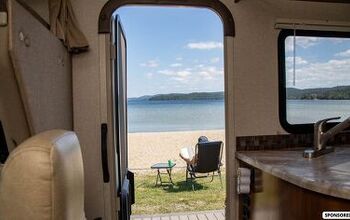
Discovering Ontario's Beaches by RV
You may also be interested in.

Six Secrets to Hosting the Ultimate RV Tailgate Party
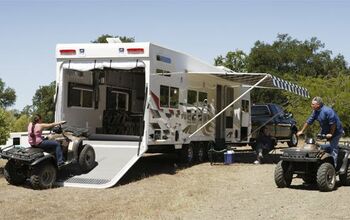
5 Best Places To Take Your Toy Hauler and Your Off-Road Toys
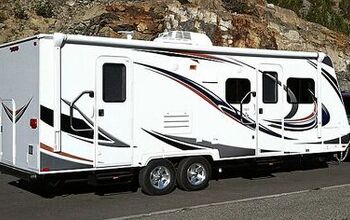
Five Maintenance Tips for Your RV

Staying Fit in Your RV
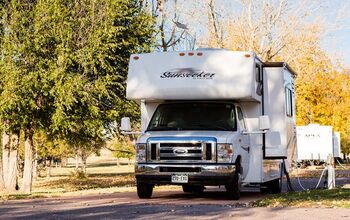
Prepping For the Weekend RV Getaway
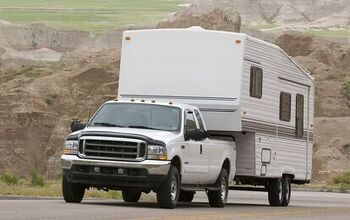
How To Tow Your Fifth Wheel
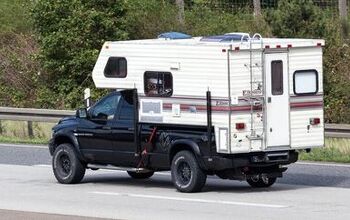
How To Pick the Right Truck Camper
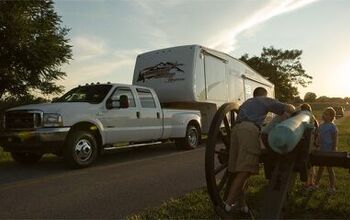
Five Best Trucks For Towing Your RV

How to Buy a Used Motorhome
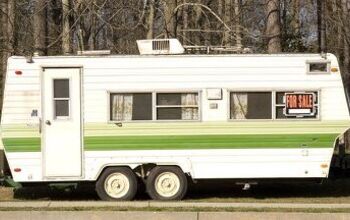
Should You Buy a Used RV?

Keep Your RV Smelling Like New
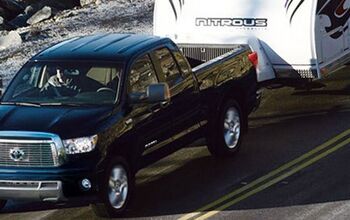
How to Pick the Right Tow Vehicle
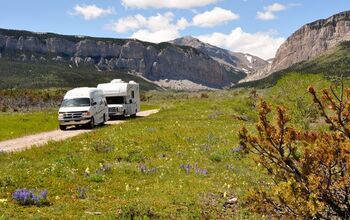
How to Find the Best RV for the Money
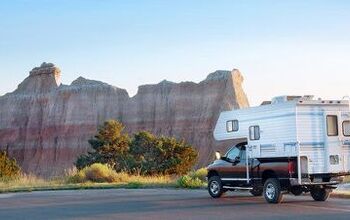
Amazing Last Minute RV Destinations
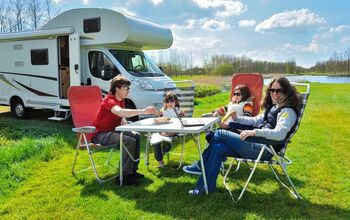
16 RV Essentials for Setting Up Your New Trailer or Motorhome
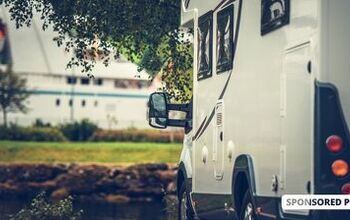
10 Reasons to Never Own an RV
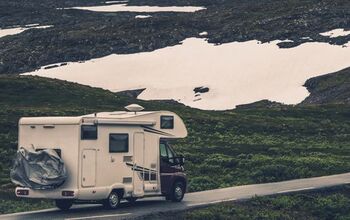
How To Maintain Your RV Furnace
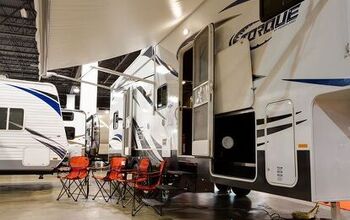
Five Tips for Going to an RV Show

IMAGES
VIDEO
COMMENTS
It is easy to have your costs of ownership cost you several thousand over the first year you buy your trailer, but you should expect costs to decrease as you obtain the needed accessories. Lastly, storage is a factor in the cost to own a travel trailer. If you store your trailer on your property it can be free, but storage can range from $20 ...
If you finance it for 5 years, you will pay $679.36. In the first scenario, your RV will cost you a total of $51,244.20. In the second, you will pay $40,761.60. You'll pay $10,482.60 more if you choose the 15-year payment option, but doing so will also reduce your monthly payment by $394.67.
Let's break down the average cost to buy a new and used travel trailer, how much a trailer rental typically costs, plus cover the main (and hidden) costs of RV ownership. A travel trailer typically costs between $10,000 for a used trailer to around $75,000 for a brand new model.
So to recap, the depreciation on our first RV was $25,000 over 45 months of ownership, or an average of $556 a month. The depreciation on our second RV was much lower. By selling in very hot RVing market conditions, we sold it for $49K, with a net depreciation of about $5,500, or $196 /month, over 28 months.
Initial Purchase Cost. Travel trailer prices are influenced by their dimensions, manufacturer, age, and attributes. New units are available in a spectrum from $10,000 to upwards of $100,000. Alternatively, pre-owned models are on the more affordable end of the spectrum.
RV ownership includes costs beyond the purchase of your travel trailer or home on wheels. ... Towables consist of travel trailers, 5th wheel trailers, destination and expandable trailers, and toy haulers. Based on our proprietary data, we typically see that new travel trailers cost, on average, $33,000, while fifth wheels are around $75,000. ...
These are suitable for towing trailers, cars or boats behind your RV, but those who are serious about the pastime often opt for an aftermarket hitch. Expect to pay anywhere from $100 to $1,000 for a standard hitch. Fifth wheel hitches are mounted to the bed of a truck and are considerably more expensive.
Total out-of-pocket cost: With our trade-in, the Highlander cost us $4,071.88, which is inclusive of taxes and licensing fees. For this particular cost, we were very much on the low end of the spectrum- most new midsize SUVs ring in, on average, at around $41,000, with new pickup trucks costing an average of $51,000.
Also includes an overview of the extra costs of RV ownership such as financing. Simple guide highlighting the different RV costs using 15 popular RV types. Also includes an overview of the extra costs of RV ownership such as financing. ... Travel trailer (tiny or micro) nüCamp TAB 320 S. MSRP: $31,769+ Monthly payment: $295.09 Average nightly ...
Here are the top things to take into account when contemplating RV ownership. The Financial Costs of Owning an RV. There are diverse financing options available when it comes to purchasing an RV. The Cost of the Actual RV. You can spend anywhere from $1,000 on a used pop-up camper to $300,000 (or more) on a brand new motorhome. While it may be ...
List of the Cons of Owning a Travel Trailer. 1. Cost can still be a significant factor for travel trailer ownership. Even though you can find affordable travel trailers on the market today, a desire to have a premium experience will result in a significant expense. Fifth-wheel trailers that are top-of-the-line products easily sell for more than ...
The RV Ownership Cost Calculator. Obviously, your first step in the RV ownership cost calculator is buying the RV. The costs vary wildly - you could spend about $50,000 on a base model Class C motor home or anywhere around $200,000 on a Class A motor home with amenities galore. You'll get much better deals on used RVs, but the peace of mind ...
The typical cost range to purchase a recreational vehicle is between $10,000 and $400,000. The main factors affecting RV cost include the class, size, floor plan, and manufacturer of the RV; the ...
Budget Travel Trailer Price Range. A new, entry-level travel trailer usually costs between $12,000 and $40,000. These are common features in an entry-level camper: Stick and tin construction (wood framed wall, aluminum siding, and batten insulation) Learn the differences between stick and tin and fiberglass RVs.
With more use, the cost of ownership drops considerably. If you own an RV for one year: Use a $60,000 unit 10 days per year and you're paying $6,000/day. Use that same unit 125 days per year and you're paying $480/day. Use it 300 days per year and you're paying $200/day.
I found a wide range of prices, but in general, here are my findings. A new travel trailer typically costs between $11,000 and $35,000. An average 24′ travel trailer with decent construction will cost approximately $23,000.
8. Owning an RV will totally change your travel lifestyle — and you'll probably do more of it as a result. When someone is new to owning an RV, they aren't necessarily — or even usually — new travelers. Chances are you're attracted to this lifestyle because you're a bit of a wandering soul.
RVGuide.com explains that if you put a $20,000 down payment on a travel trailer that costs $50,000, you'd be financing $30,000. With a five-year term and a 5 percent interest rate, your payments would be $566 per month. You'd pay that amount whether you're on the road with the trailer in the summer or it's parked for the winter.
The average cost of a new travel trailer ranges from $11,000 to $40,000 2. However, you can find used travel trailers in the market for much less, sometimes even half the price. Here is a list of factors that can impact the market value of a pre-owned travel trailer: Age: The age of a travel trailer can significantly affect its value.
This could cost you $75 or more per month for unheated indoor storage or $150+ per month for heated storage. Insurance. You can't have an RV without insurance and that is another cost to consider. If you bundle your RV with your home and auto insurance, you are looking at something in the neighborhood of $300 annually for a trailer or $600 or ...
The first, and most noticeable, cost of RV ownership is the initial purchase price. Whether you're eyeing a brand-new, mid-range motor home or a pre-owned camper, it's a substantial investment. As per The Hitch House, a new motor home will cost around $150,000. Conversely, a used camper or small travel trailer could cost about $15,000 ...
Cost of ownership are expenses that you will have to bear just by owning an RV. That means you will be incurring these costs